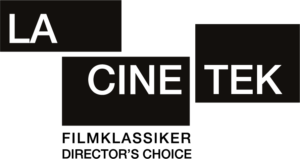Encounter RWF
A Film Education Project on the Work and Collection of Rainer Werner Fassbinder
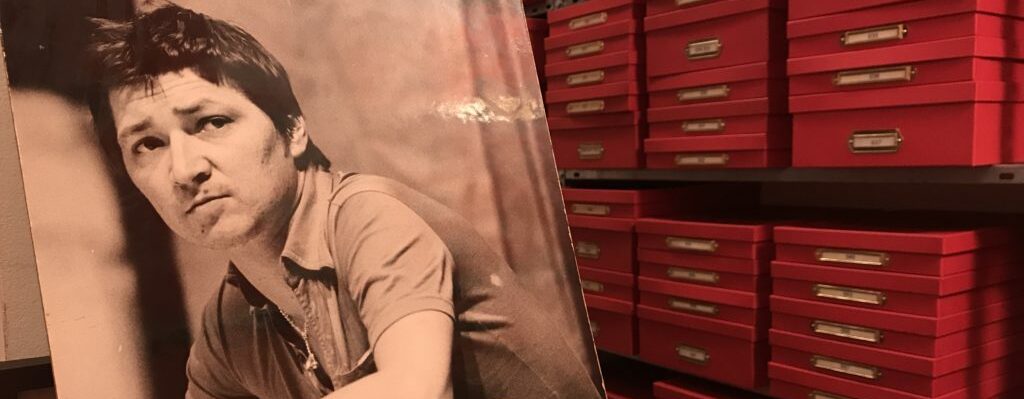
Duration
2022-2024
Project Lead
Alejandro Bachmann, Christine Kopf
Project Manager
Niels Deimel
Contact
Christine Kopf
kopf@dff.film
The project publication “Encounter RWF. Fassbinder Archive Education” is available at the DFF online shop
The table of contents and the introduction are available for download here.
Editors: Alejandro Bachmann, Niels Deimel, Christine Kopf
Authors: Alejandro Bachmann, Isabelle Louise Bastian, Anna Bell, Nathalie Bourgeois, Michaël Dacheux, Niels Deimel, Barbara Dierksen, Uwe Dierksen, Martin Ganguly, Alex Gerbaulet, Amina Handke, Stefan Huber, Christine Kopf, Jan Kühnemund, Jyoti Mistry, Claire Nazikian, Daniela Nicklisch, Hans-Peter Reichmann, Stefanie Schlüter, Brigitta Wolf, Ming Wong, Manuel Zahn
Publisher: DFF – Deutsches Filminstitut und Filmmuseum e.V.
Format: Paperback, 206 pages; 28 cm x 24 cm
Languages: German, English
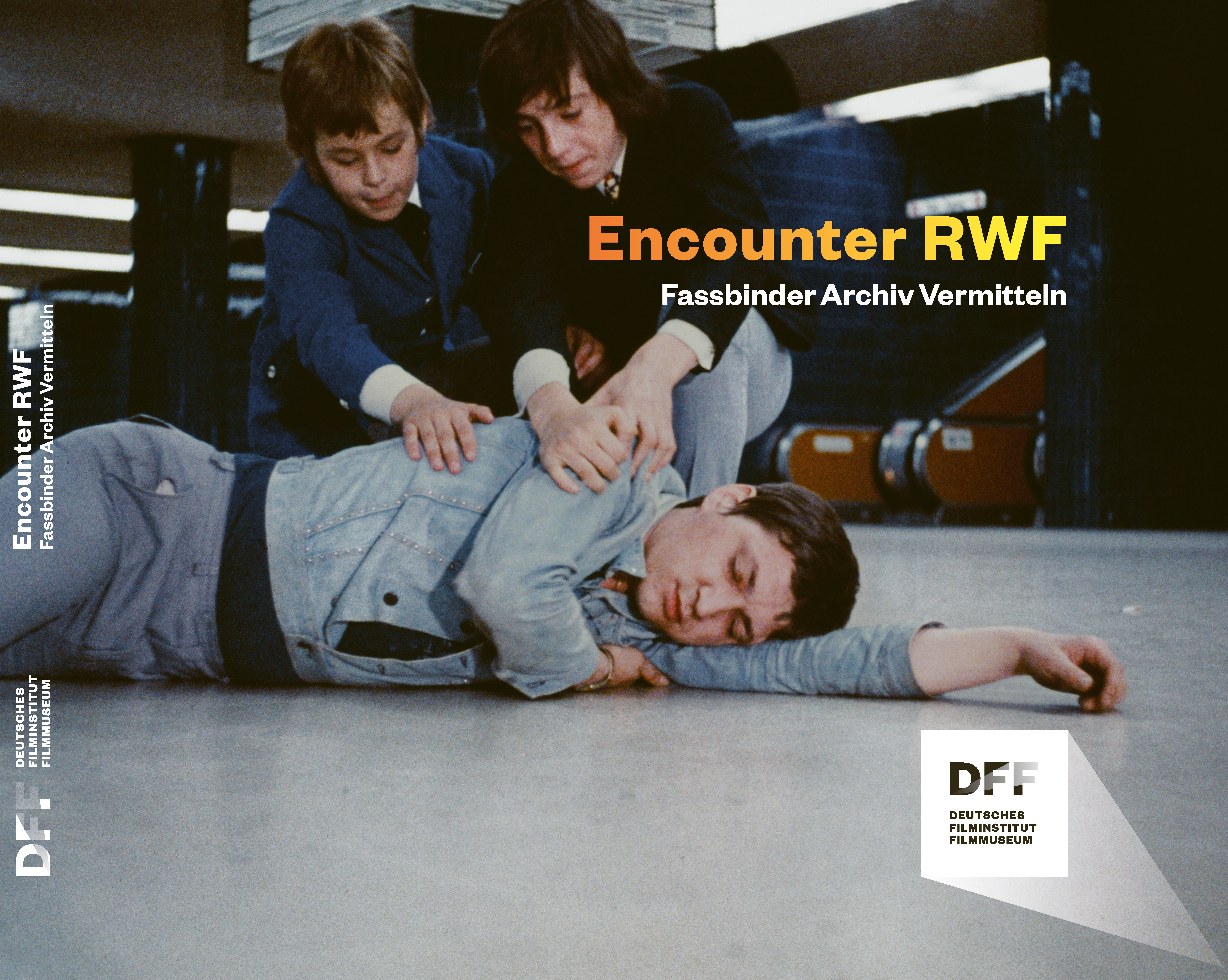
The Project
Rainer Werner Fassbinder, who died prematurely in 1982 at the age of 37, is considered one of the outstanding representatives of New German Cinema, having made more than 40 films in the 1960s, 1970s and early 1980s. The director’s extensive literary estate, which came under the DFF’s care in 2018, is a treasure of recent German film history to be unearthed from many perspectives. The participants in the DFF project “Encounter RWF / Discover RWF” are dedicated to this task in the DFF Fassbinder Center, which is housed in the DFF Archive and Study Center.
The aim of the project “Encounter RWF / Discover RWF” is to find out which formats can be used to make Fassbinder’s films more accessible to today’s younger generation. Six teams of film educators and artists in five European cities (Frankfurt, Berlin, Vienna, Paris and Zurich) will work with schoolchildren, youth groups and students to explore Fassbinder’s work in the context of relevant social issues. For this purpose, a variety of formats are developed that offer an innovative and artistic approach to the collection and its auratic objects.
All six groups’ research is based on an intensive study of the various objects related to Fassbinder’s work during several days at the DFF’s archive and study center in Frankfurt. They will receive extensive support from the Fassbinder experts at the DFF, Senior Curator Hans-Peter Reichmann and Collection Curator Isabelle Bastian. Based on the archival research, the teams will develop their individual educational formats and projects. A publication, to be published in February 2024, will bring together all the results of the project and present them in a creative way.
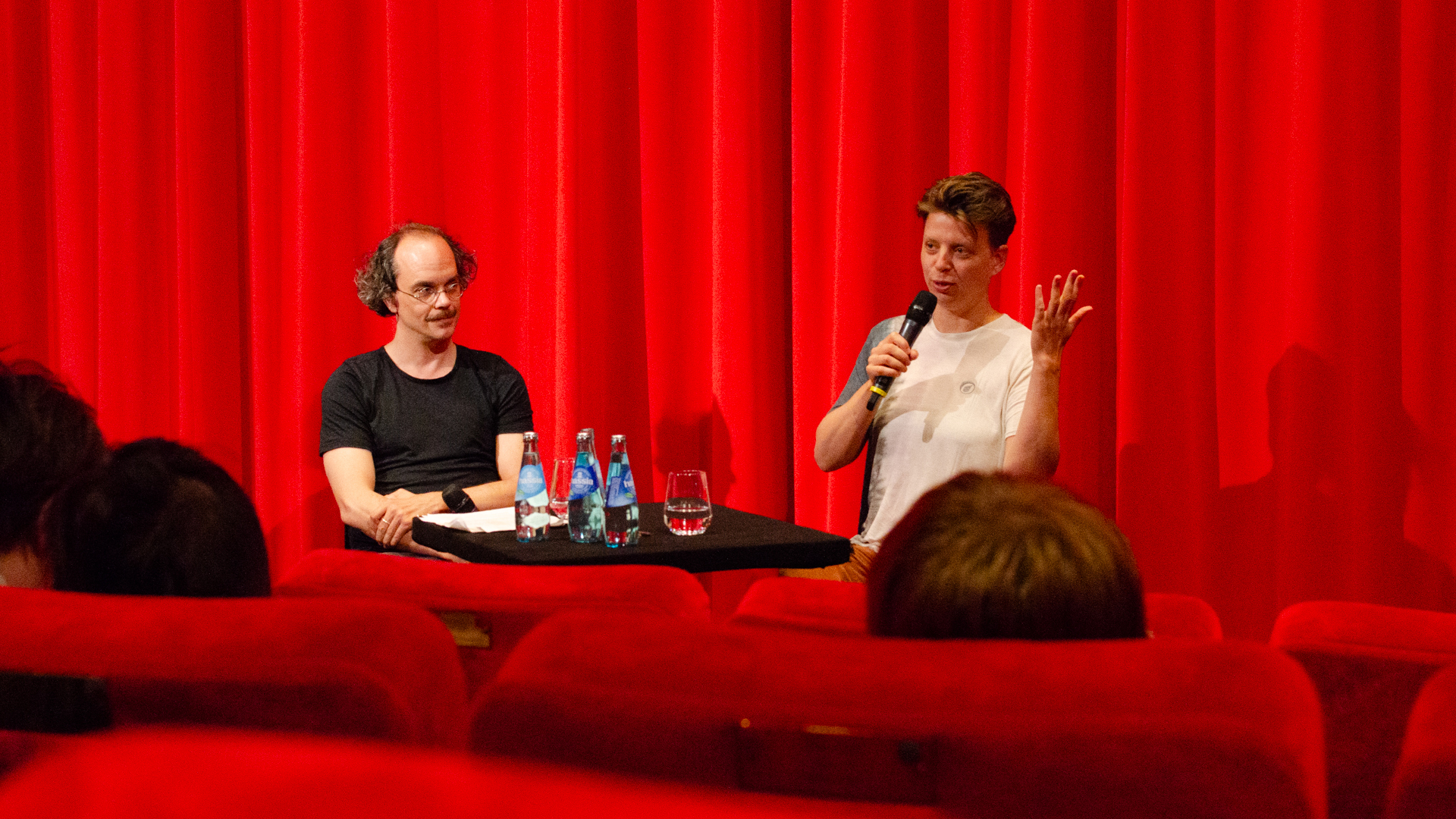
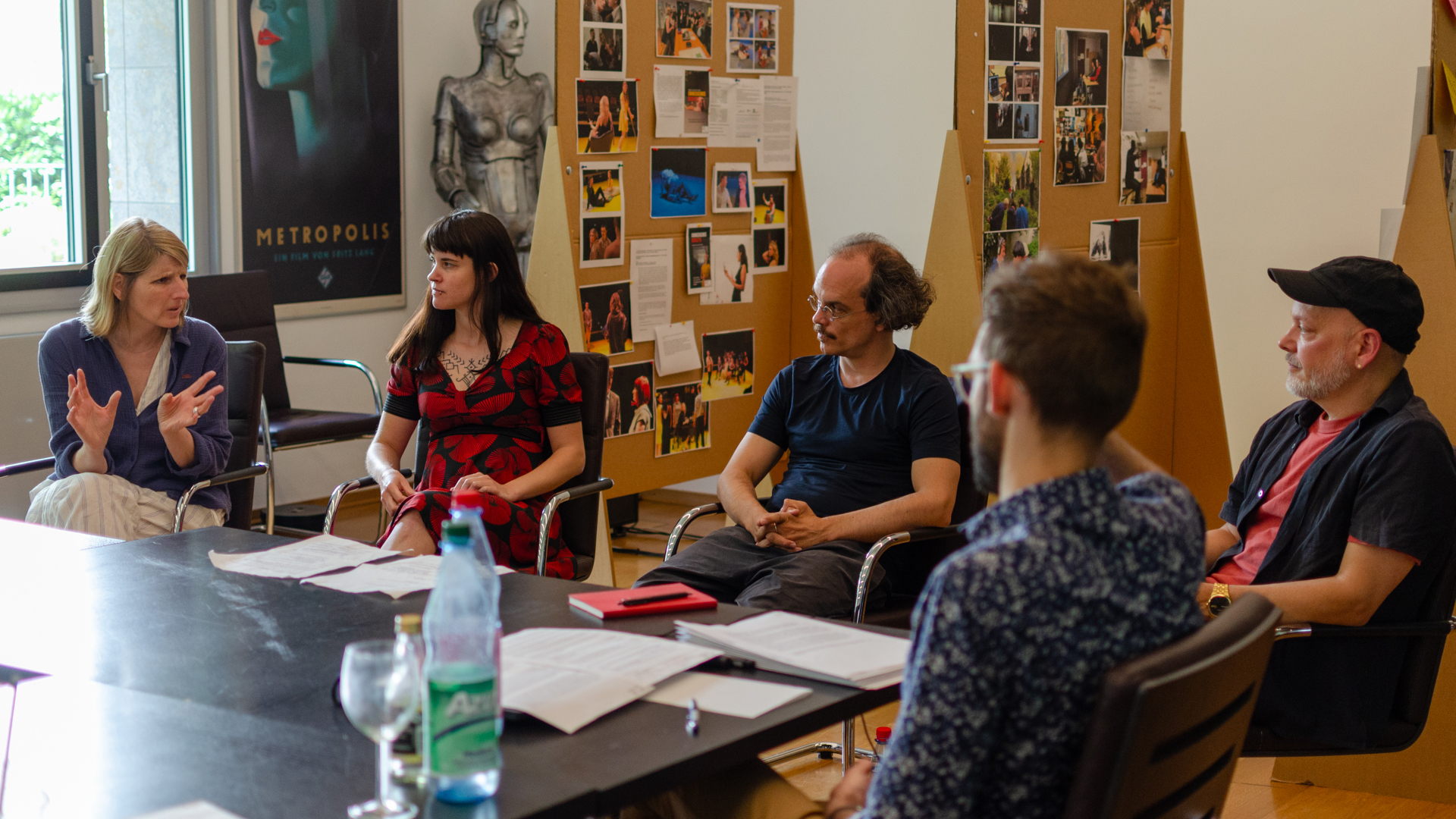
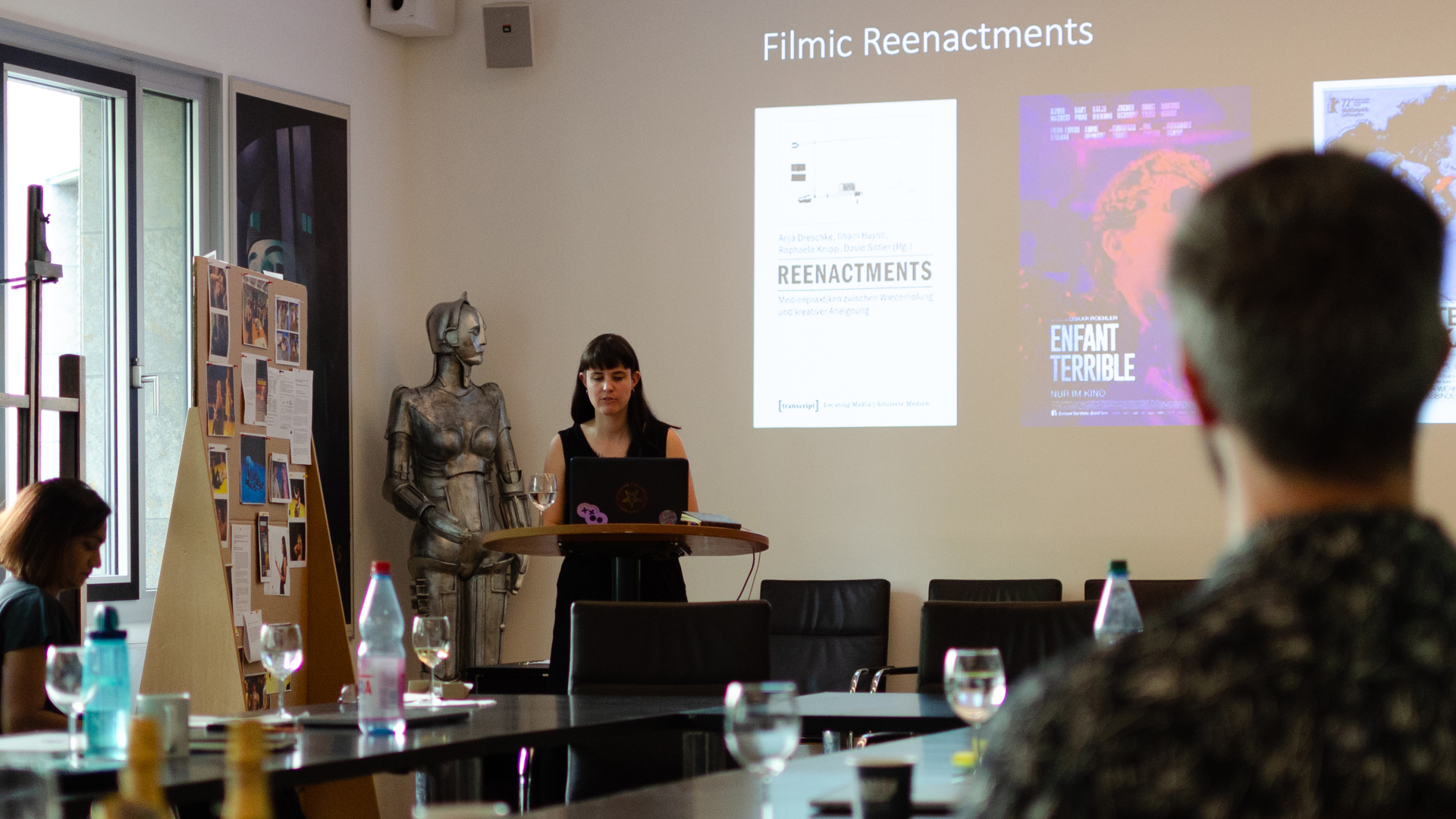
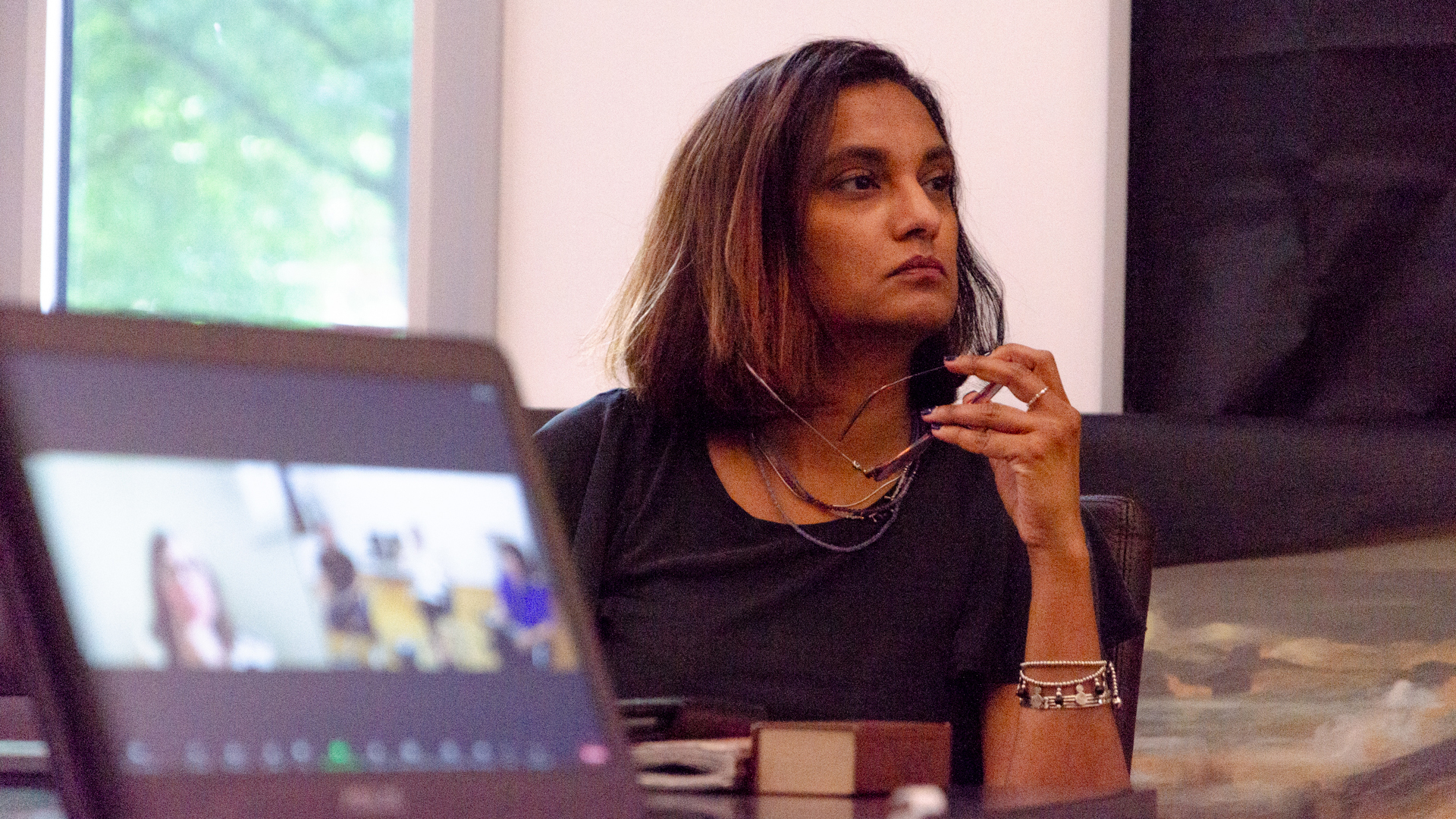
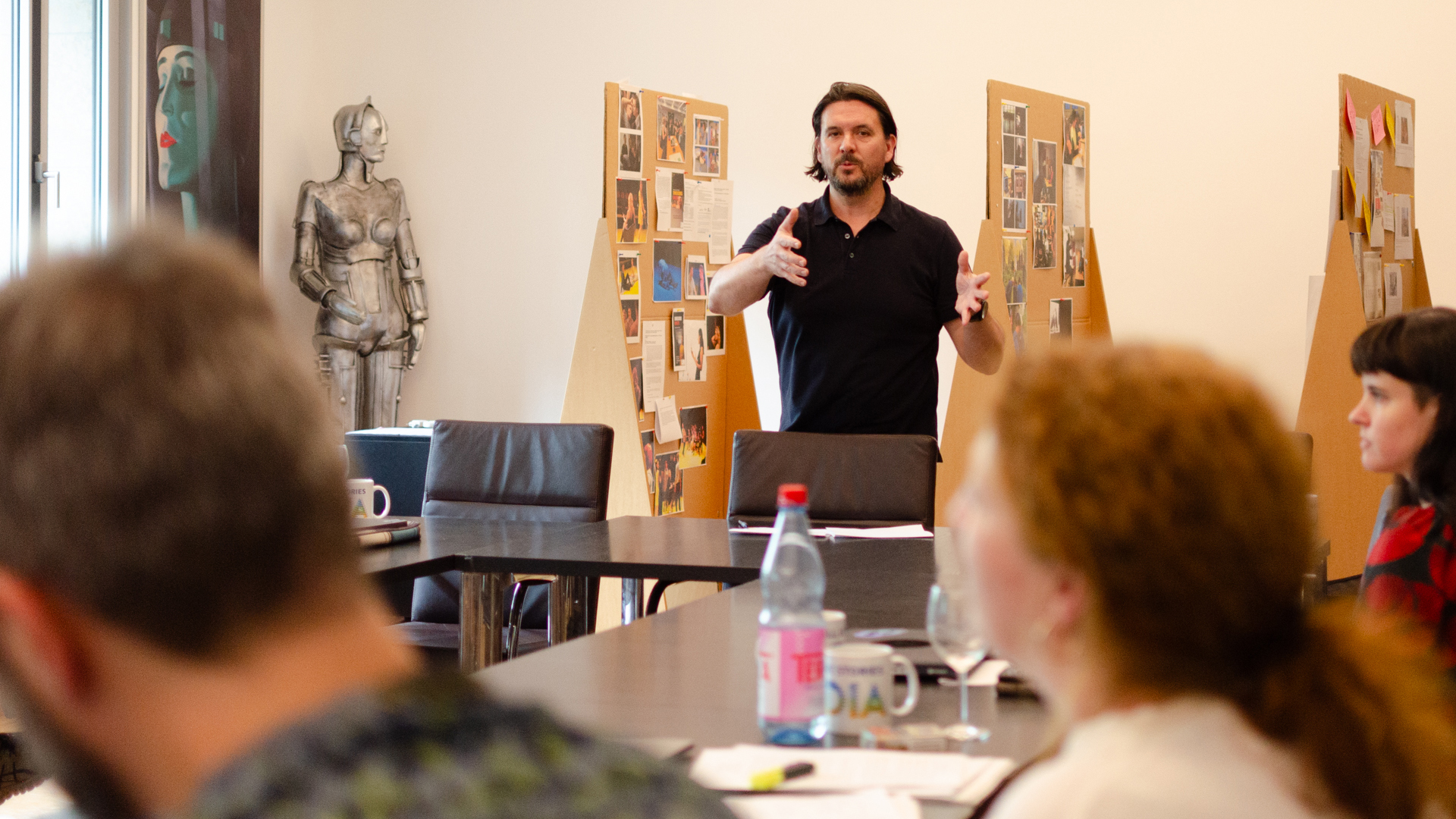
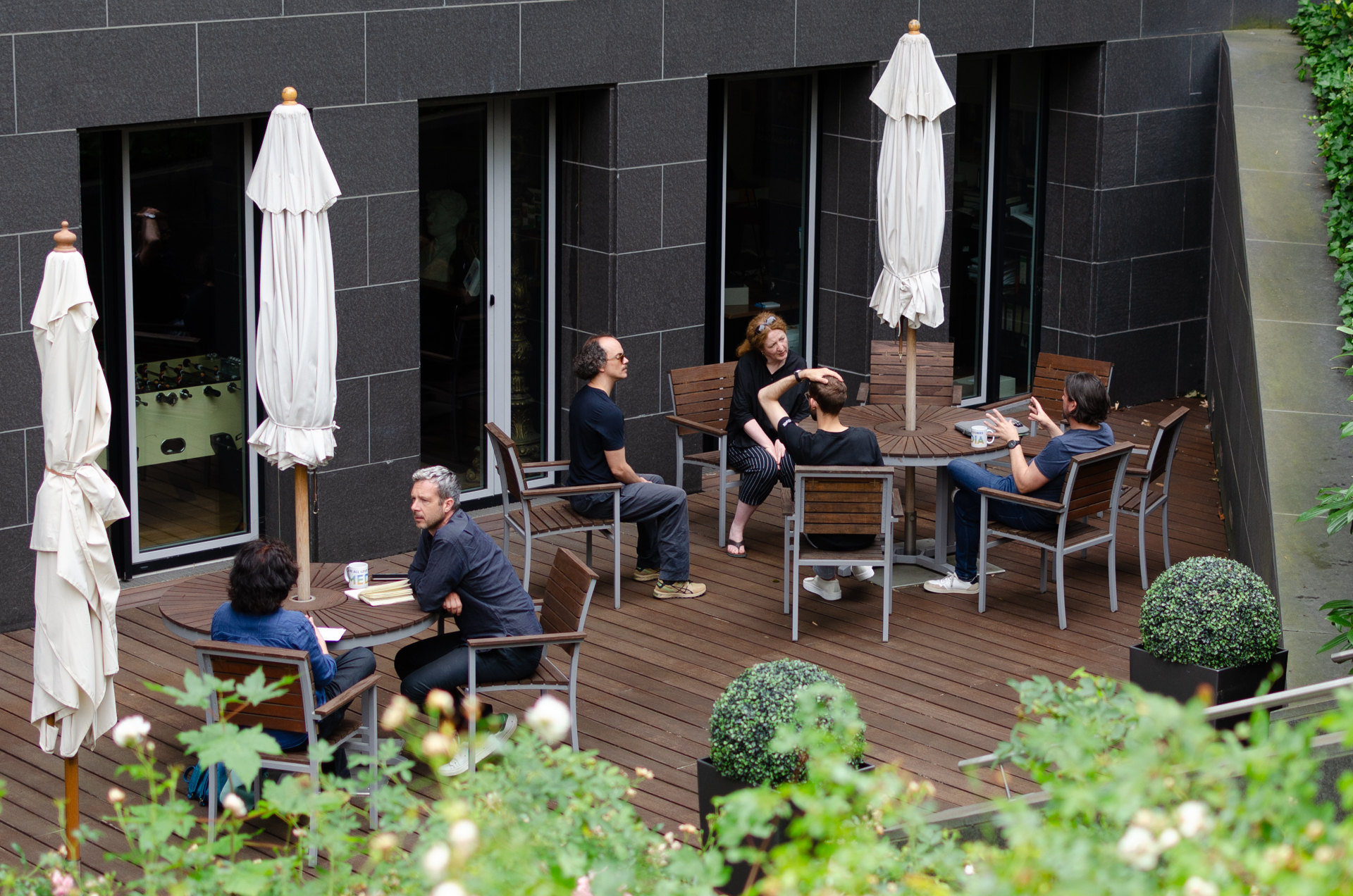
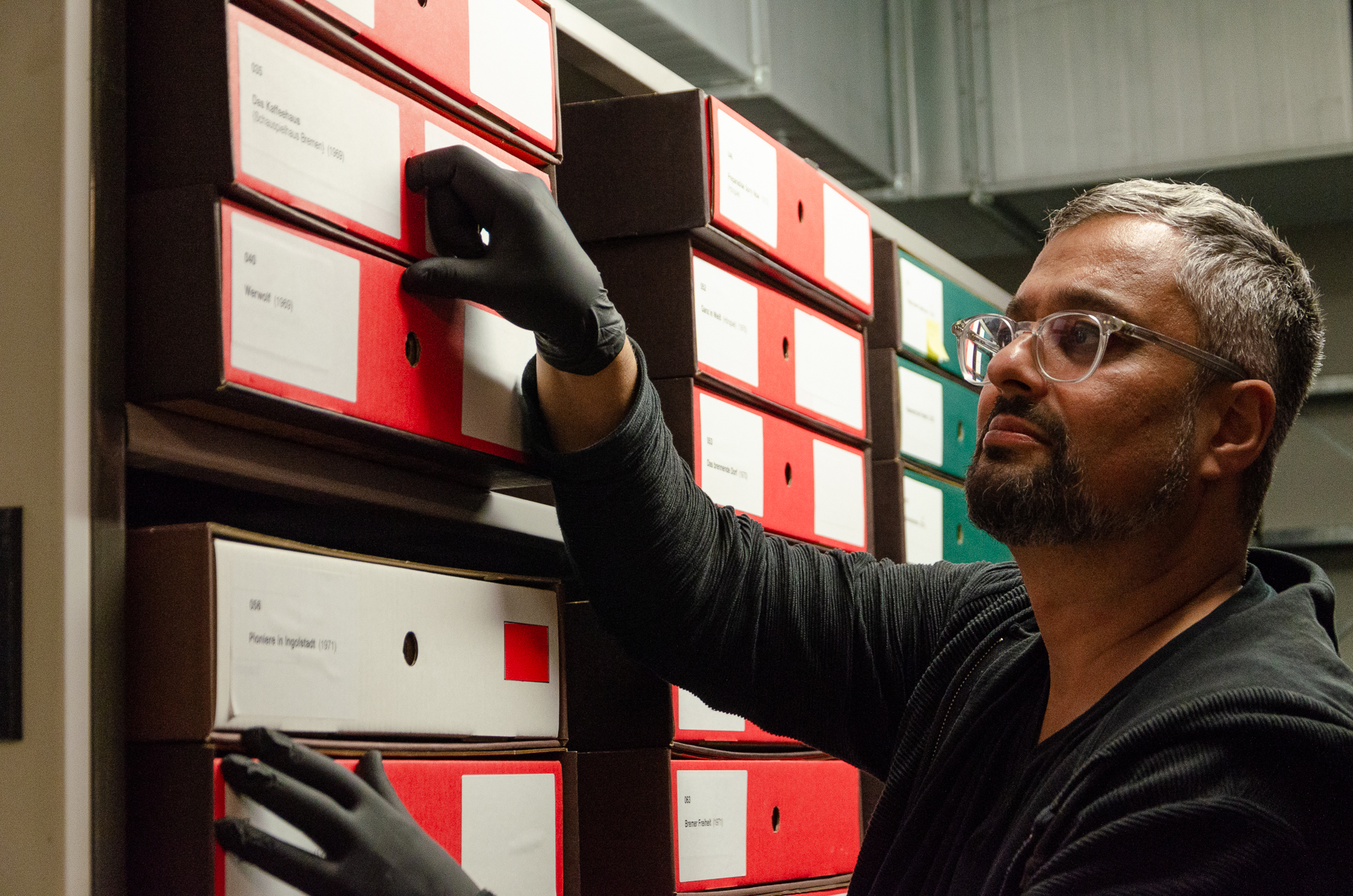
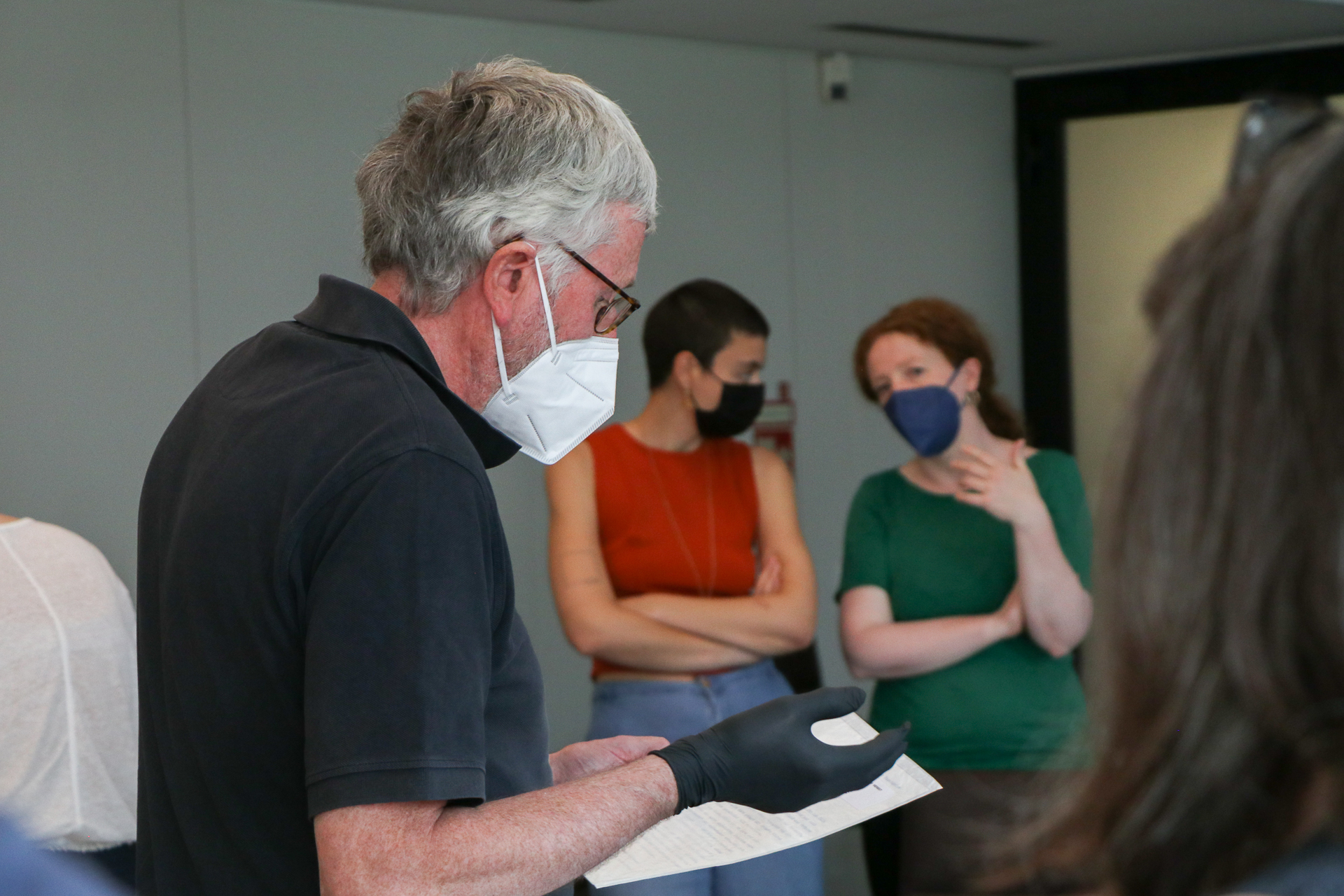
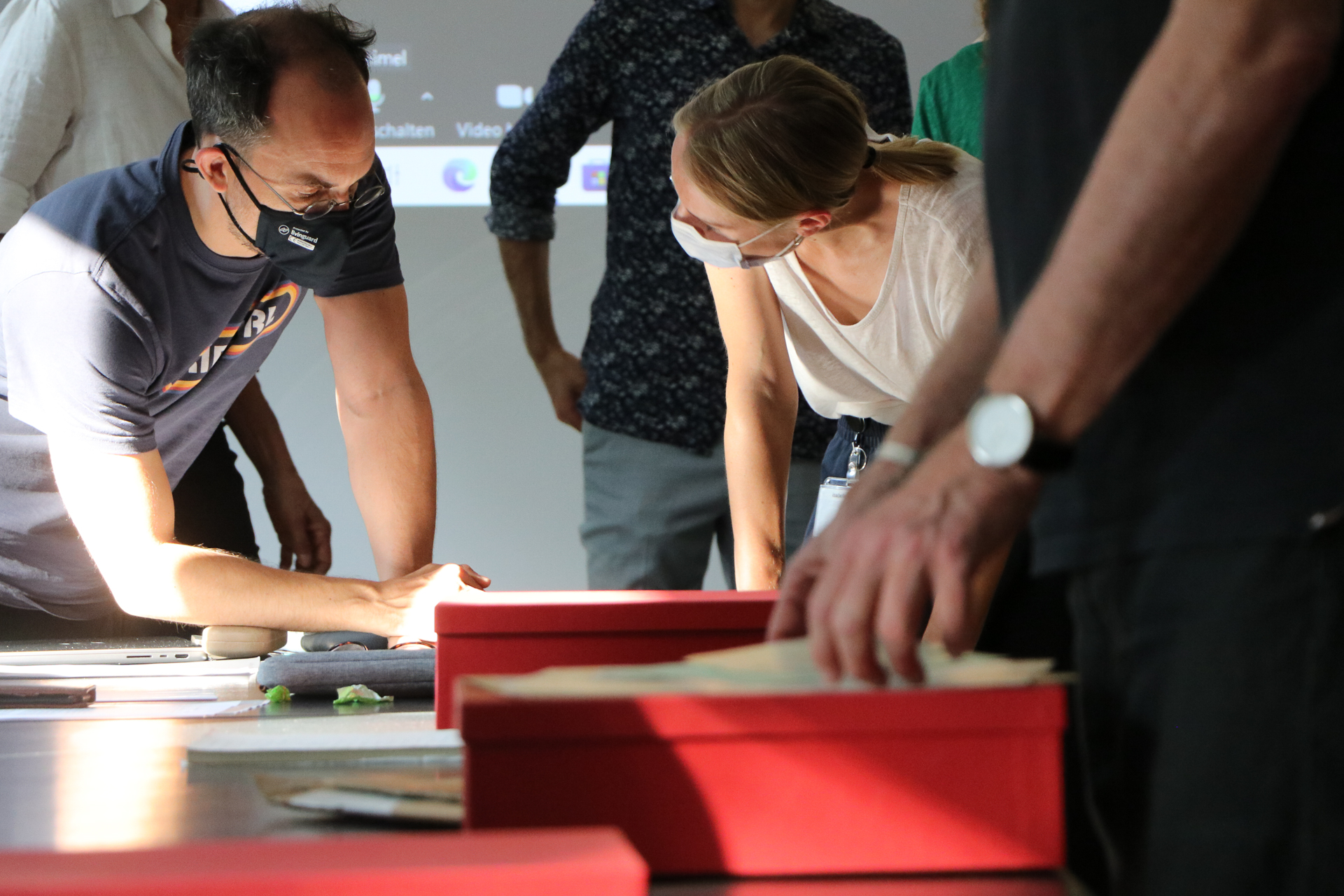
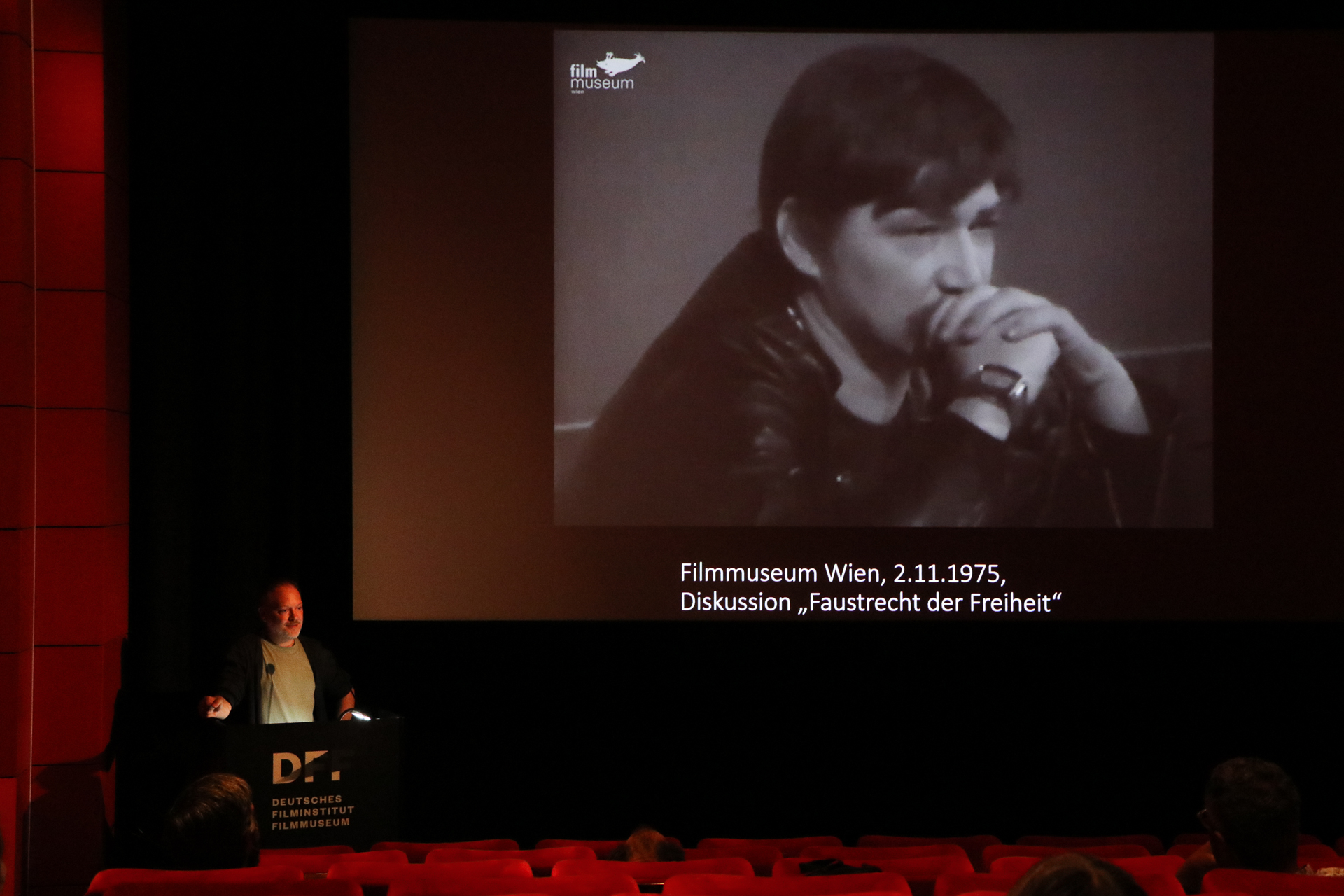
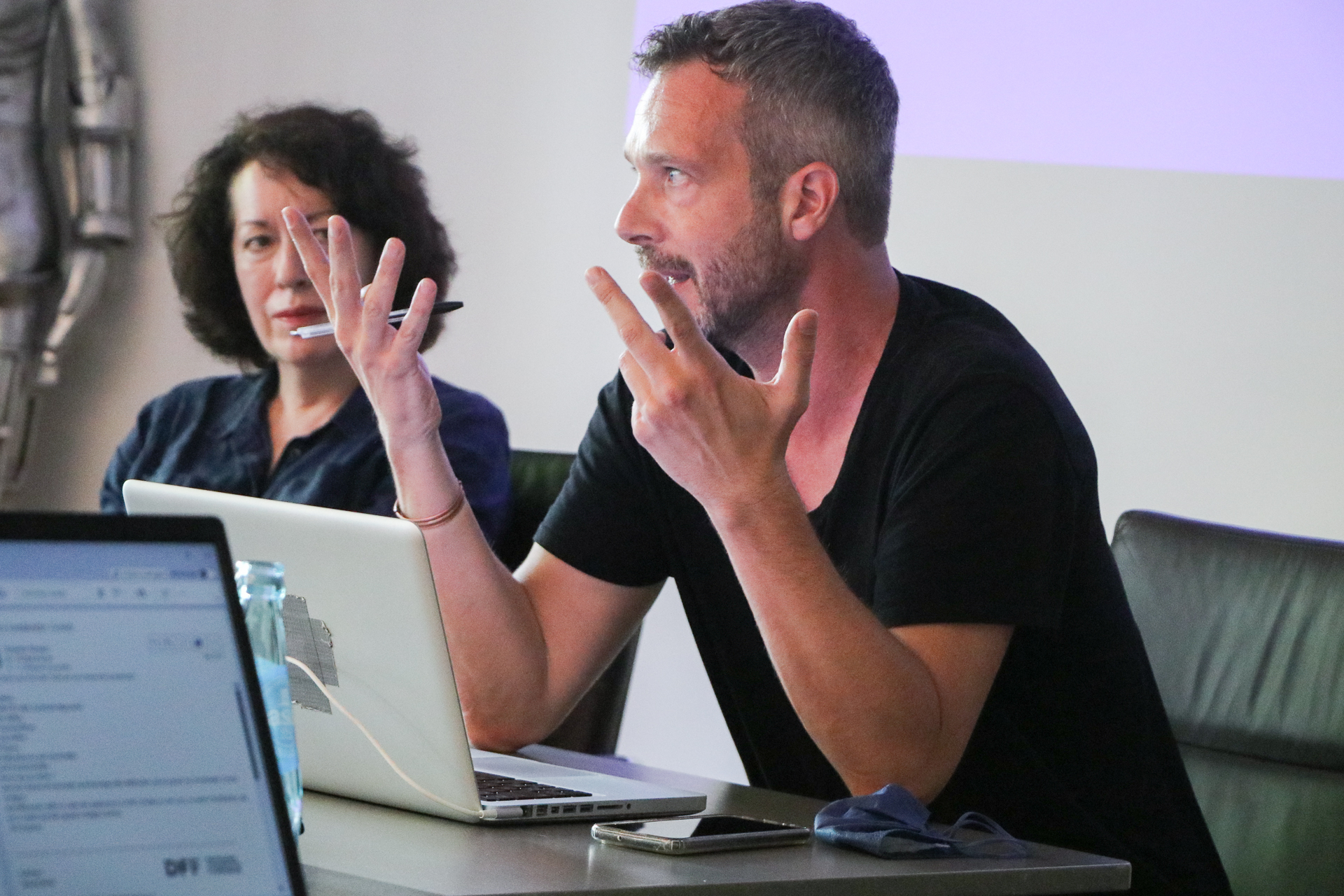
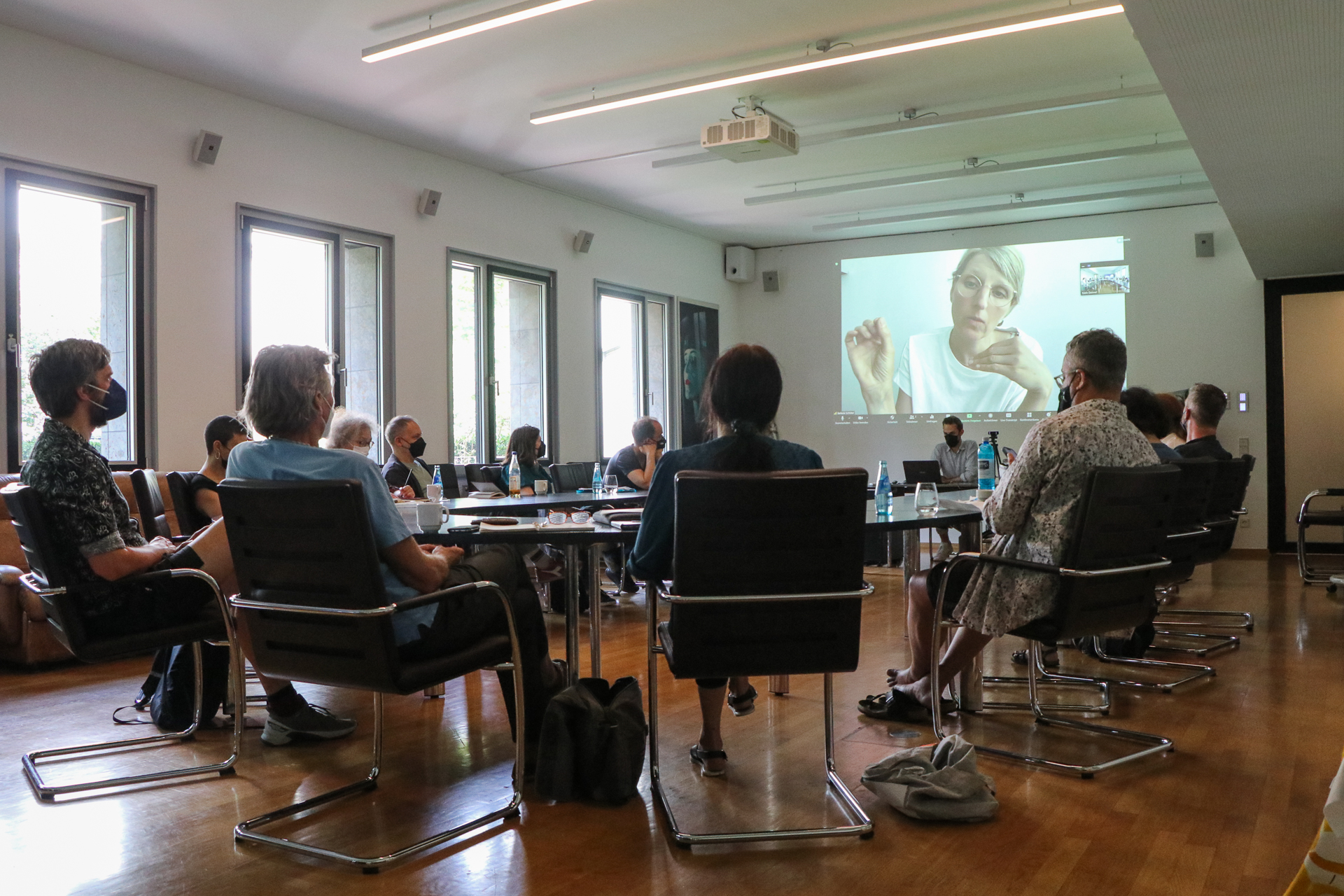
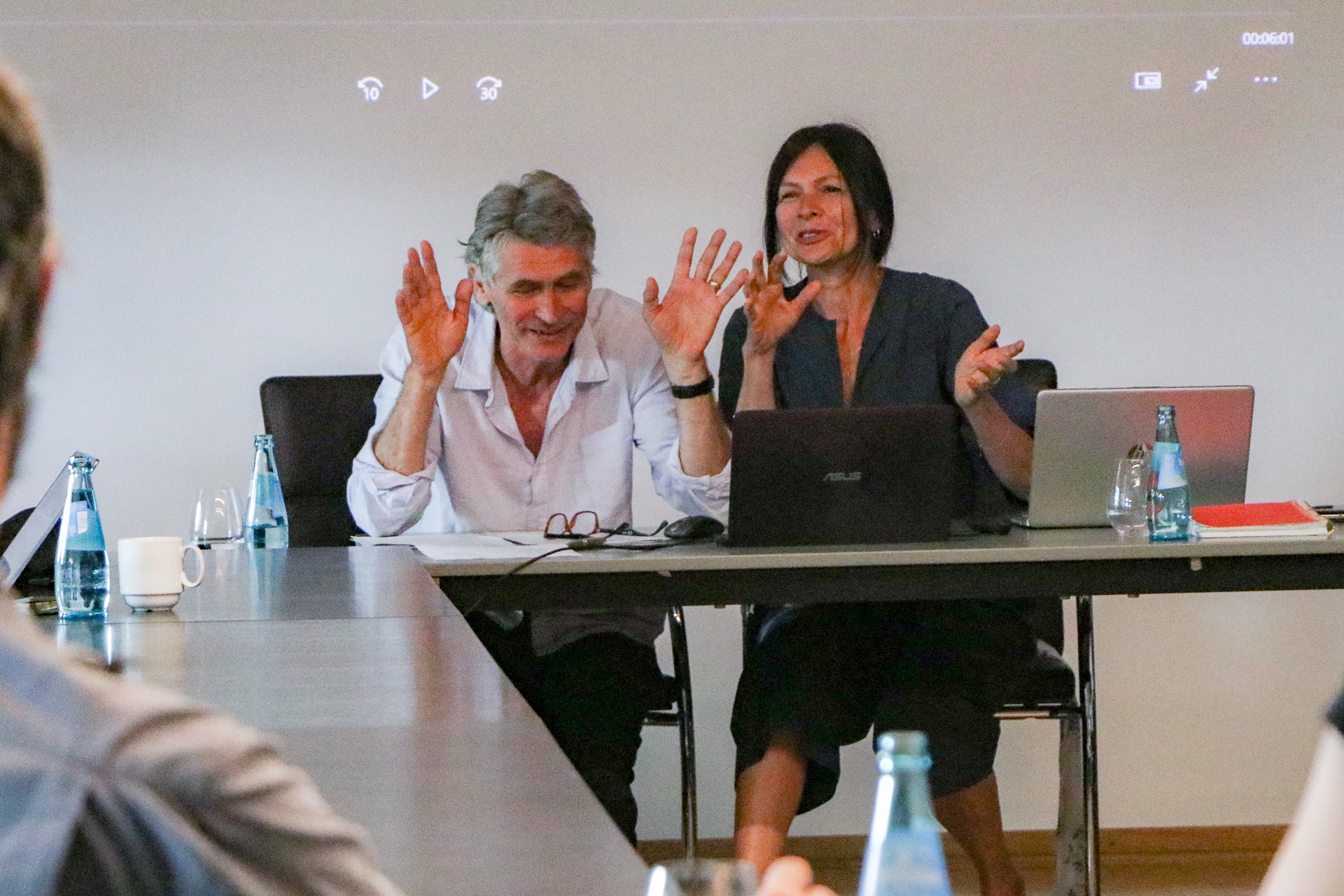
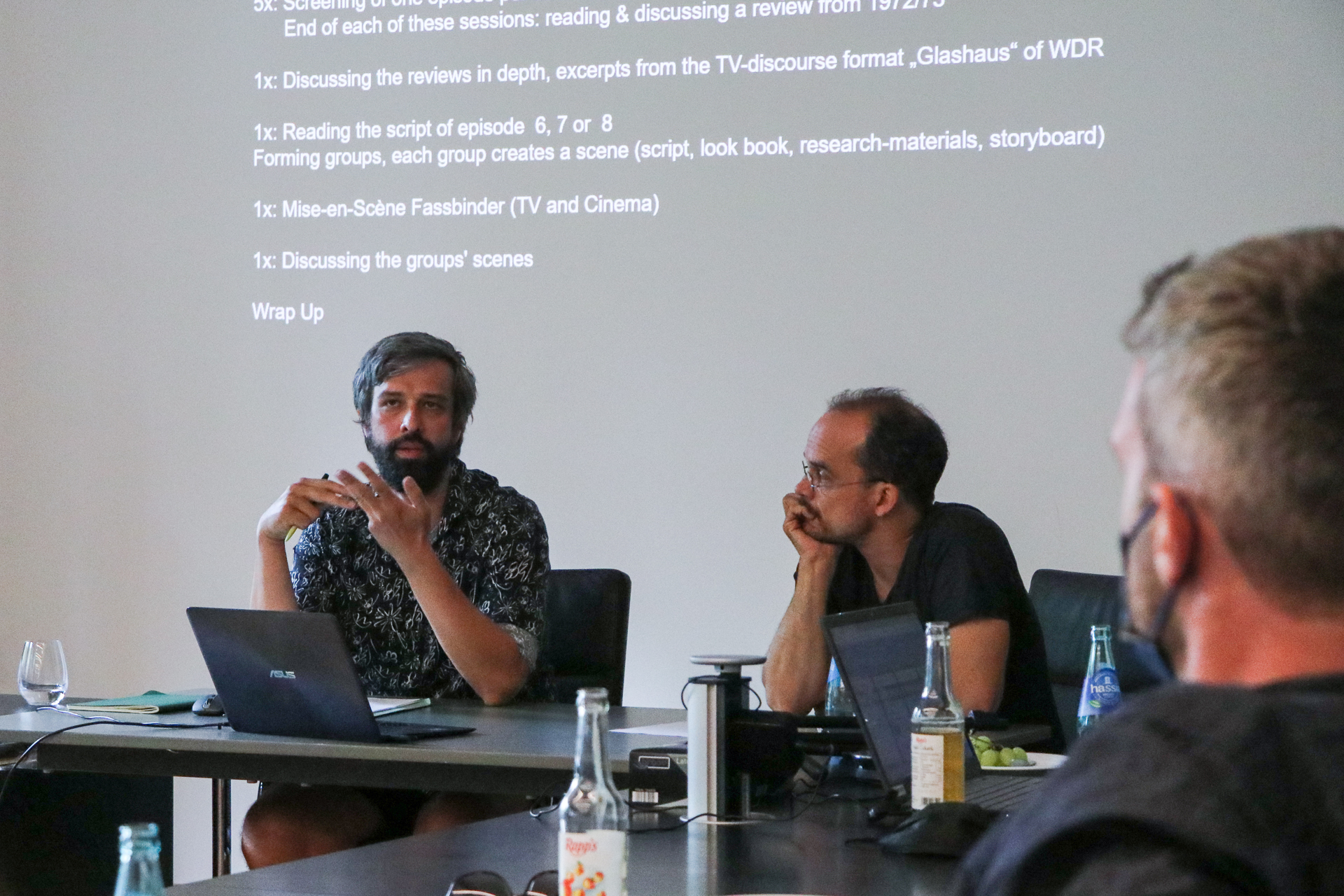
Meetings and virtual exchanges
The three-day exchange meetings held at the DFF Archive Center in the summers of 2022 and 2023 were at the core of our collaborative efforts. These meetings included discussions and keynote speeches about the aesthetic education of film and the inclusion of film history in schools, the interface between communication and artistic practice, and the curatorial work of Fassbinder.
The three-day exchange meetings held at the DFF Archive Center in the summers of 2022 and 2023 were at the core of our collaborative efforts. These meetings included discussions and keynote speeches about the aesthetic education of film and the inclusion of film history in schools, the interface between communication and artistic practice, and the curatorial work of Fassbinder.
The three-day exchange meetings held at the DFF Archive Center in the summers of 2022 and 2023 were at the core of our collaborative efforts. These meetings included discussions and keynote speeches about the aesthetic education of film and the inclusion of film history in schools, the interface between communication and artistic practice, and the curatorial work of Fassbinder.
Anna Bell, a PhD student at the University of Mannheim, presented the results of her study on Fassbinder’s reputation. The facilitators also gathered at the DFF Cinema to watch Fassbinder’s “FOX AND HIS FRIENDS” (FRG 1974/75) and, following a lecture by Jan Künemund, to discuss and contextualize it within the landscape of German queer cinema.
To bridge the geographic distance between us, the facilitators met regularly for online project reflection meetings to share the work and lessons learned from the various outreach efforts.
Public Engagement
One of the standout moments of the 2023 exchange meeting was the public short film program entitled “Eight Hours Are Not a Day,” curated by Alex Gerbaulet. This program was inspired by Rainer Werner Fassbinder’s 1972 series of the same name, one of the seminal proletarian family series on West German television, and explored the cinematic representation of work and workers: Christina Perinciolis’ “FÜR FRAUEN. KAPITEL 1” (FRG 1972) presented a compelling vision of solidarity and feminism both in front of and behind the camera. In “EIN FILM ÜBER DEN ARBEITER” (DE 1995), Stefan Hayn offered a frank and radical exploration of his personal experiences in the fields of film, nursing and prostitution. Meanwhile, ‘SCHICHT’ (DE 2015) by Alex Gerbaulet delved into her family’s history in the industrial city of Salzgitter. The screening was followed by a film talk moderated Alejandro Bachmann and Alex Gerbaulet.
In the fall of 2022, we presented the POLITICAL FASSBINDER film series in Berlin. We also organized school theater rehearsals for CHINESISCHES ROULETTE in Berlin and Frankfurt as well as a Fassbinder film series at Zurich’s FILMPODIUM in the fall of 2023. These initiatives provide additional opportunities for the public to connect with and immerse themselves in our project.
Publication
A publication focusing on the results and reflections of the project, complemented by numerous photographs, is currently in the works and will be published by DFF in spring 2024. Experts associated with the project will discuss outreach practices and intersectional, particularly queer, perspectives. The work with the objects in the Fassbinder Collection at the DFF Archive Center will be the focus of another section of the publication.
Mediation Projects and Teams
The Wolf Kino Berlin is carrying out its educational project together with two Berlin high schools in Kreuzberg and Neukölln. Under the title POLITICAL FASSBINDER, the students have the opportunity to see a selection of Fassbinder’s films in the cinema and then to analyze them with the film historian Brigitta Wagner and to discover new perspectives on Fassbinder’s films in an exchange of ideas. The students develop their own audiovisual projects from the political perspectives of their present and with the creative means of their everyday life. With regular feedback and exchange of ideas, the students from both schools will present the final versions of their own short films at the Wolf Kino in Berlin.
At the same time, Wolf Kino presented six Fassbinder films to the general public. Each screening is accompanied by an audience discussion with cultural experts, primarily filmmakers of the younger generation: DEUTSCHLAND IM HERBST (FRG 1978) with director Julian Radlmaier, KATZELMACHER (FRG 1969) with filmmaker Ted Fendt, ANGST ESSEN SEELE AUF (FRG 1974) with director Burhan Qurbani, FAUSTRECHT DER FREIHEIT (FRG 1975) with film curator Toby Ashraf, DIE EHE DER MARIA BRAUN (FRG 1979) with writer Susanne Heinrich and DIE DRITTE GENERATION (FRG 1979) with former Fassbinder editor Juliane Lorenz. Dr. Brigitta Wagner gave an interview about the film series to the German broadcaster rbb.
Dr. Brigitta Wagner is a German-American film historian and filmmaker. She lives and works in Berlin, where she lectures at the MET Film School and runs film education projects at the Wolf Kino. She studied literature and film at Dartmouth College and was a DAAD Fellow in film studies at Freie Universität Berlin. She received her Ph.D. in German Studies and Film and Visual Studies from Harvard University. From 2008-13, she was an assistant professor of film studies at Indiana University, with a focus on German film history. In her research and artistic work, Wagner is interested in the connection between present and past, and between place and media memory. She is the editor of the edited volume DEFA AFTER EAST GERMANY (2014) and the author of BERLIN REPLAYED: CINEMA AND URBAN NOSTALGIA IN THE POST-WALL ERA (2015). She mixes documentary and fictional elements in her film ROSEHILL (2015).
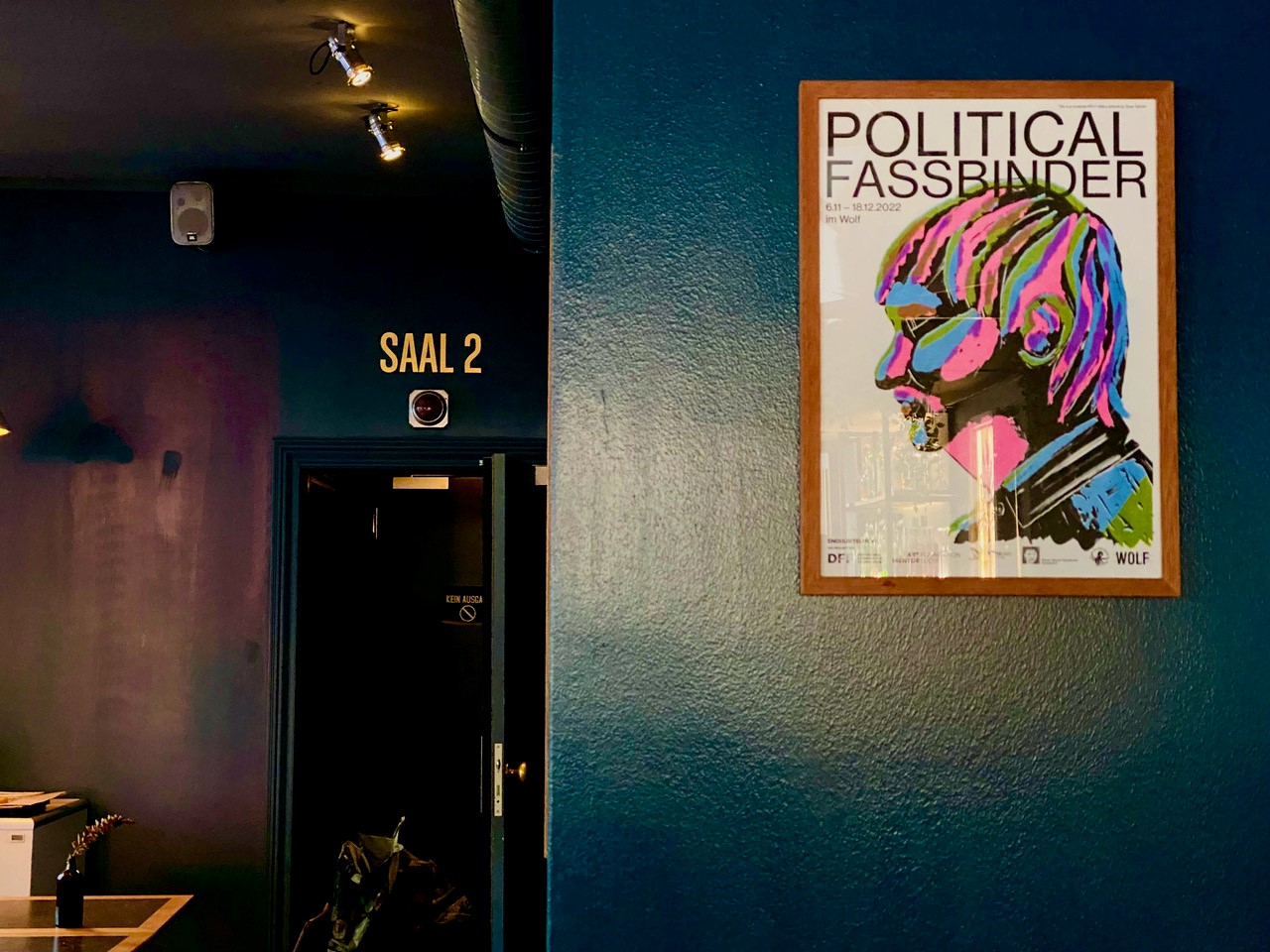
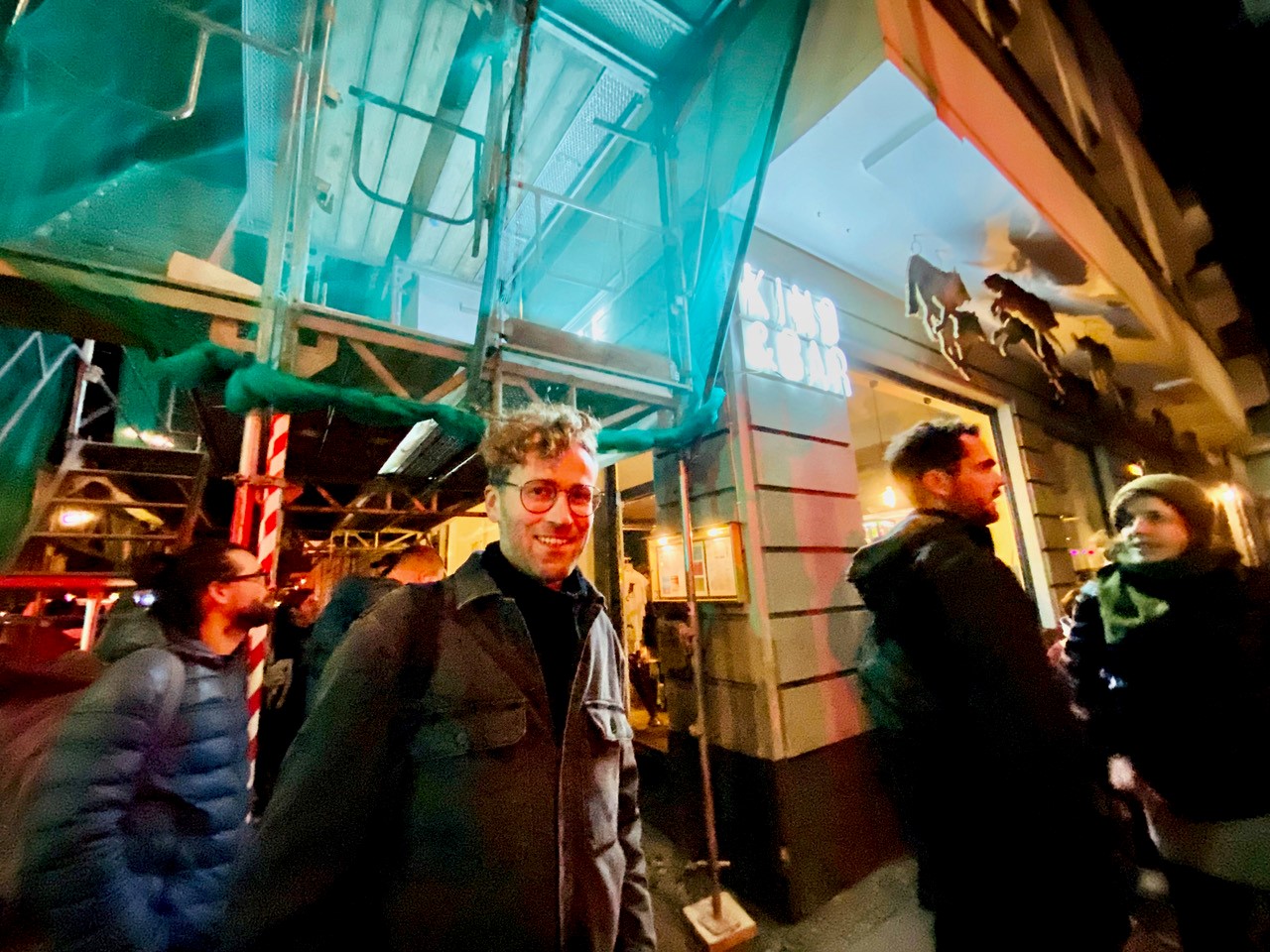
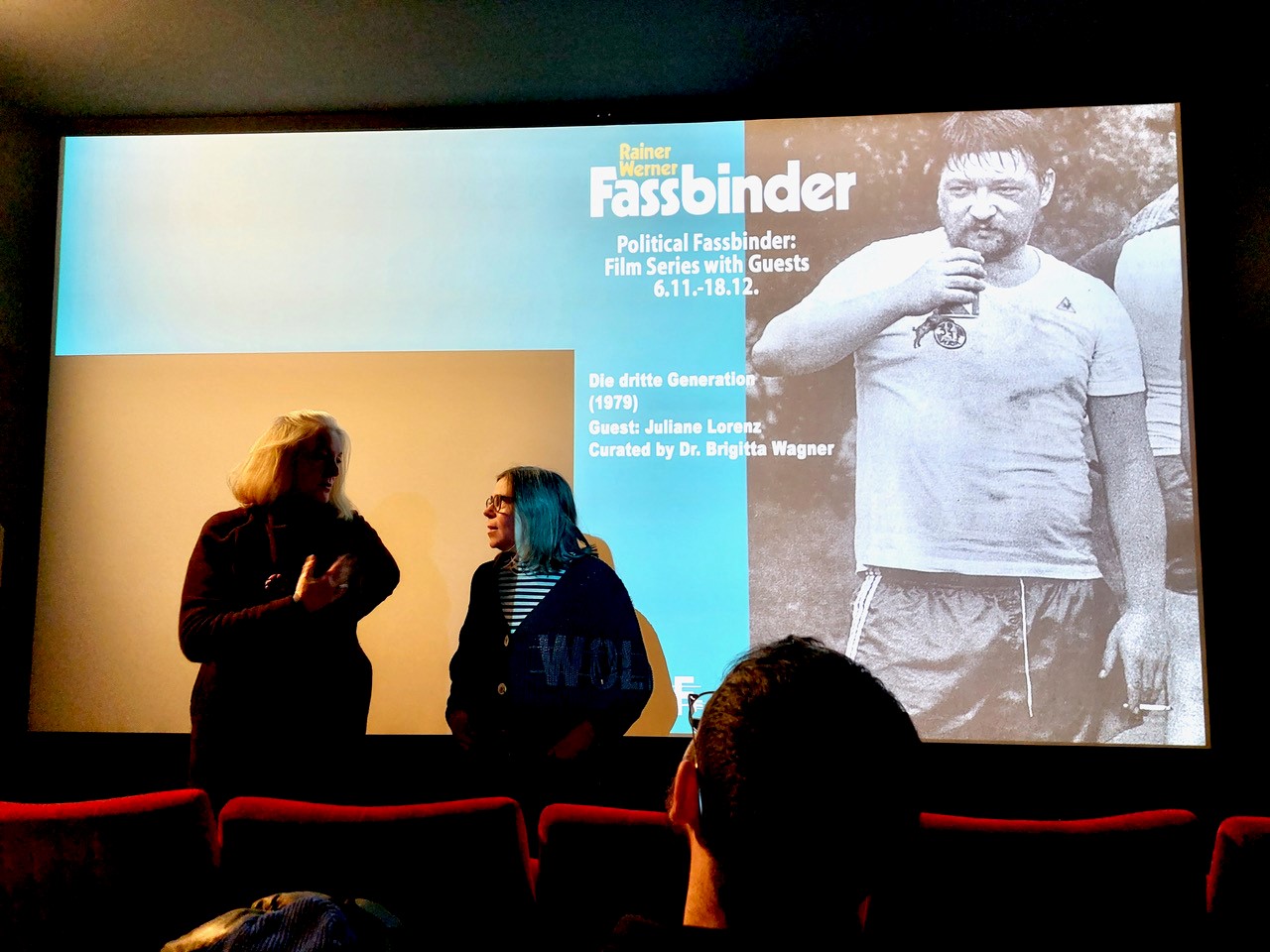
Students of the Droste-Hülshoff-Gymnasium in Berlin develop a stage version of the Fassinder film CHINESISCHES ROULETTE (FRG 1976). Film educator and media scholar Dr. Martin Ganguly first introduces the young students to the life and work of the director through other films. By watching the films and working with original texts from the Fassbinder archive, they learn about Fassbinder’s aesthetic approach.
They then work together to develop how to go from film to play. The students will work with the original text and contextualize it, among other things, in the form of a diverse cast. At fixed rehearsal times, the course creates a play that is presented to other school groups in Berlin and Frankfurt.
Dr. Martin Ganguly has been in charge of the Berlinale School Project since 2004. He also works as a university lecturer, author, critic, teacher, moderator, consultant, examiner (FSK) and coach for various institutions and publishers in Germany and abroad. Since 2005, he has been a scout, consultant and buyer for Matthias-Film at film festivals and press screenings in Germany and abroad. In addition to teaching, he also studied directing and acting at the Max Reinhardt Seminar in Vienna. He received the prestigious European Comenius Medal for four of his multimedia classroom adaptations. From 2013-2020 he was curator/presenter for the nationwide project “Seeing Classics – Understanding Films” of the German Film Academy (DFF). He also works as a freelancer for the DFF and since 2022 for the Wim Wenders Foundation in Berlin/Düsseldorf as well as for several intercultural education projects.
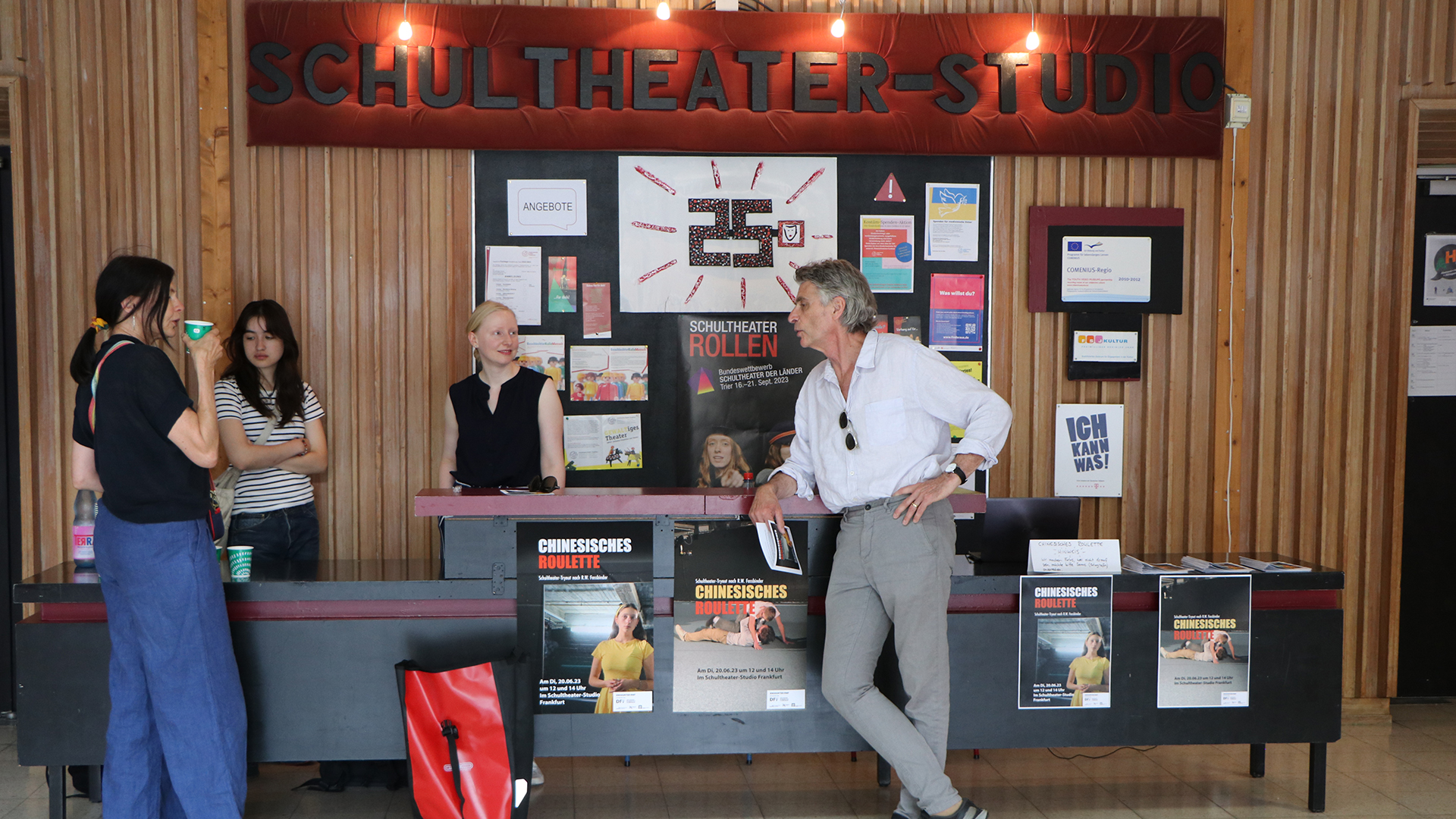
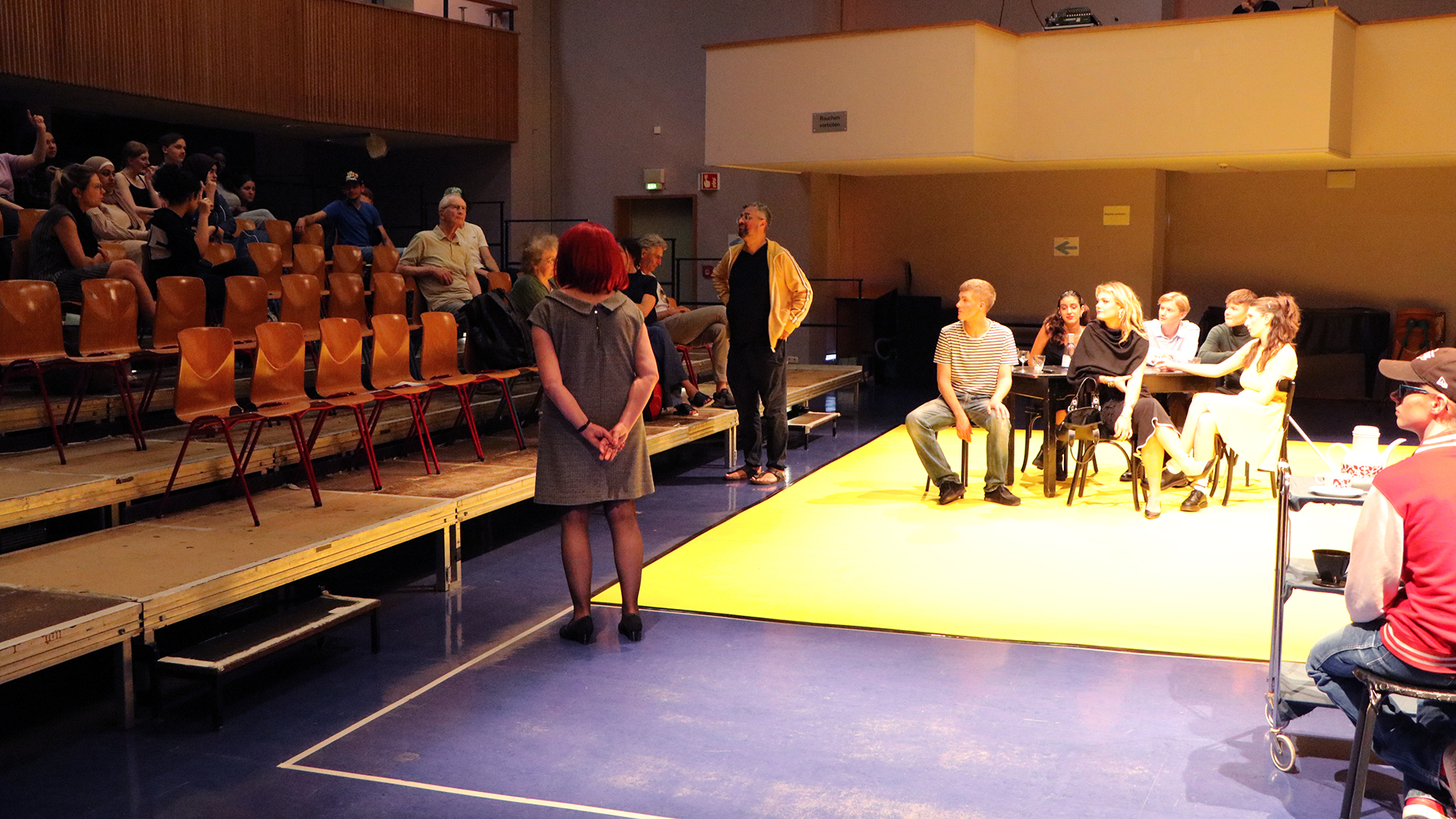
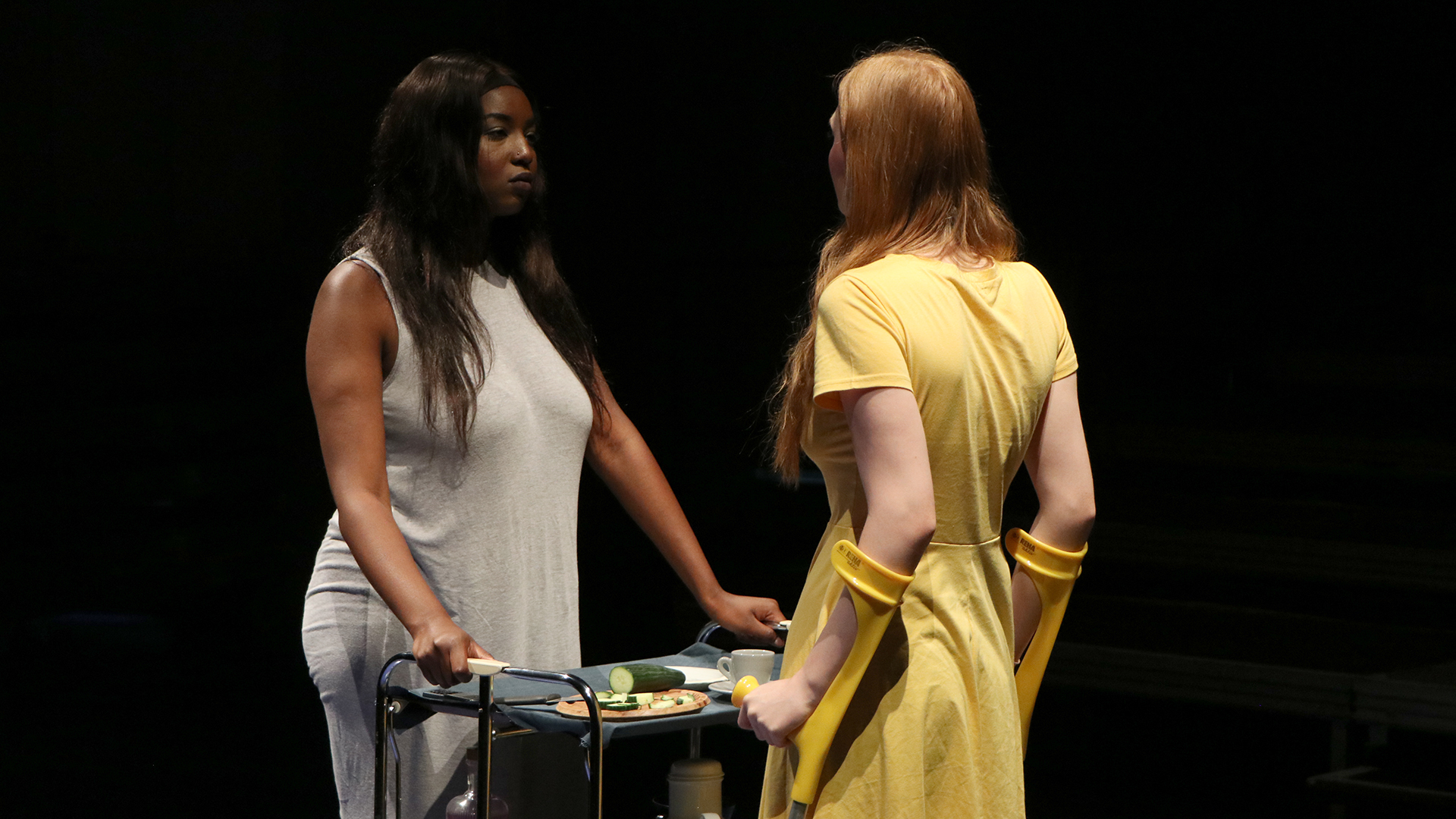
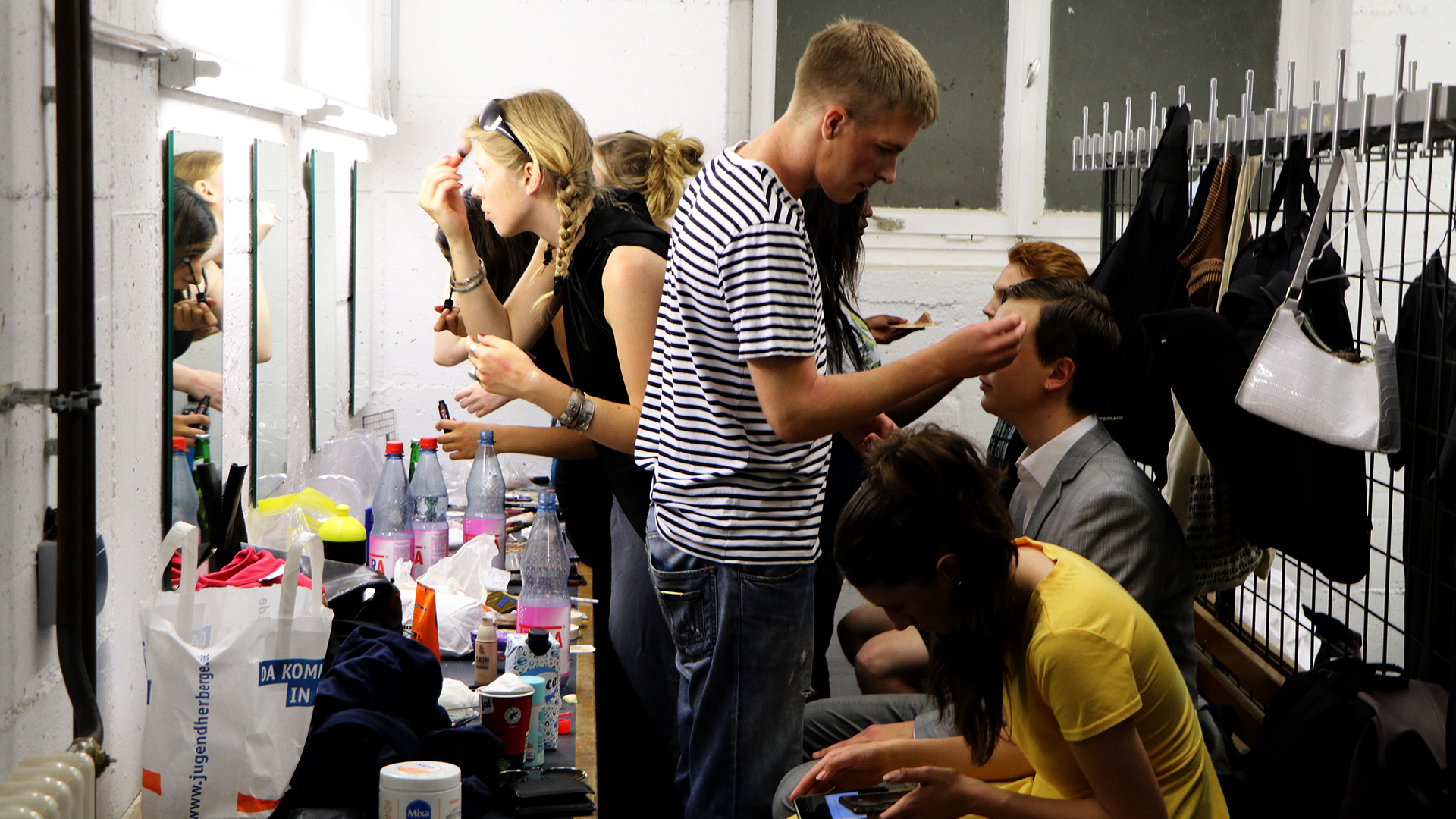
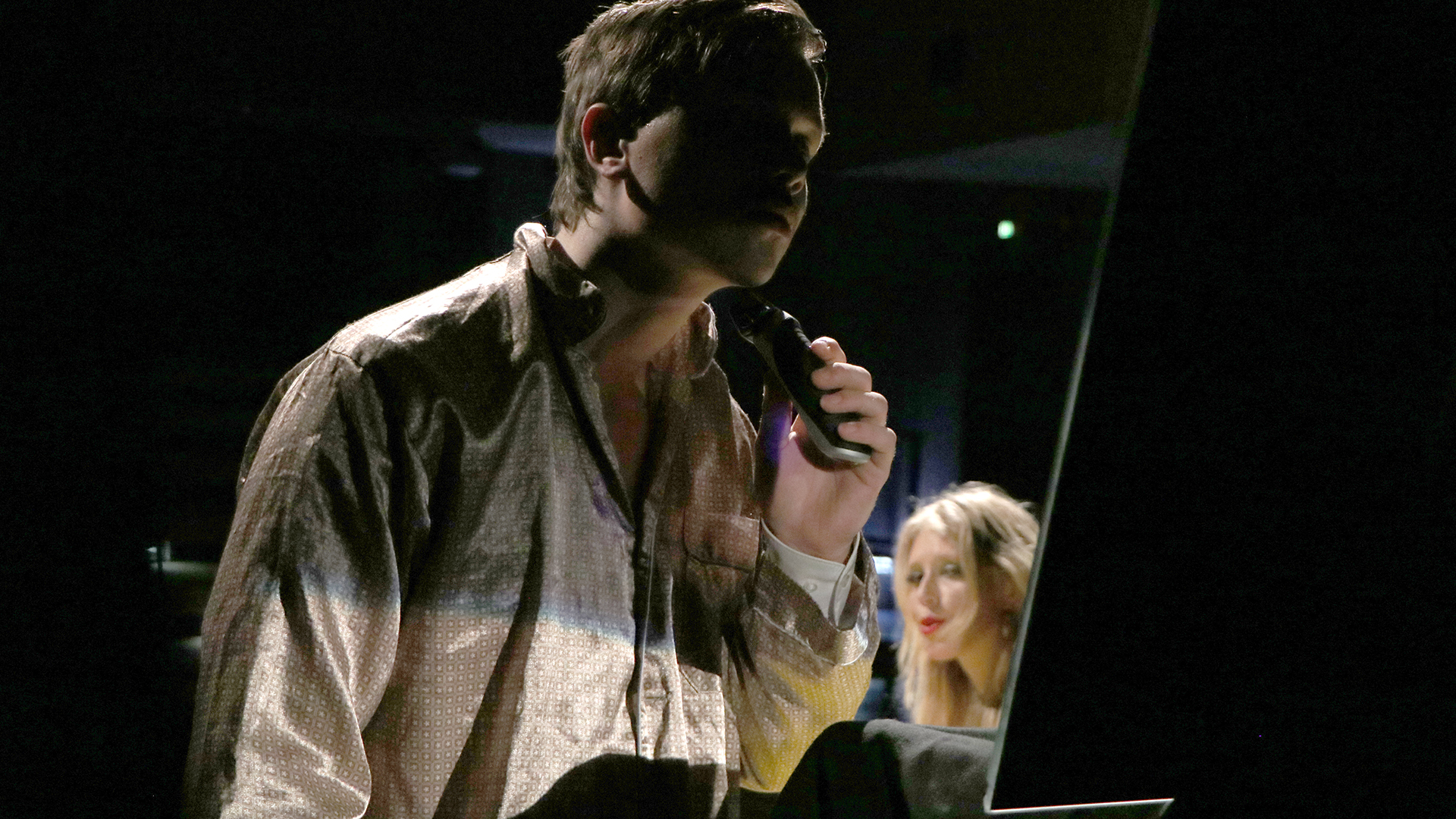
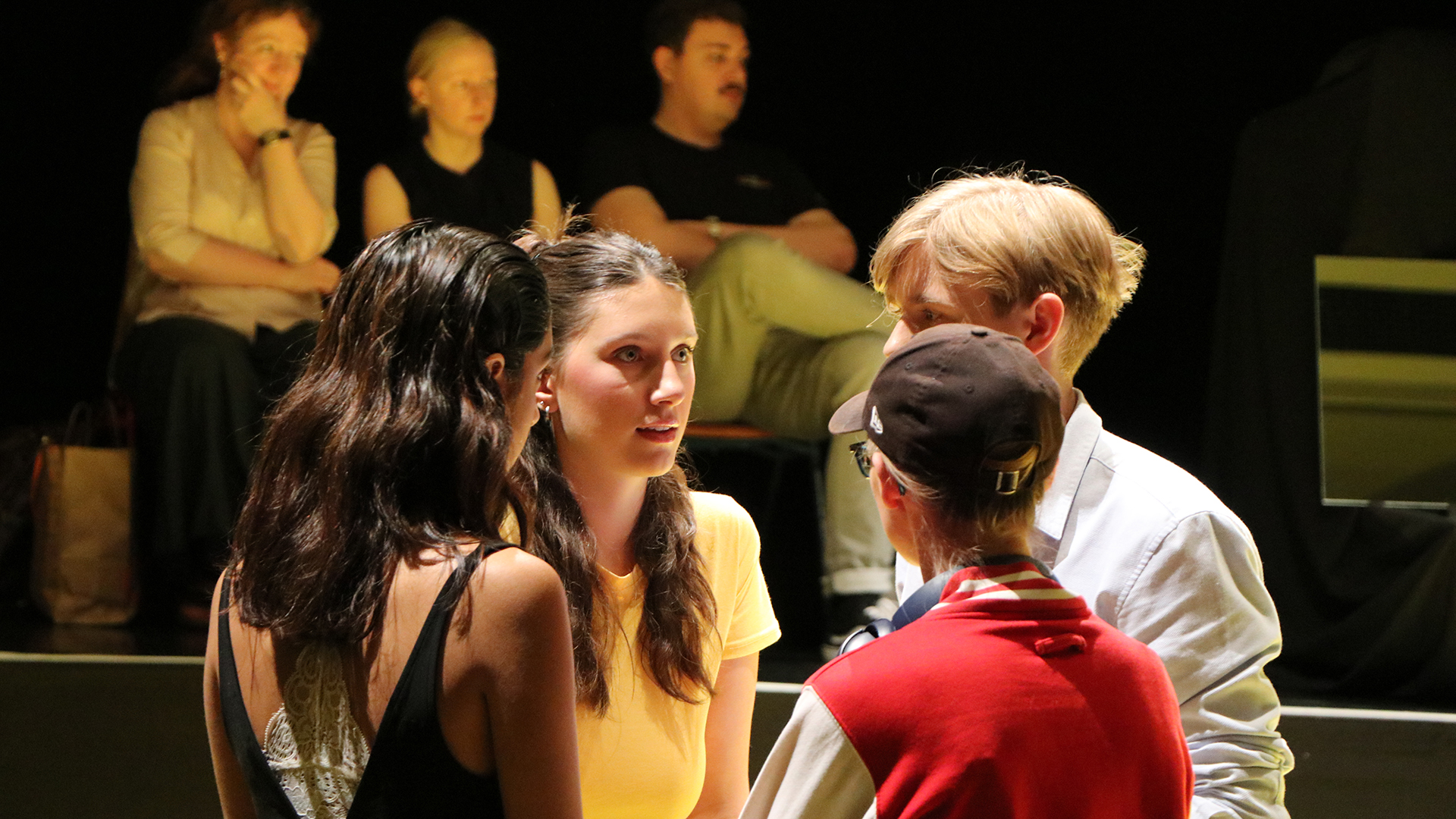
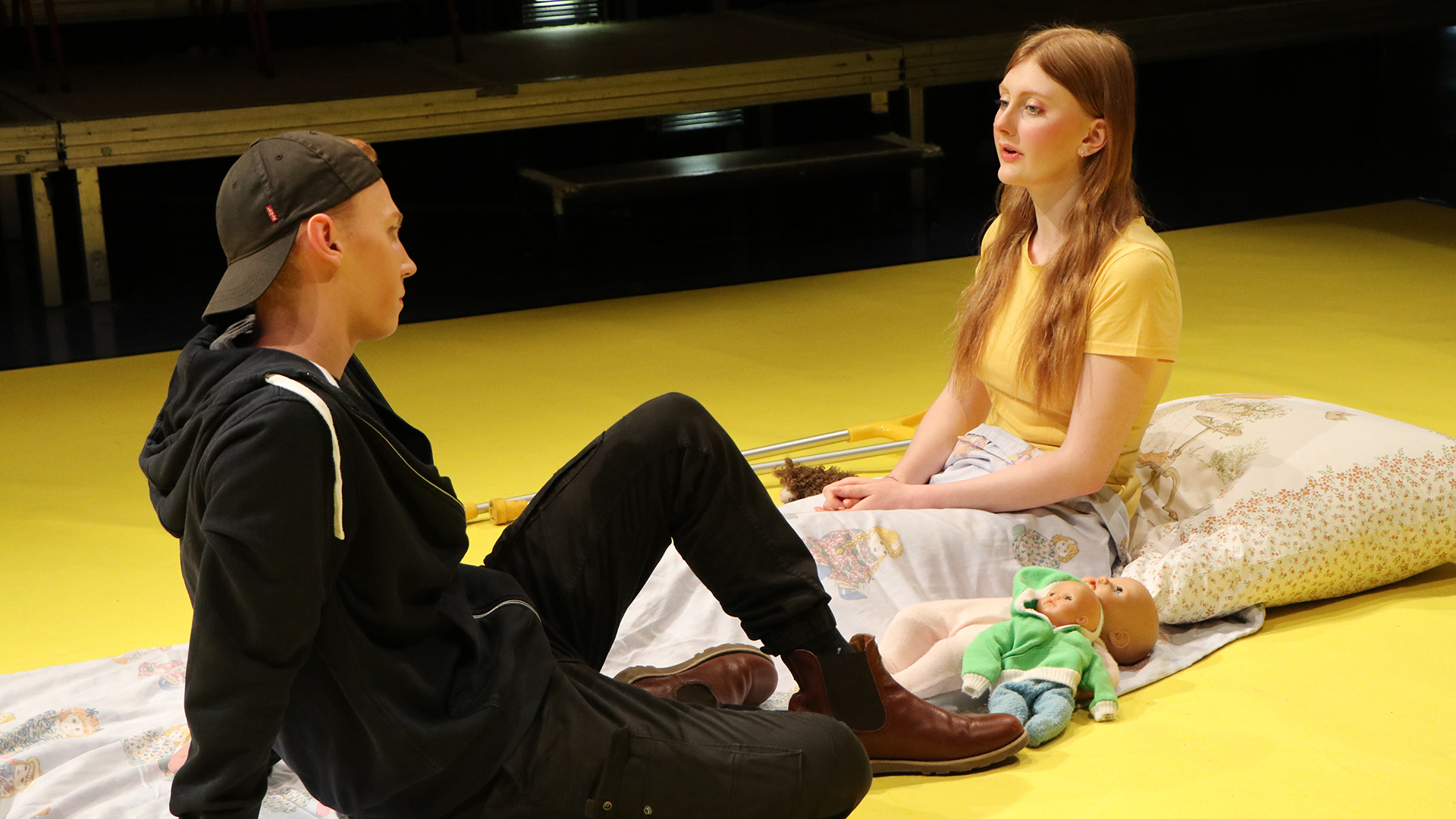
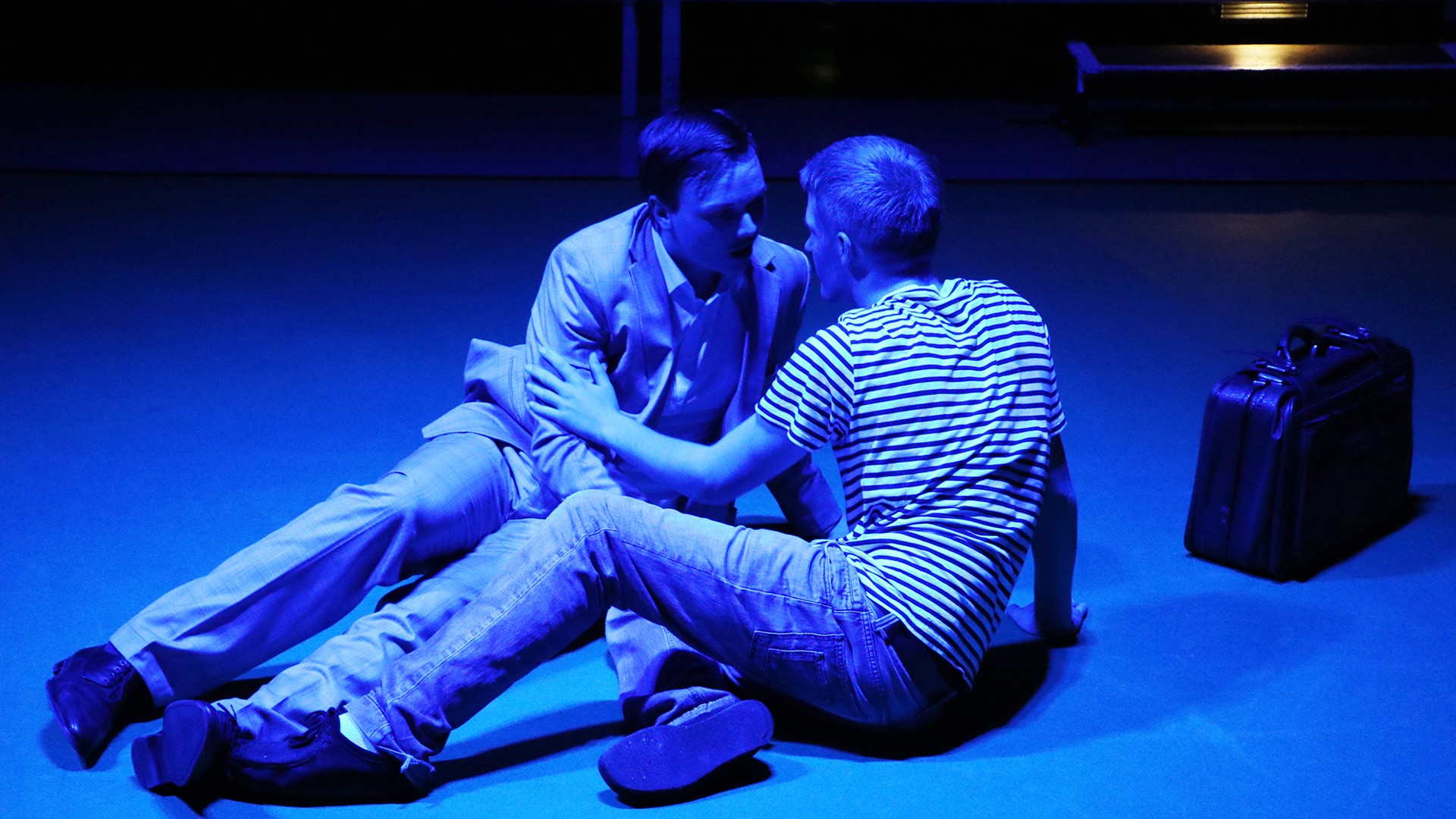
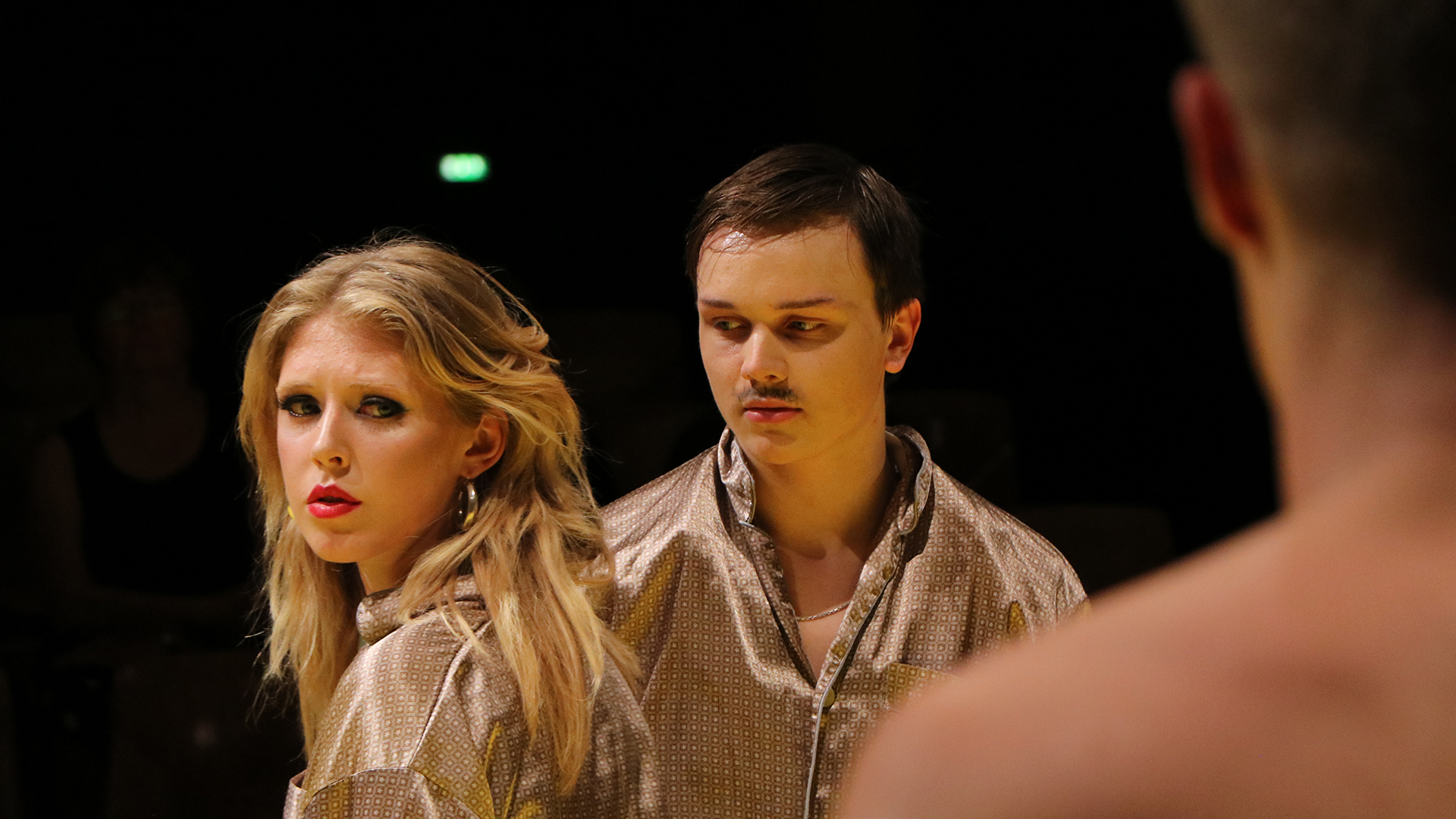
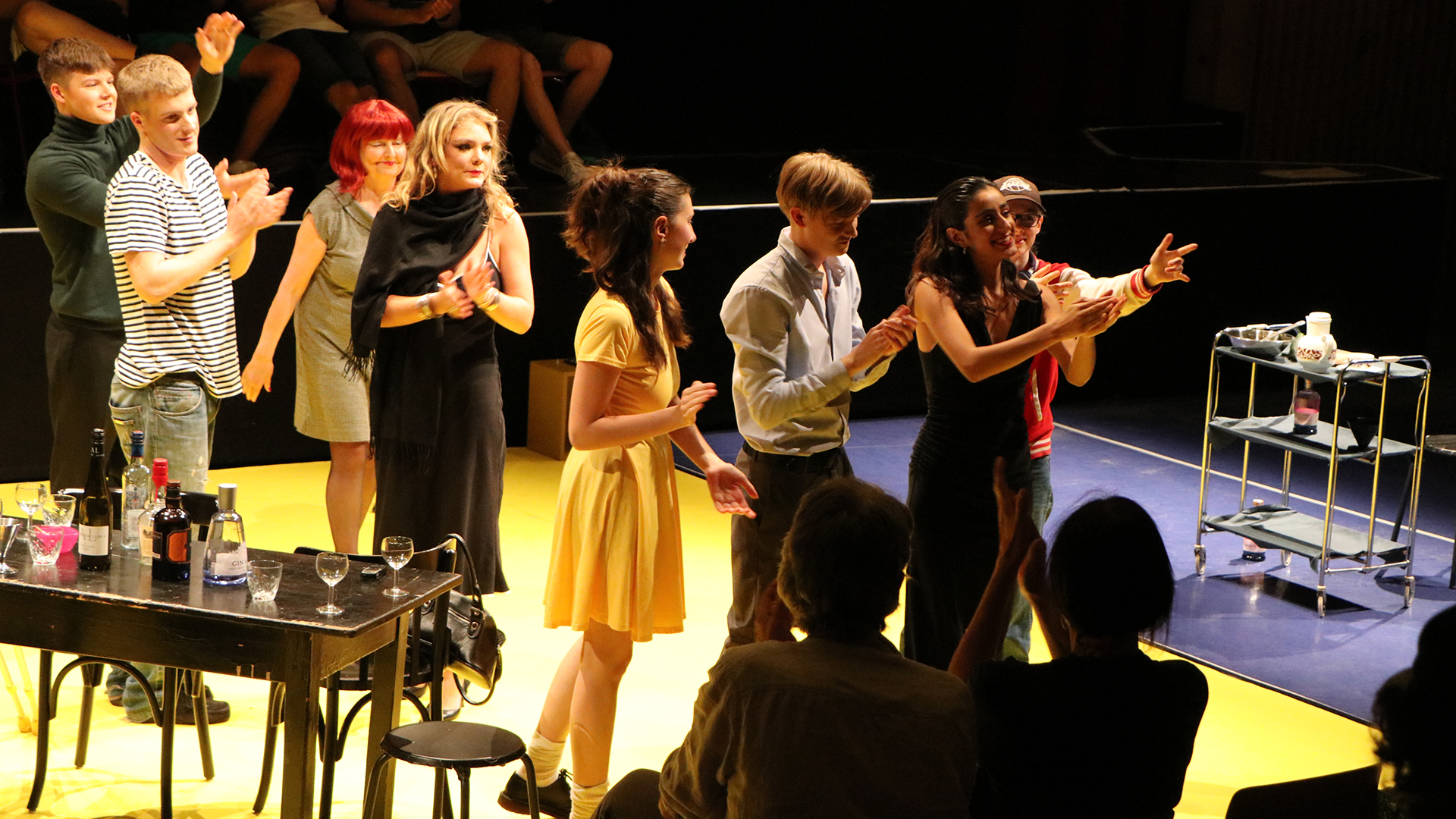
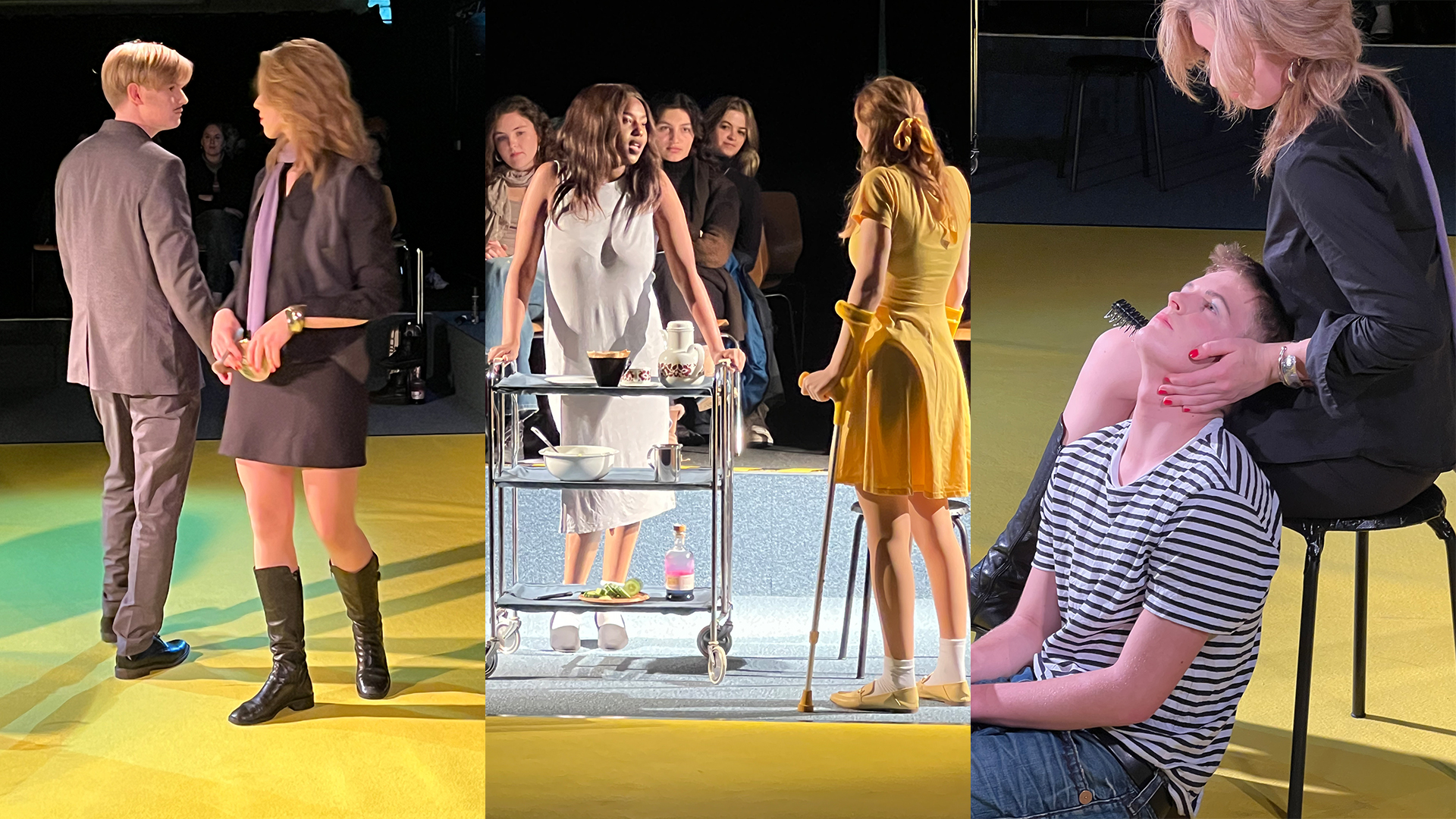
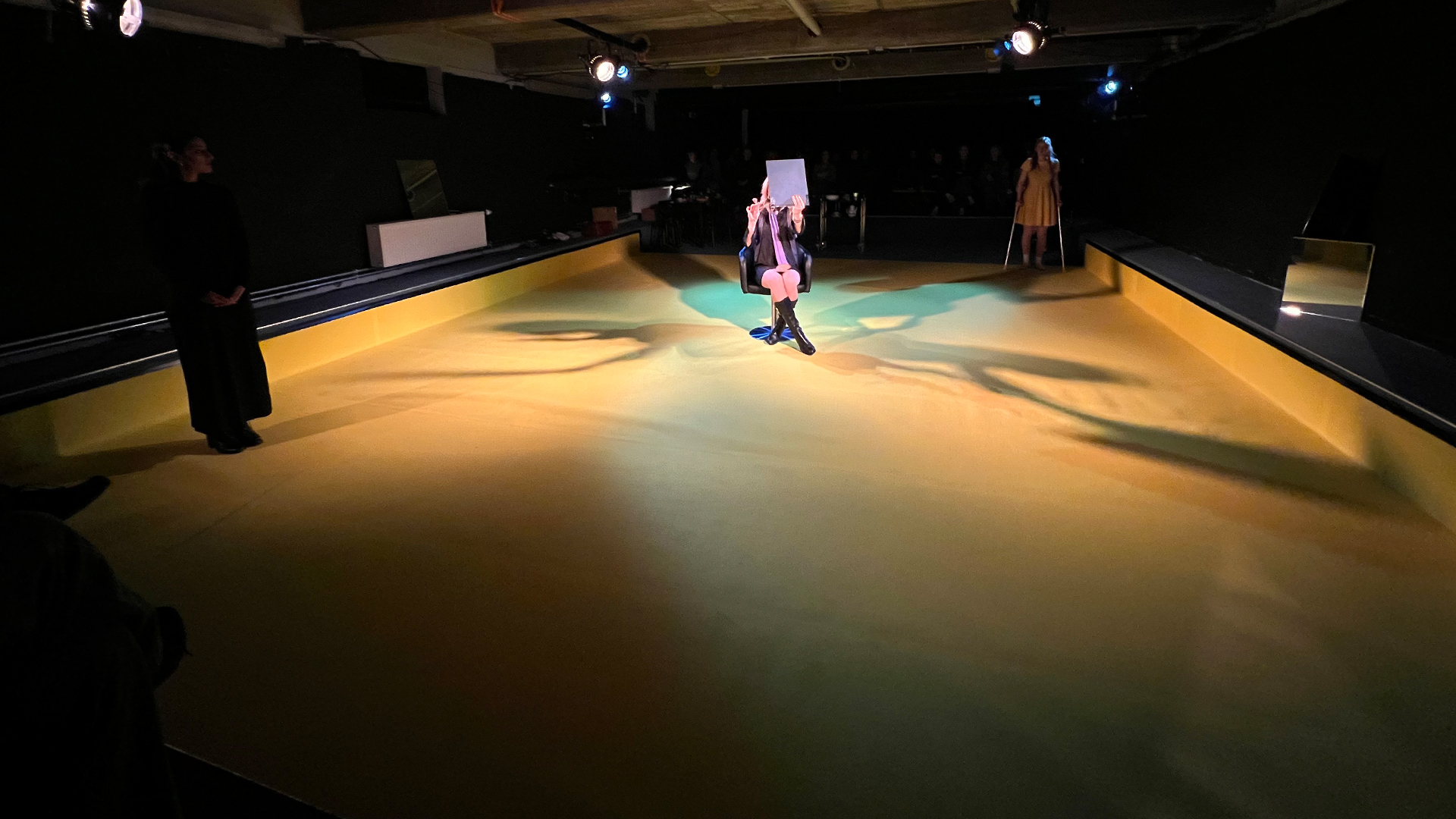
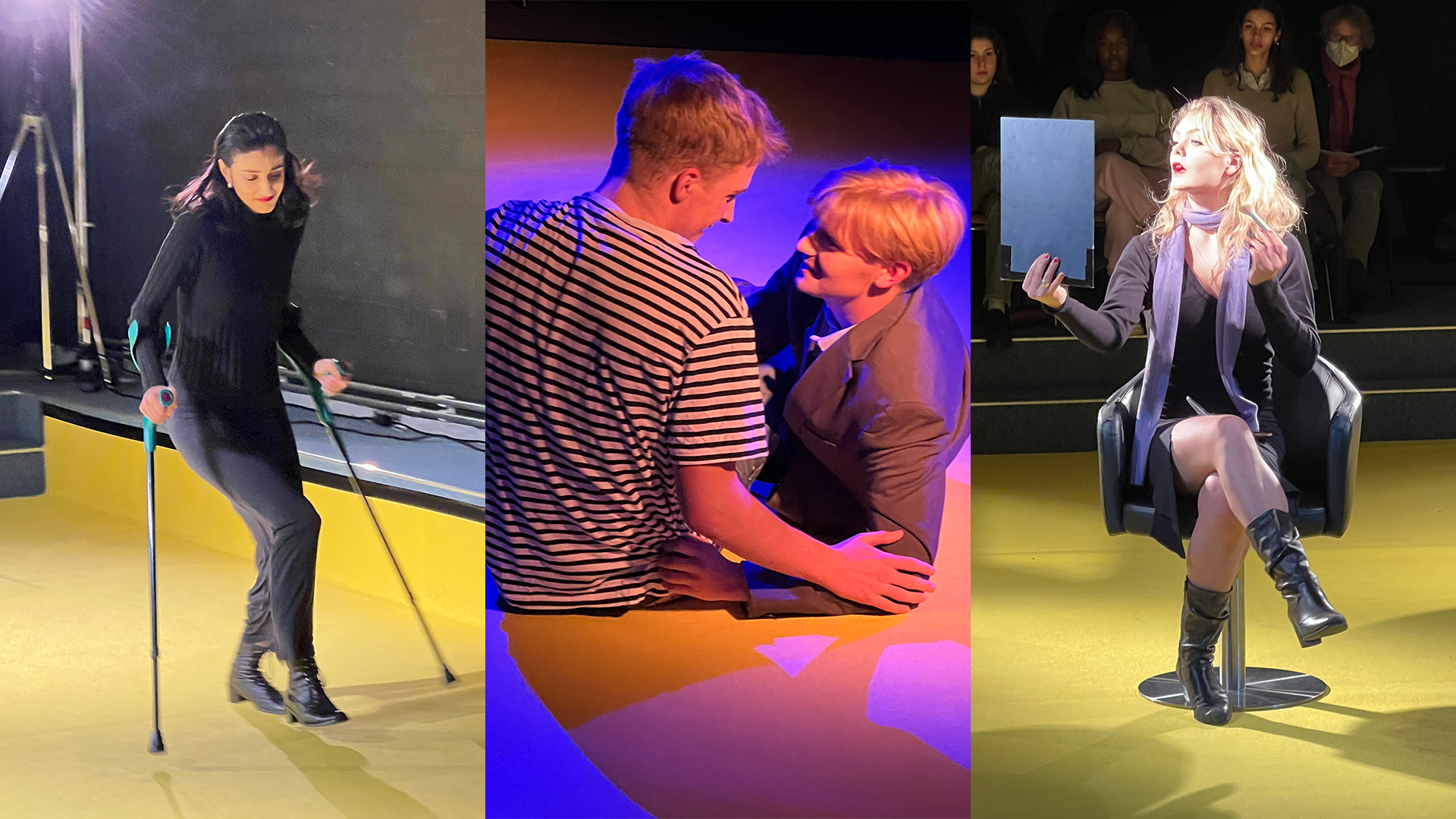
The Frankfurt project “Jukebox West Germany – Fassbinder’s Music, Personality and Influences” explored how Rainer Werner Fassbinder used music and sound in his films. Using documents from the Fassbinder Collection at the DFF Archive, film educator Barbara Dierksen and musician Uwe Dierksen worked with young participants outside of school to explore the contemporary relevance of central themes in Fassbinder’s oeuvre, such as personal dependencies, the desire to belong, societal pressures, homosexuality and classism. At the heart of the project was the participants’ exploration of sound through workshops in which they experimented with musical instruments and sound objects to compose and arrange music for their own narrative style, resulting in a 30-minute film essay presented at the DFF Archive Center in May 2023.
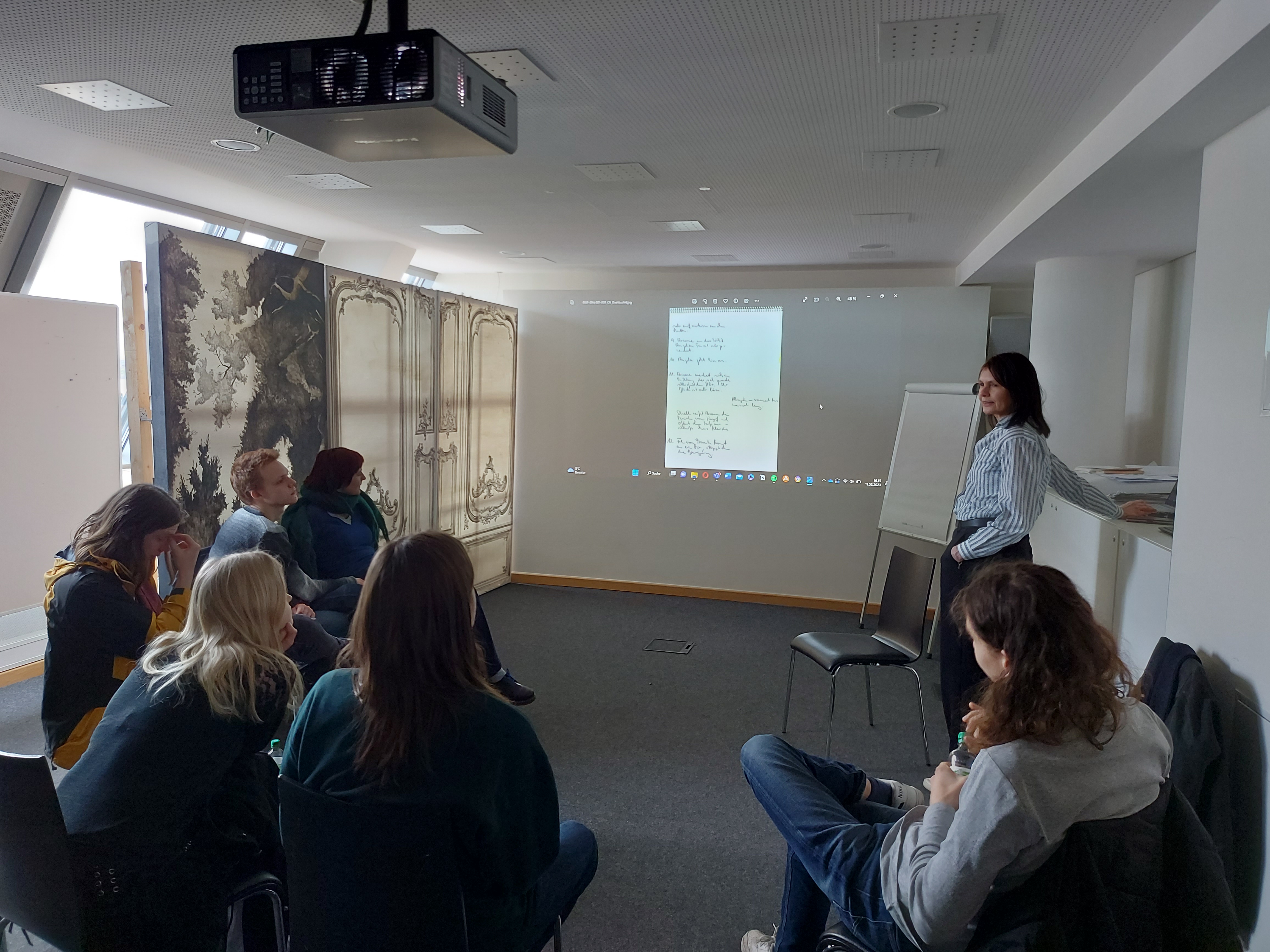
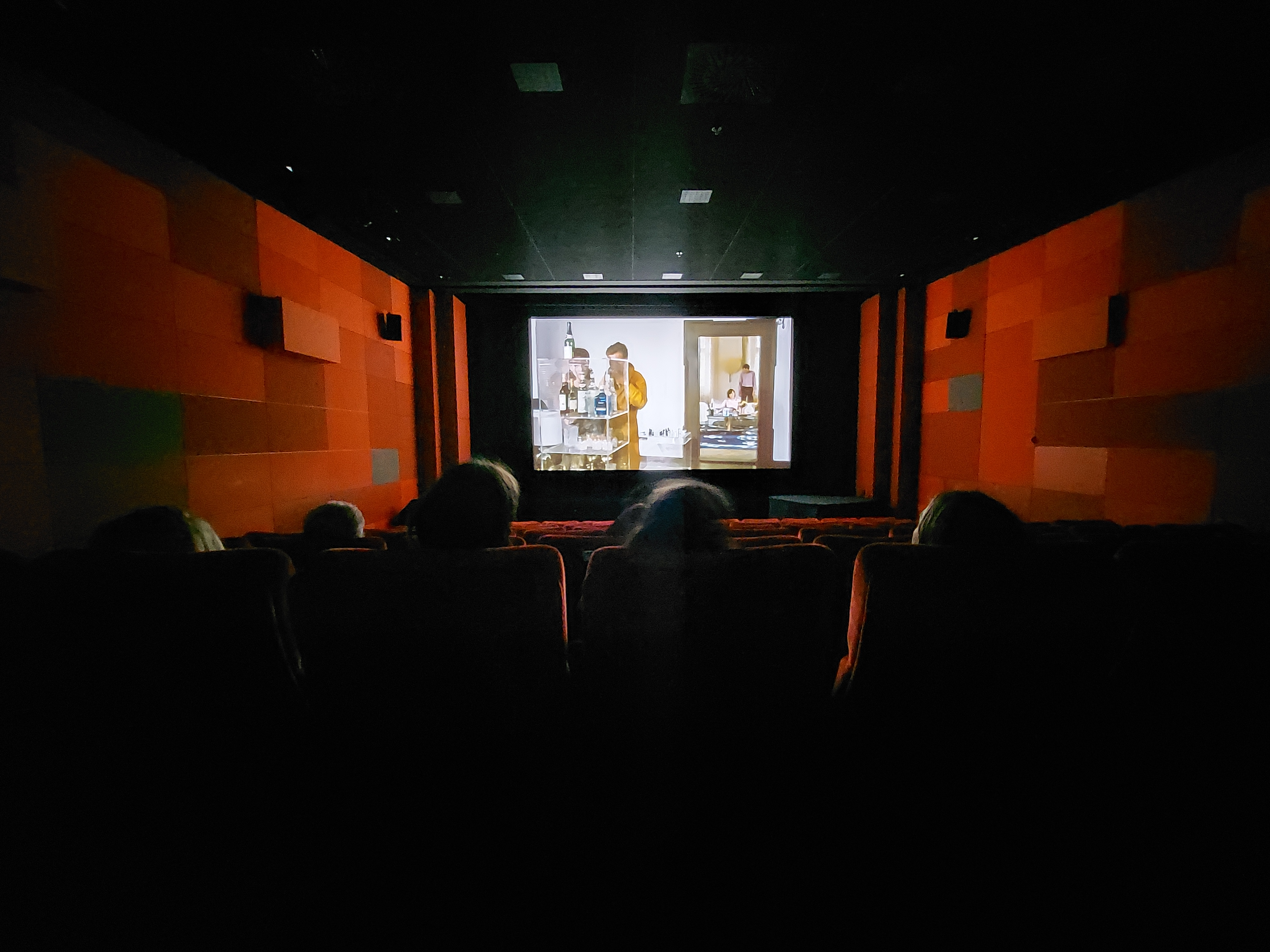
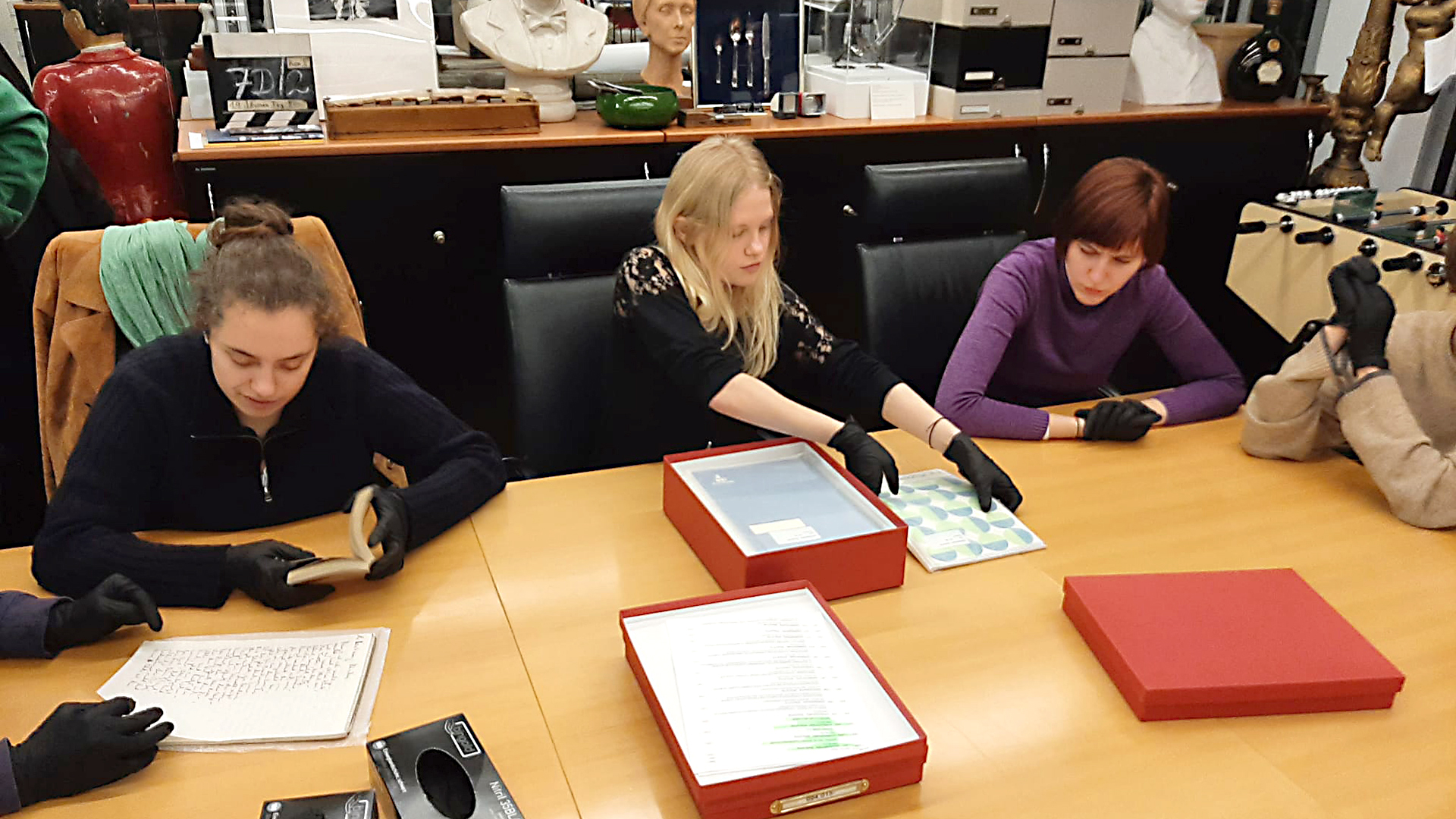
Barbara Dierksen works as a cultural manager, cultural mediator and curator and has developed concepts, exhibitions, event formats and film series for the DFF, Siemens Stiftung, Goethe Institute Munich, Kulturamt Wiesbaden, HFG Offenbach and others. She is a film and literary scholar and trained mediator. Since 2014, she has been working at the DFF in the department of film education and mediation, where she develops and realizes projects with a focus on interculturality, participation and cultural engagement.
Uwe Dierksen studied the trombone in Hanover, Hamburg and London, as well as conducting at the Mozarteum in Salzburg, Austria. Since 1983 he has been a trombonist in the Ensemble Modern (soloist ensemble for contemporary music). He has written film music, especially for silent films, as well as theater music and music for industrial films, including full-length productions such as “Welcome to American Vaudeville” at the Komische Oper Berlin, “MA(I)NHATTA” at the Frankfurt Opera, the opera “MINA” at the Frankfurt Opera, the premiere at the UFA Film Nights, as well as his most recent composition: Music for the film “Menschen am Sonntag” by Kurt Siodmak and Billie Wilder; to be broadcast on arte in May 2022, arte mediathek. In the field of music education he is a participant of several seminars with the English specialists Frazer Trainer and Paul Griffith. For the past twelve years, he has been working intensively in the field of cultural education at schools and universities in Frankfurt, within the framework of the Altana Kulturstiftung, the Polytechnische Gesellschaft and the Hessian Ministry of Higher Education, Research and the Arts.
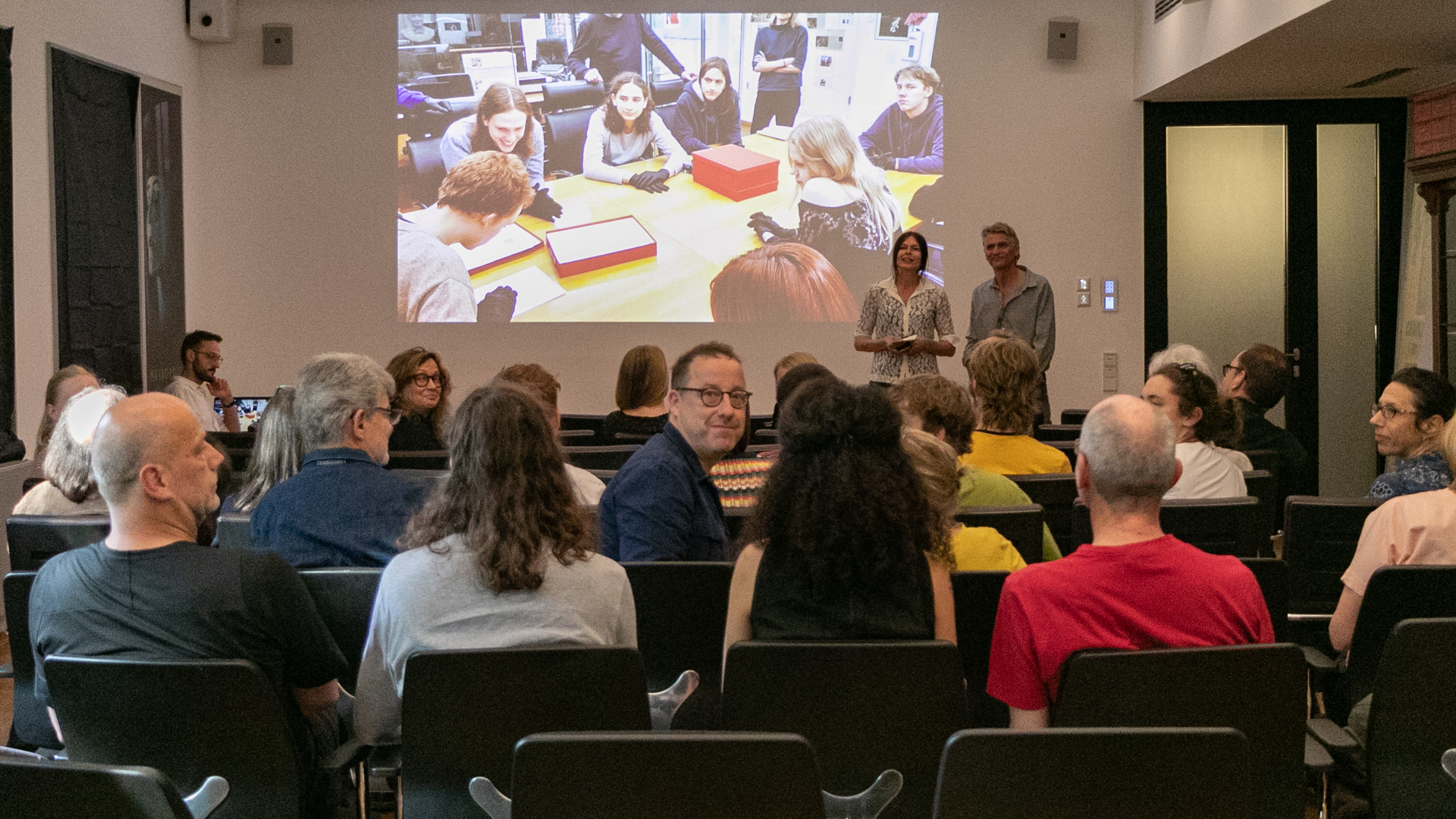
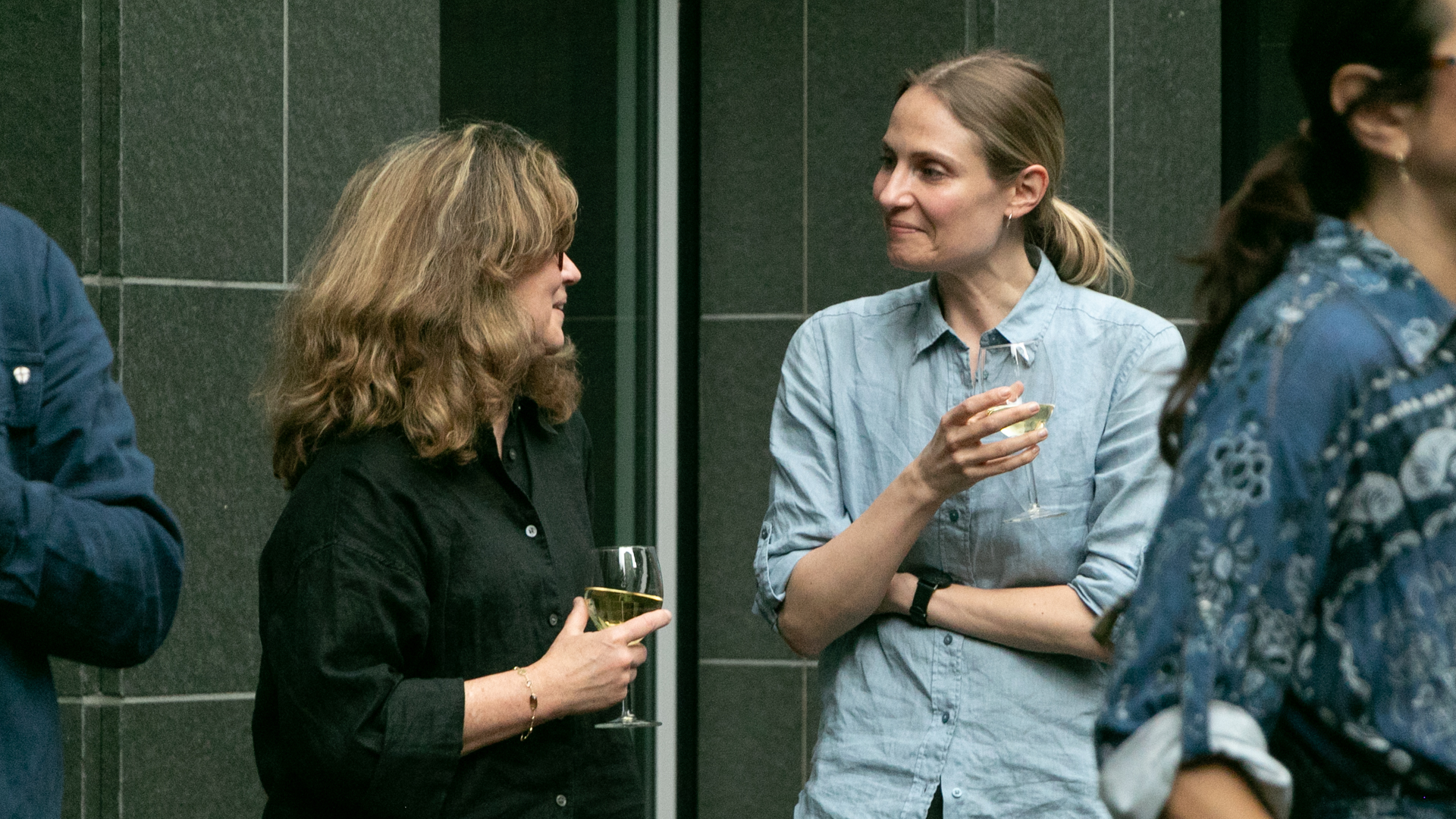
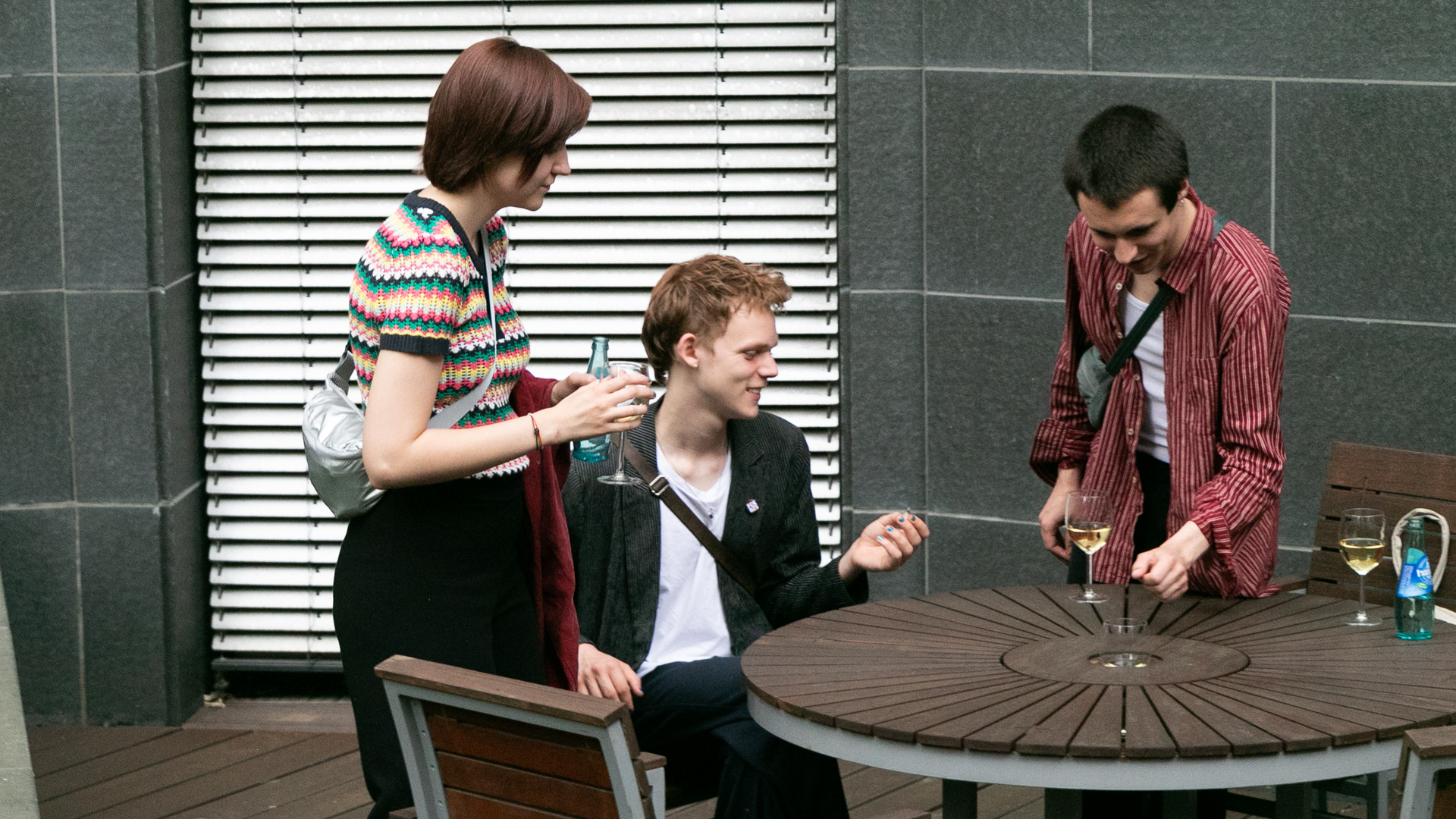
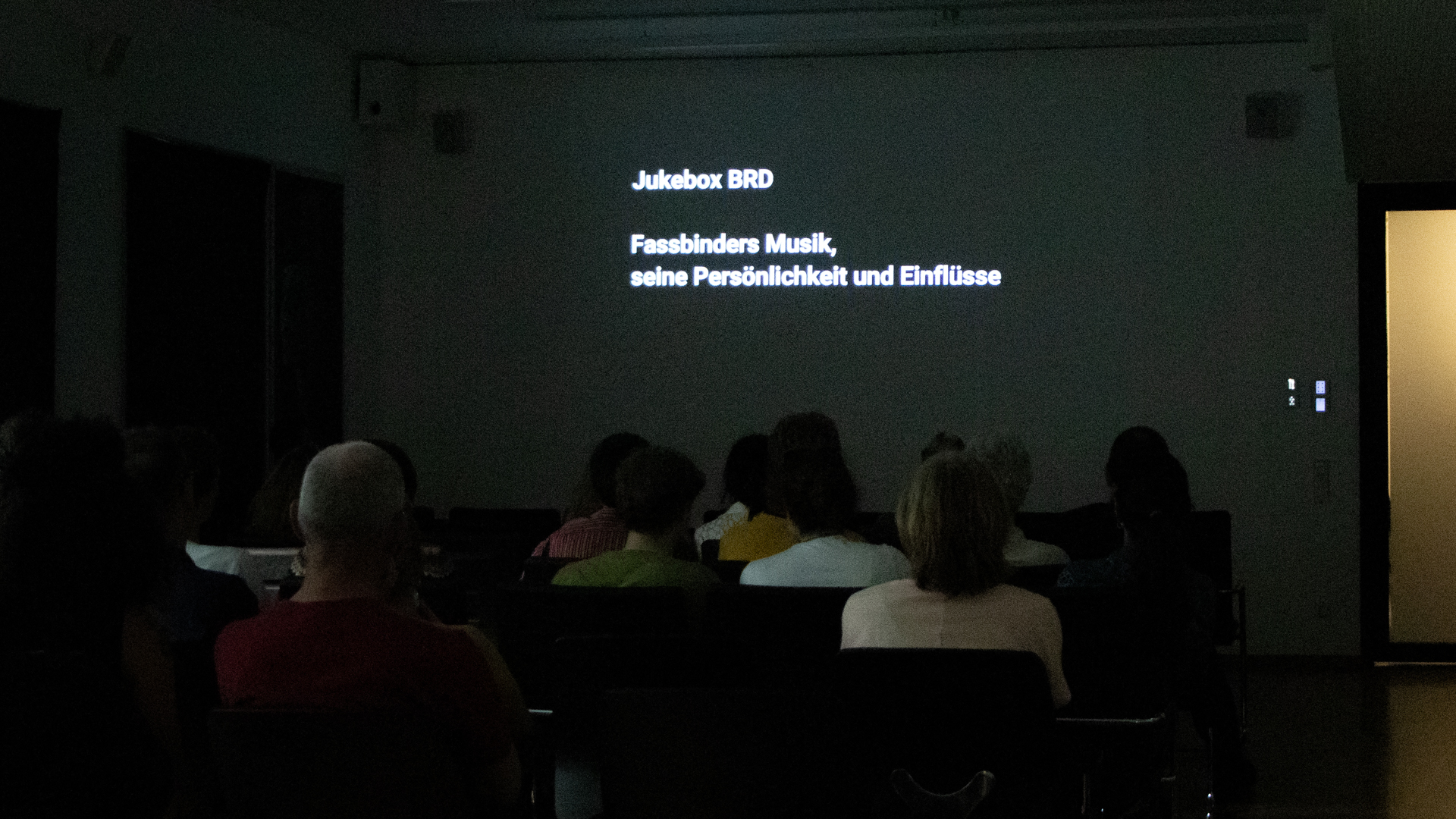
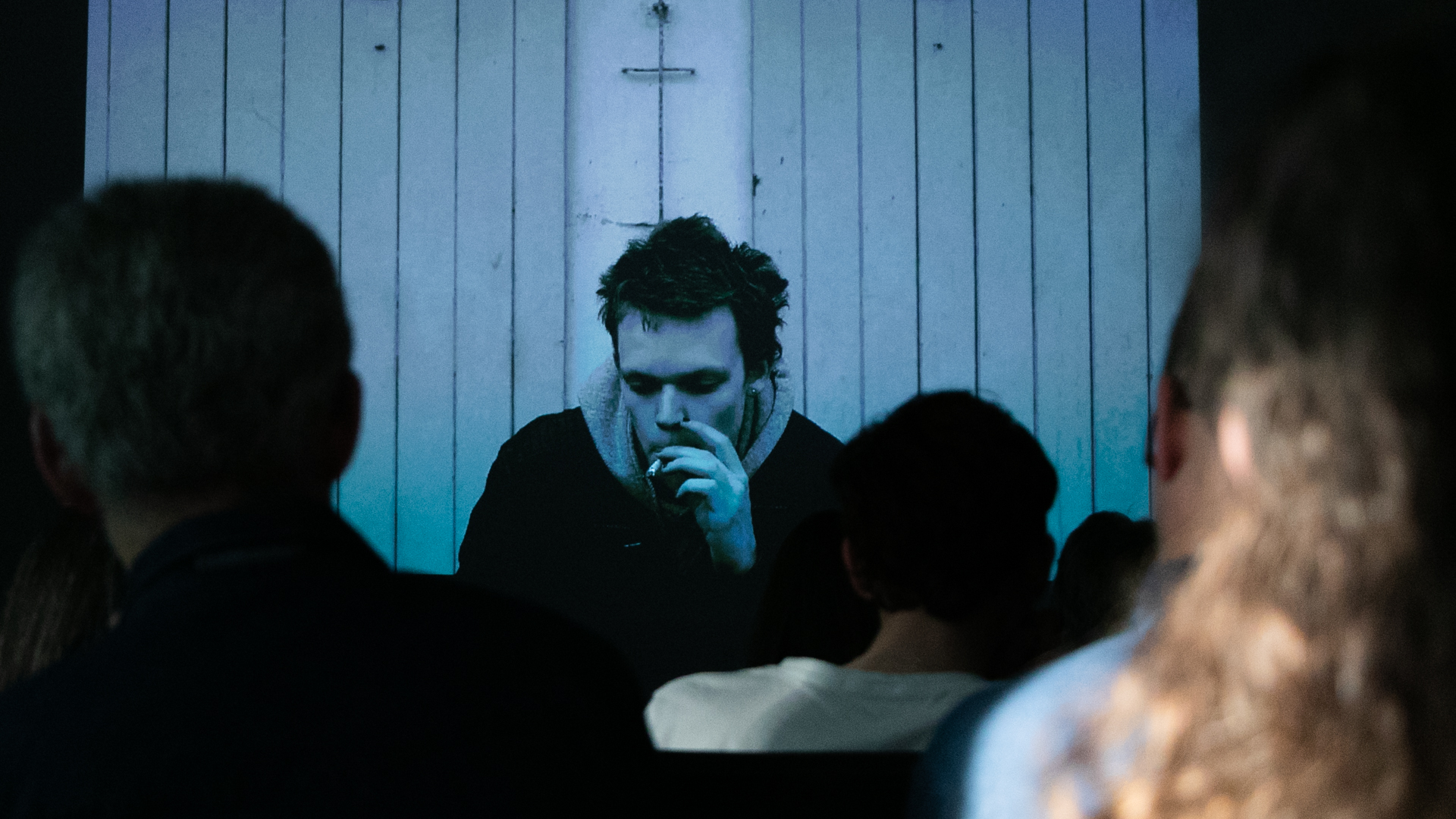
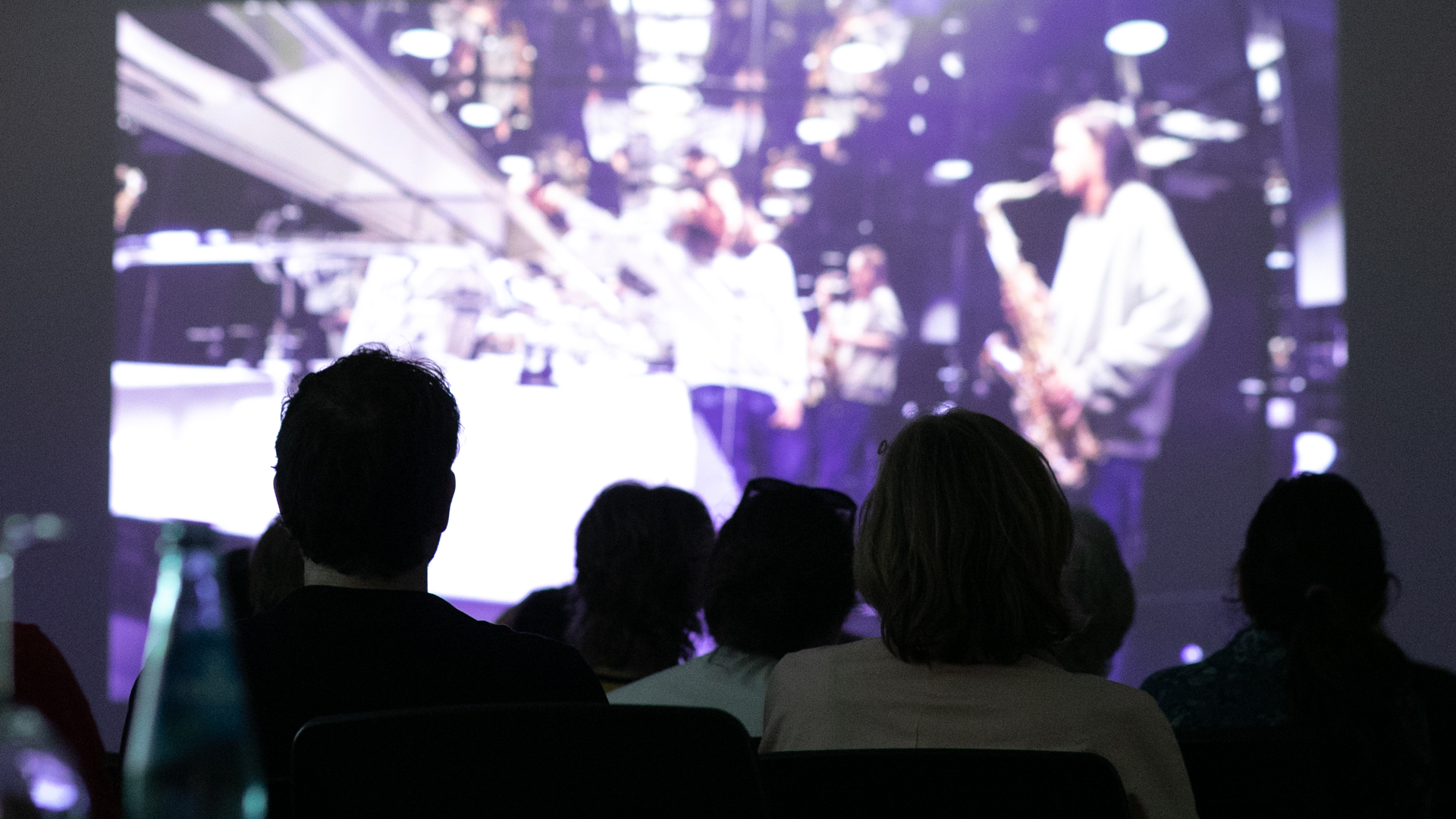
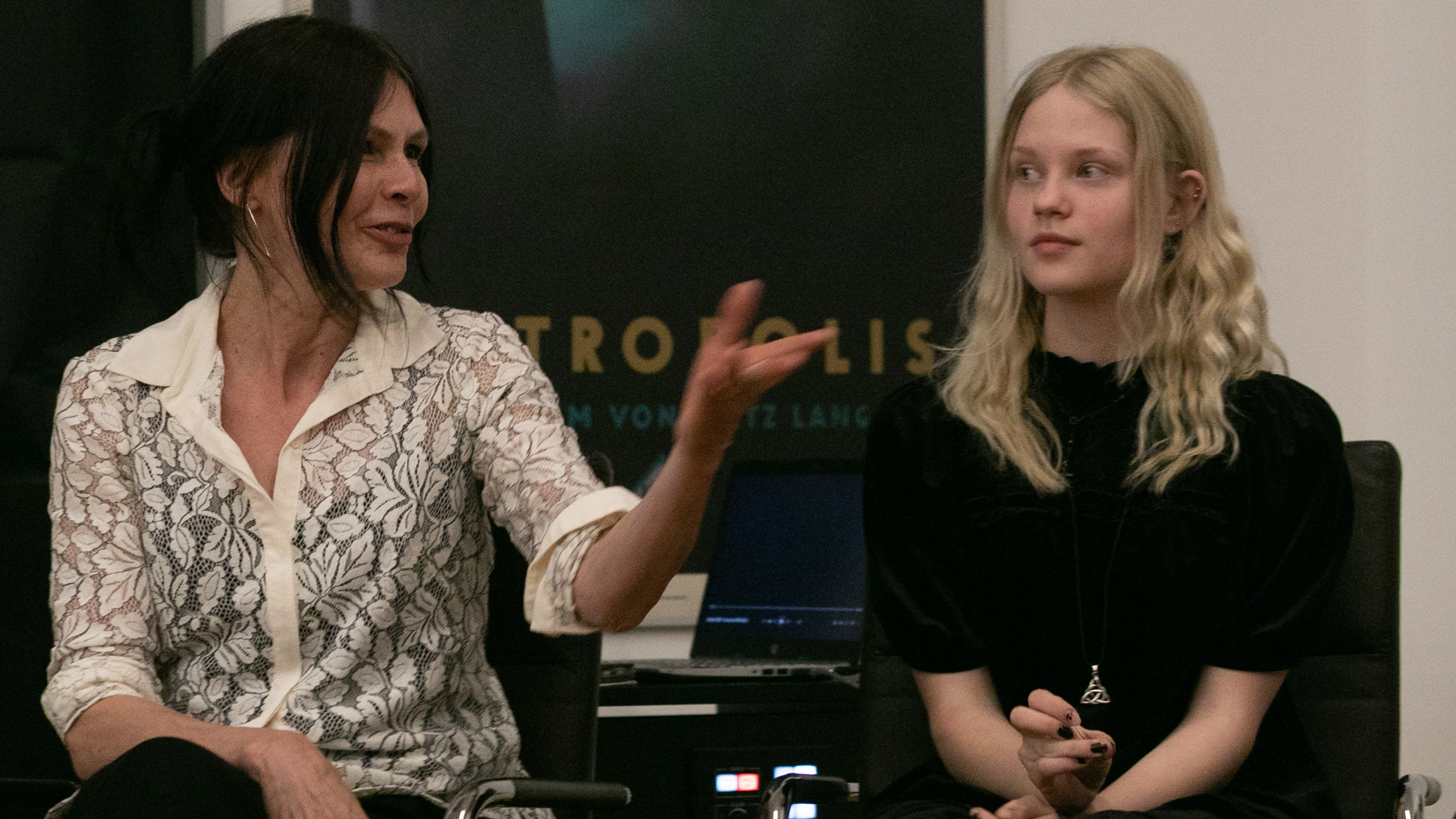
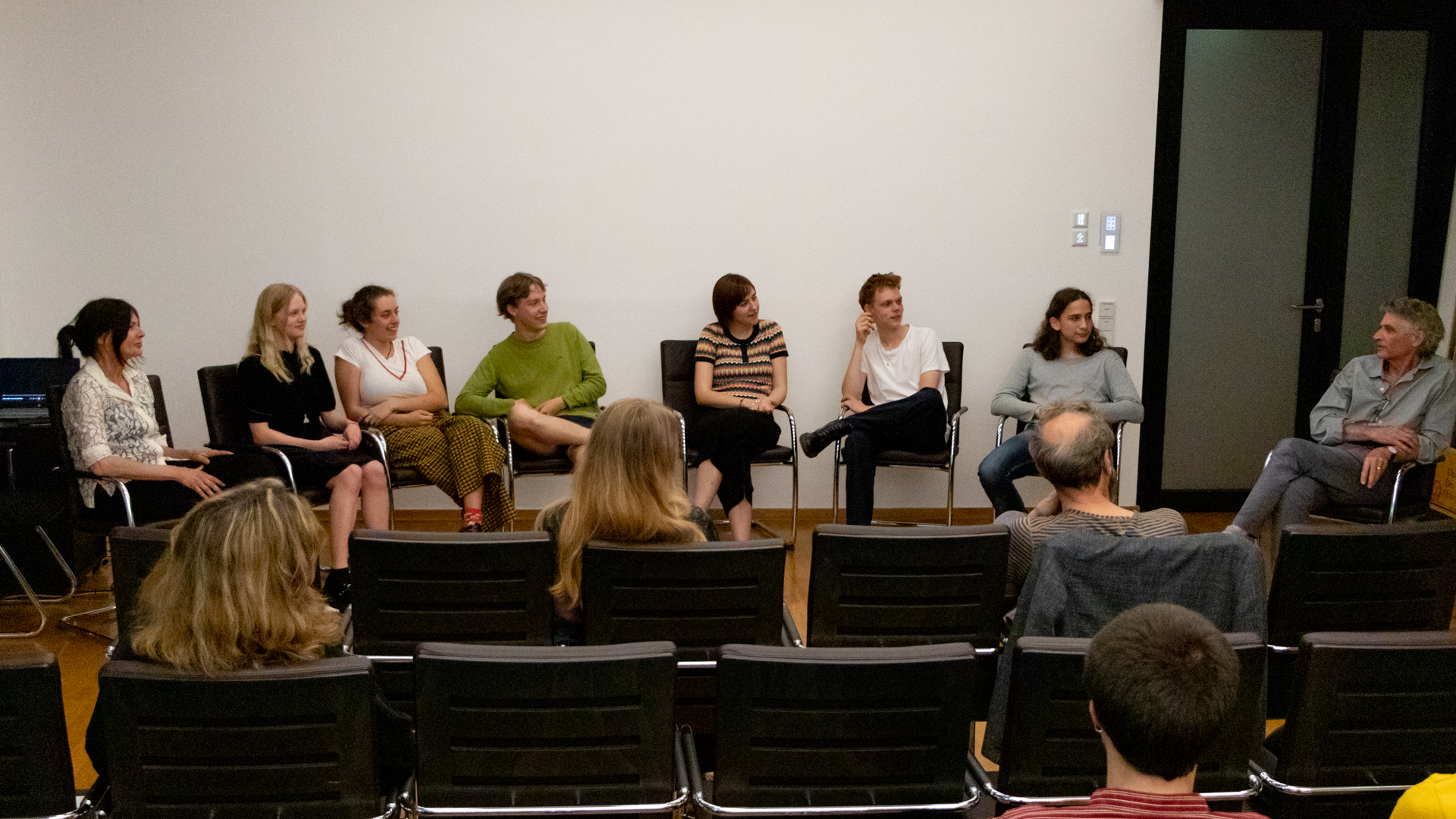
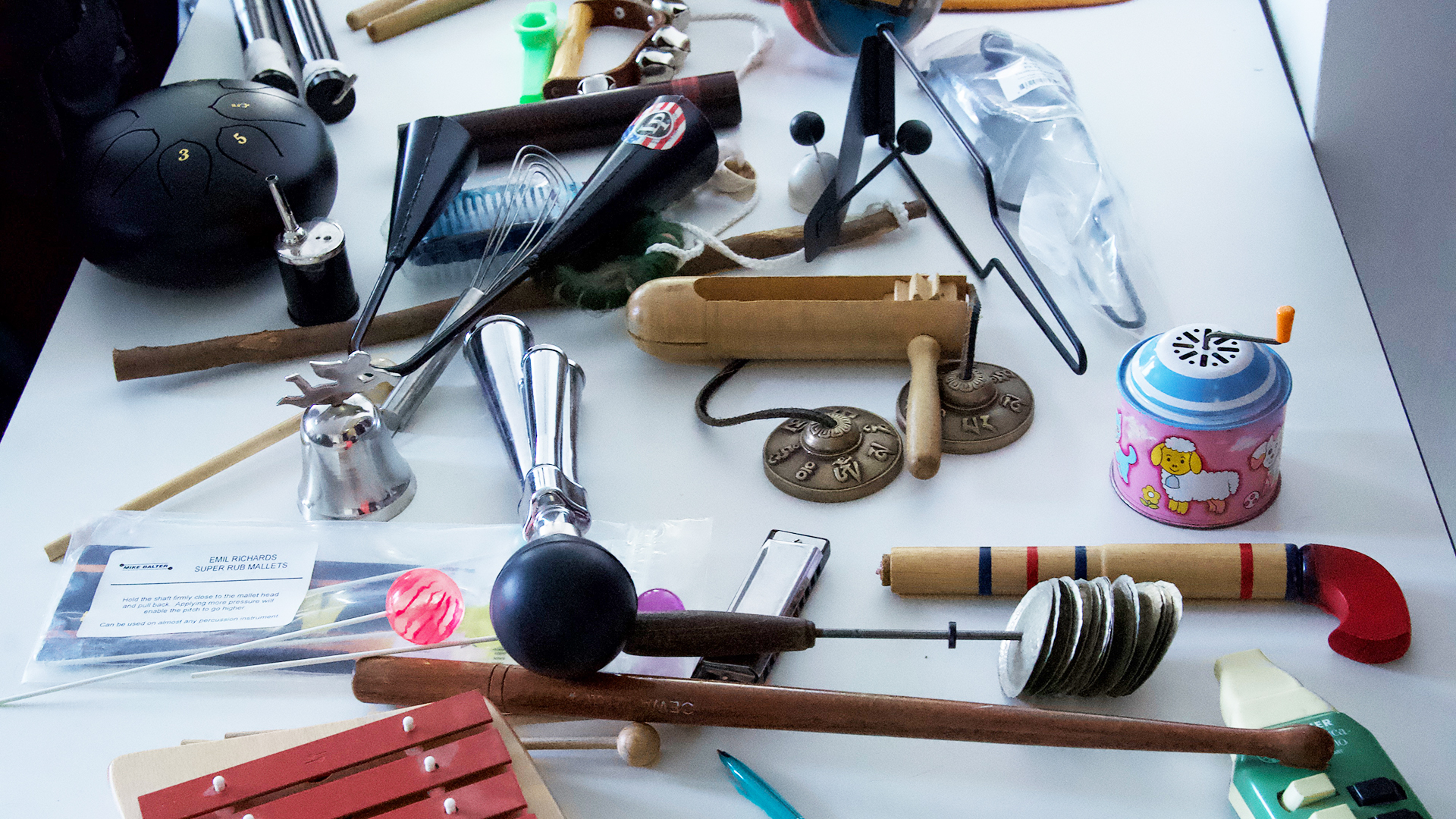
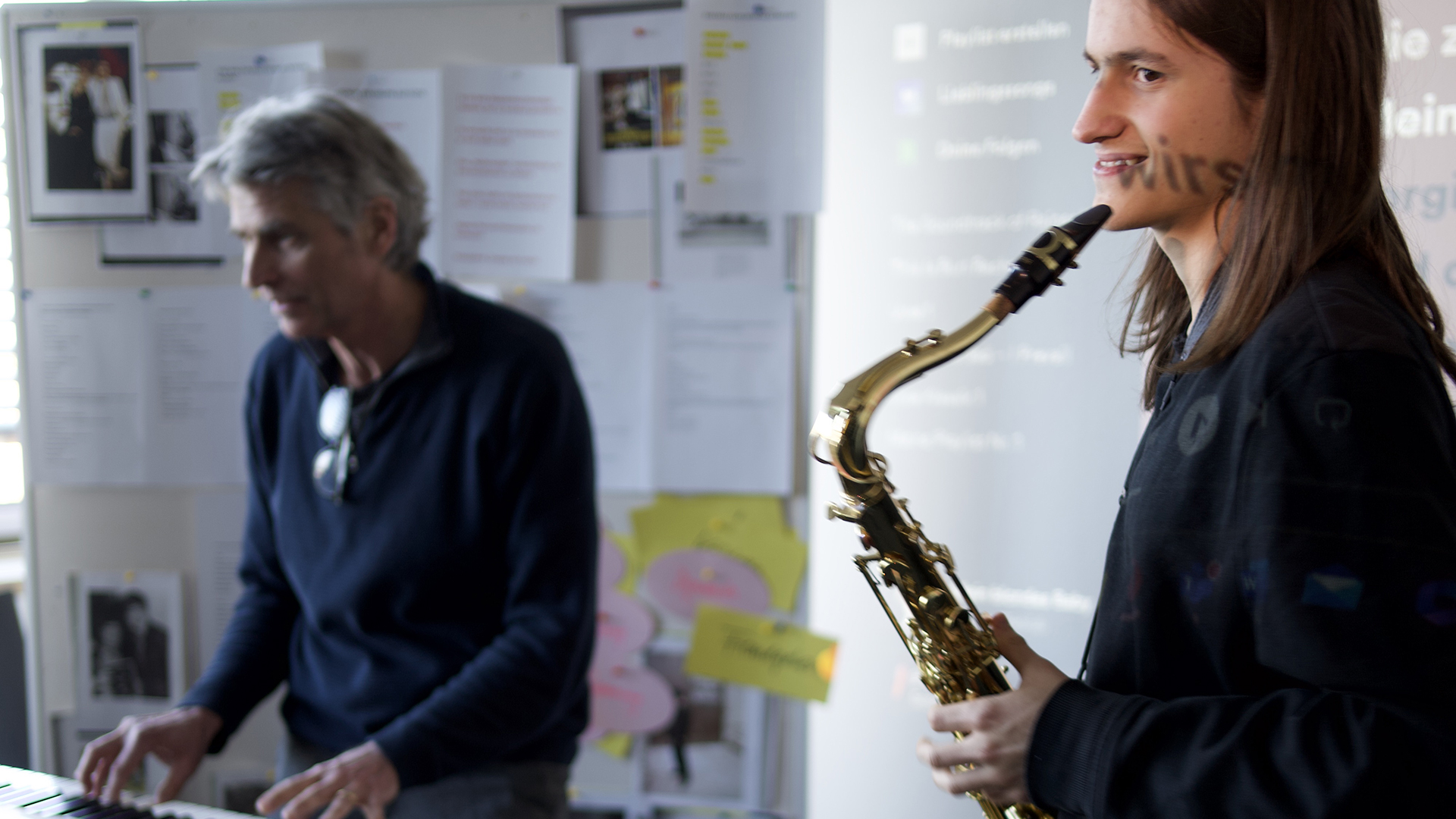
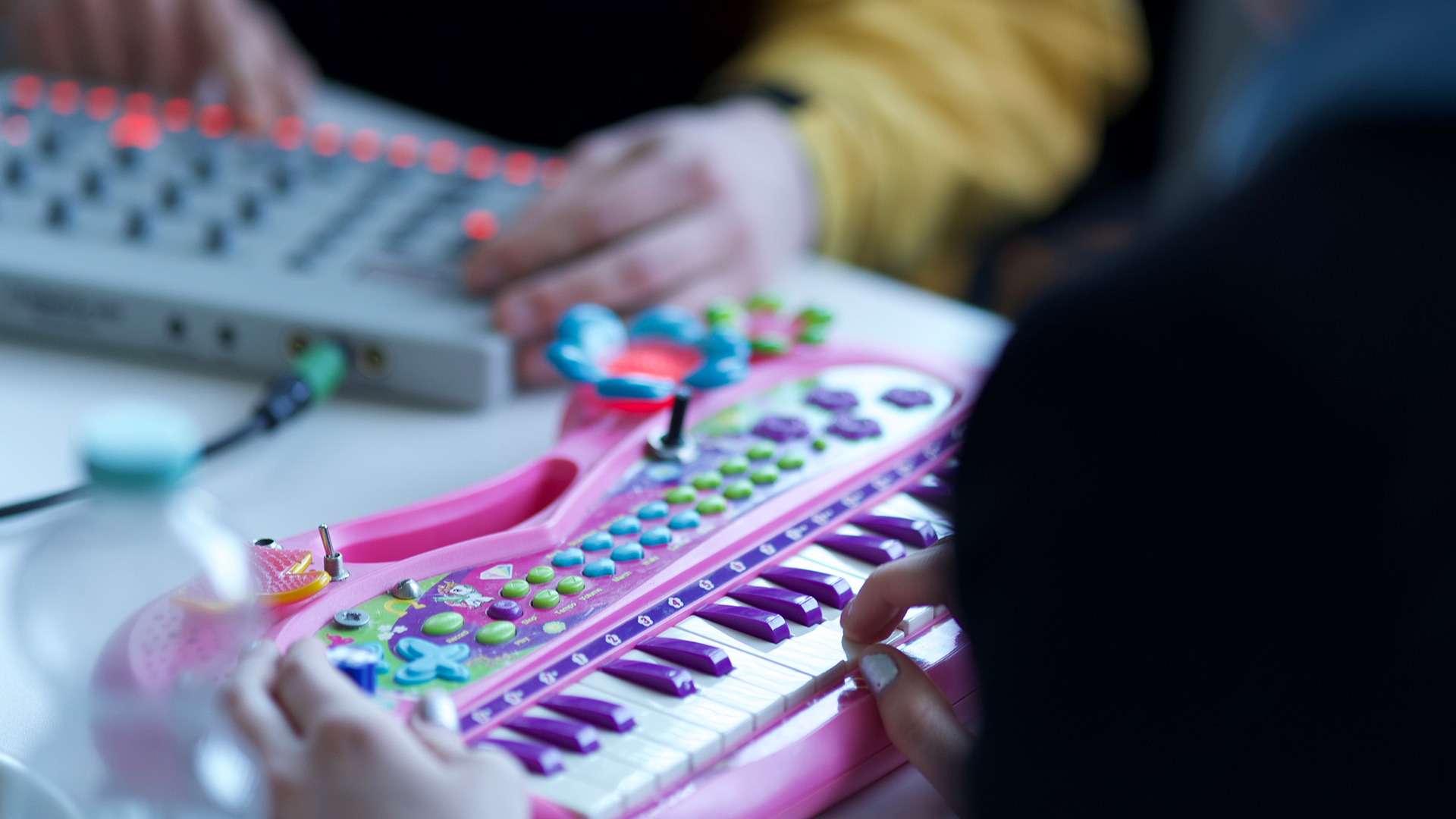
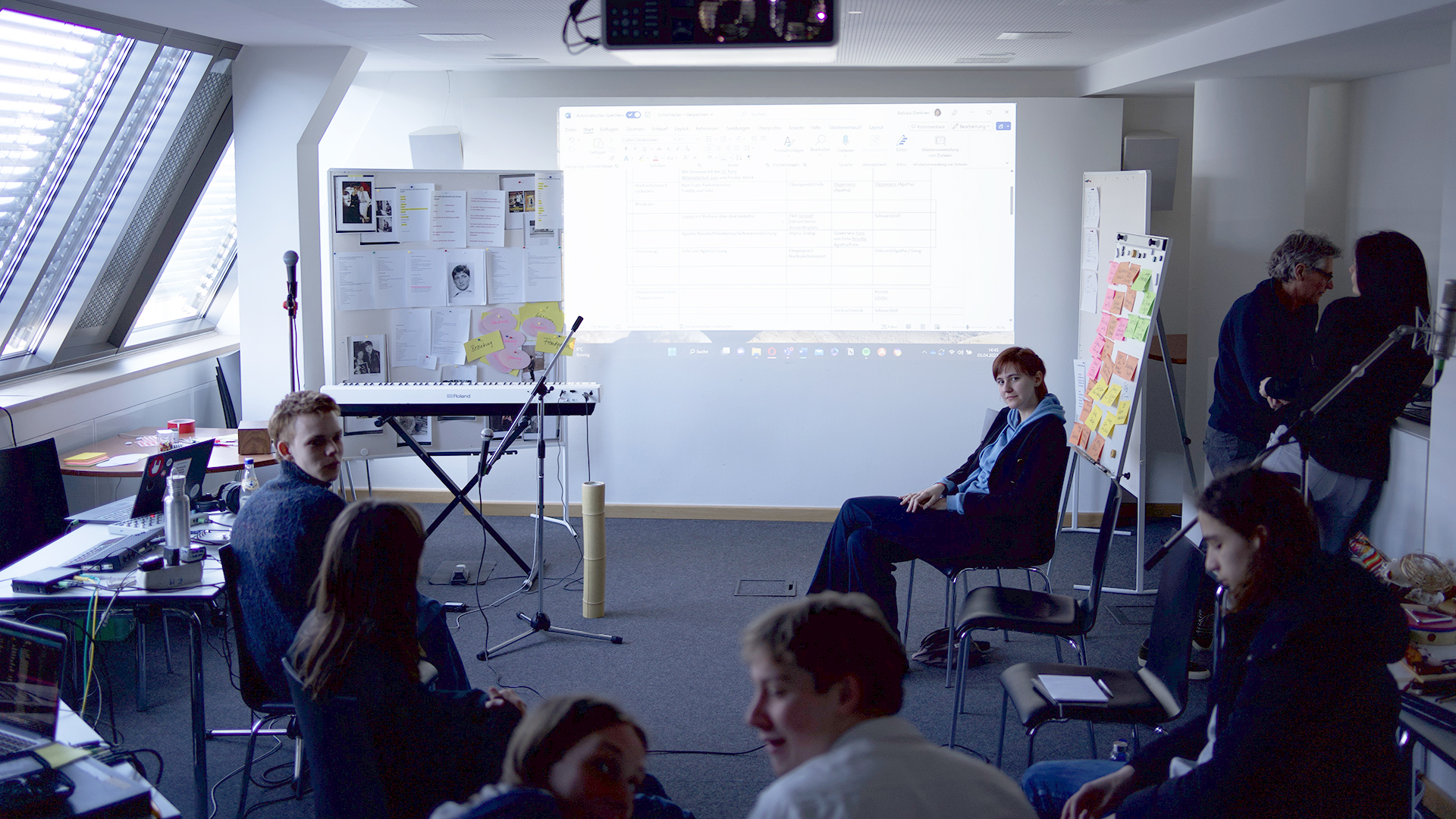

Literary scholar and film educator Nathalie Bourgeois is working with filmmaker and Sorbonne lecturer Michaël Dacheux. The Paris-based project team aims to introduce young students to Fassbinder as a person, director and actor who developed his interest in film at an early age.
The approach is based on Fassbinder’s first short film DAS KLEINE CHAOS (FRG 1967), the subsequent works ANGST ESSEN SEELE AUF (FRG 1974) and FAUSTRECHT DER FREIHEIT (FRG 1975), and the examination of problematic love relationships, social exclusion, self-images in the context of family and society as contradictory themes that are dealt with in Fassbinder’s films and still have great relevance, especially for young people. The facilitators will then focus on Fassbinder’s unique working and creative methods, using film sequences, scripts, set photos and other original material from the archive. In further workshops, the young people develop their own film sequences step by step, from script to shooting to editing, in which they contrast Fassbinder’s work with their own views and finally discuss it.
After graduating in literature, Nathalie Bourgeois worked on film sets and for Avant-scène cinéma, then for the Cinémathèque française, where she created an educational department. Since its inception in 1995, she has directed the international film education program “Le Cinéma, cent ans de jeunesse” (The Cinema, 100 Years of Youth) in collaboration with Alain Bergala as artistic advisor and numerous cultural partners. She is also involved in the pedagogical direction of the project “Exploring CCAJ” for the DFF. Nathalie has participated in the coordination and writing of books on cinema, notably the Atelier Cinéma collection for children and young people (Cinémathèque française and Actes sud Jr). She is a lecturer in the Master’s Degree in Didactics of the Image at the University Sorbonne Nouvelle-Paris 3 and a pedagogical consultant for the educational program of the European cinema CinEd.
Michaël Dacheux grew up in Mont-de-Marsan in the Landes in the 1980s. After studying film and working as an assistant on various shoots, he made his first feature-length film, Commune présence, in 2008, which was selected for the Marseille FID. For his next film, a medium-length feature produced by Bathysphere Productions, he returns to his hometown to measure the passage of time. The film won prizes in Brive and at the Chéries-Chéris festival. Then “L’Amour debout”, the first feature film shot one weekend a month for a year, produced by Perspective Films and supported by the Film en cours prize of the Belfort Festival. The film was presented at the Cannes Film Festival at ACID, was released in January 2019 and has been screened at various festivals (Ghent, Porto, New York, Palermo…). Michaël Dacheux is also involved in various film education projects, notably “Cinema, cent ans de jeunesse”, and teaches at the Universities of Paris 7 and Paris 8.
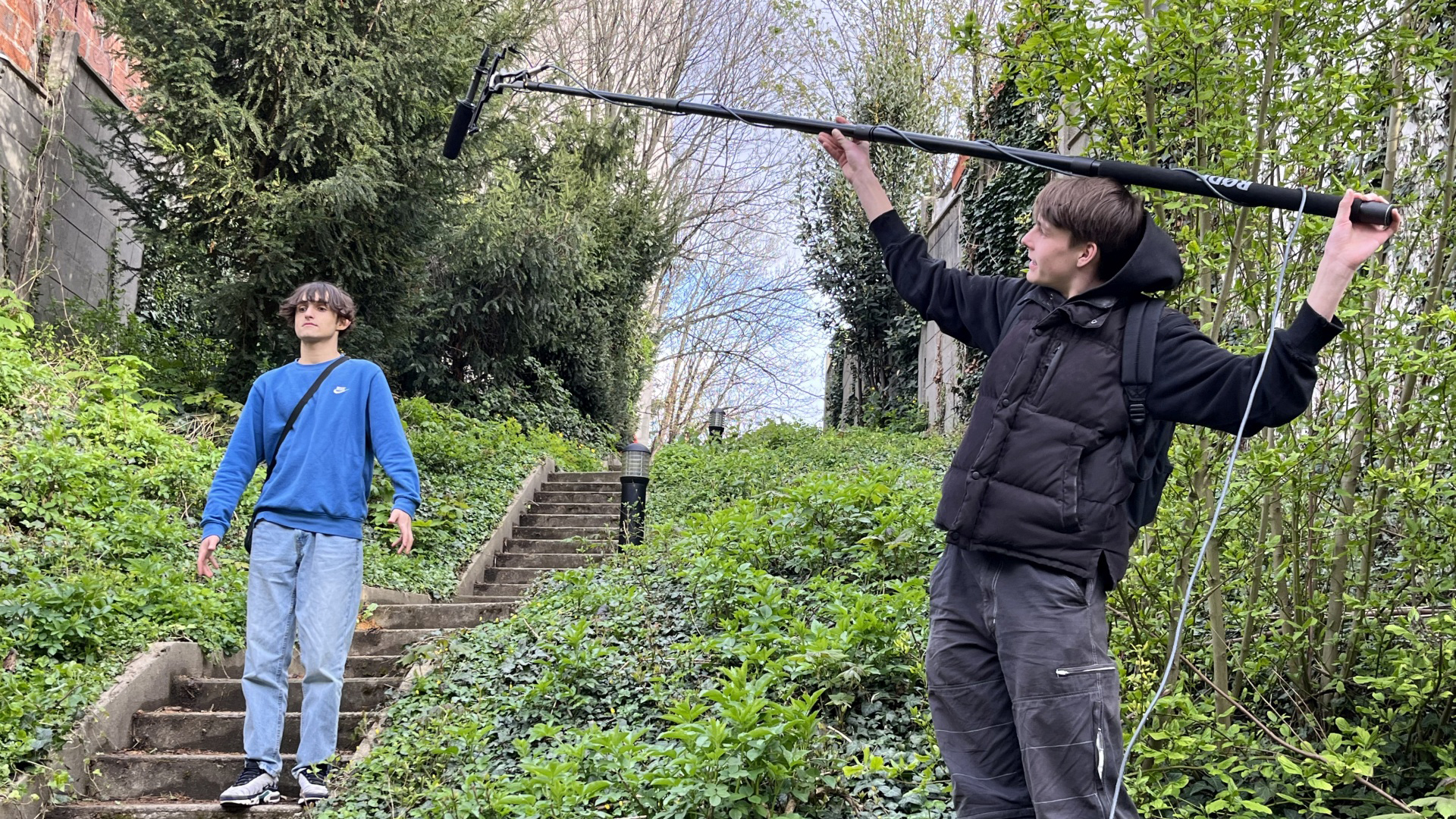
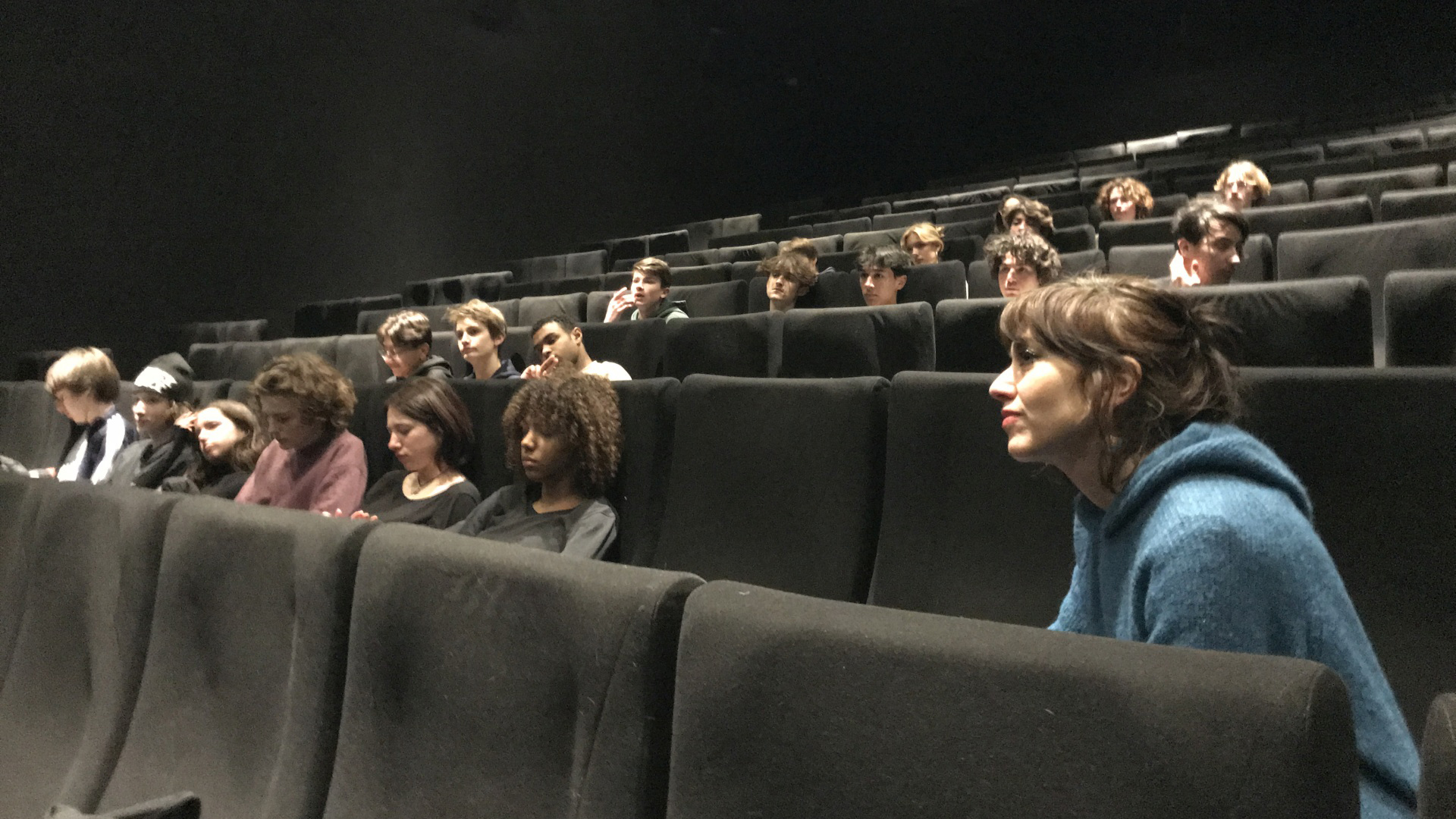
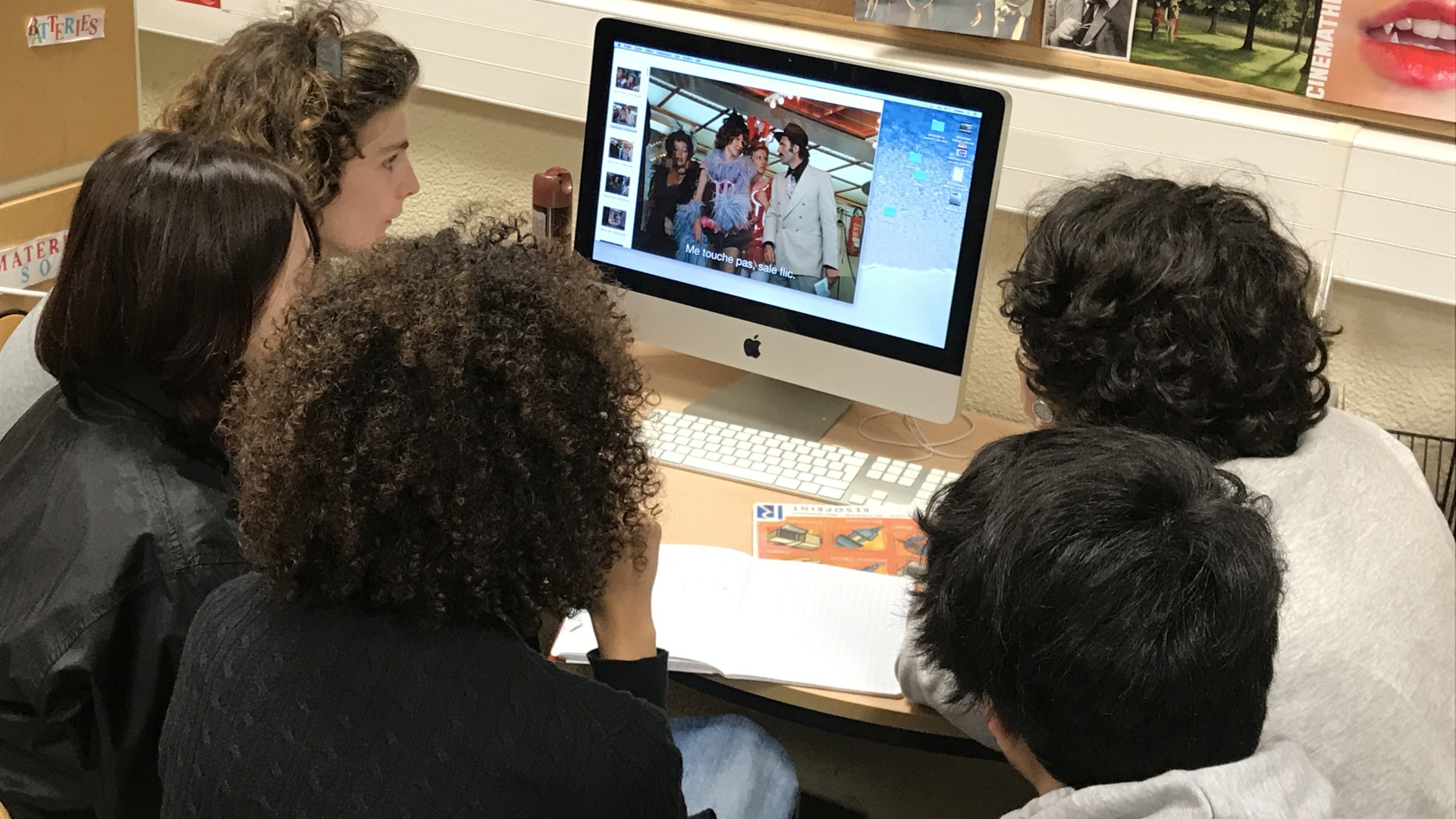
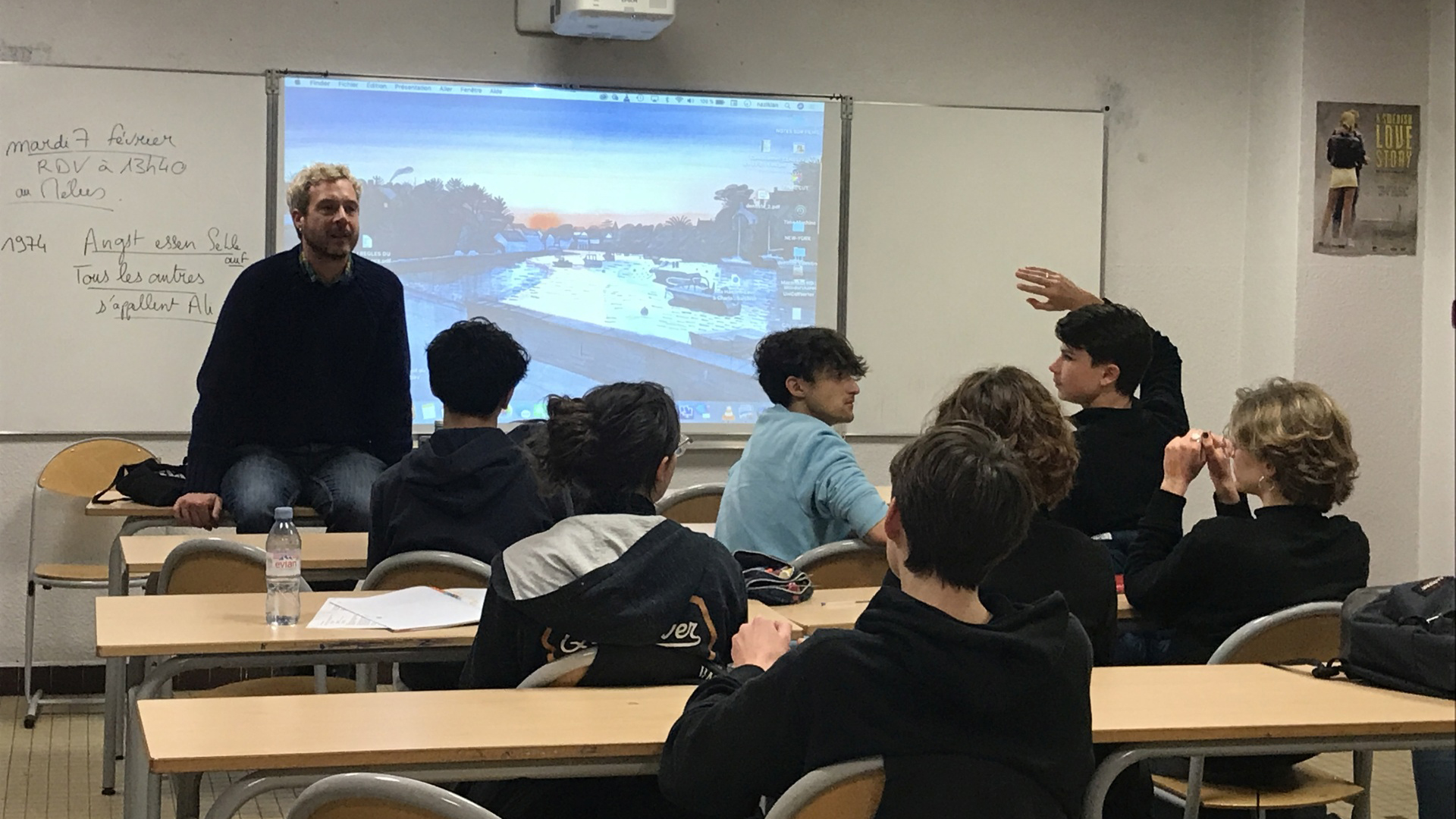
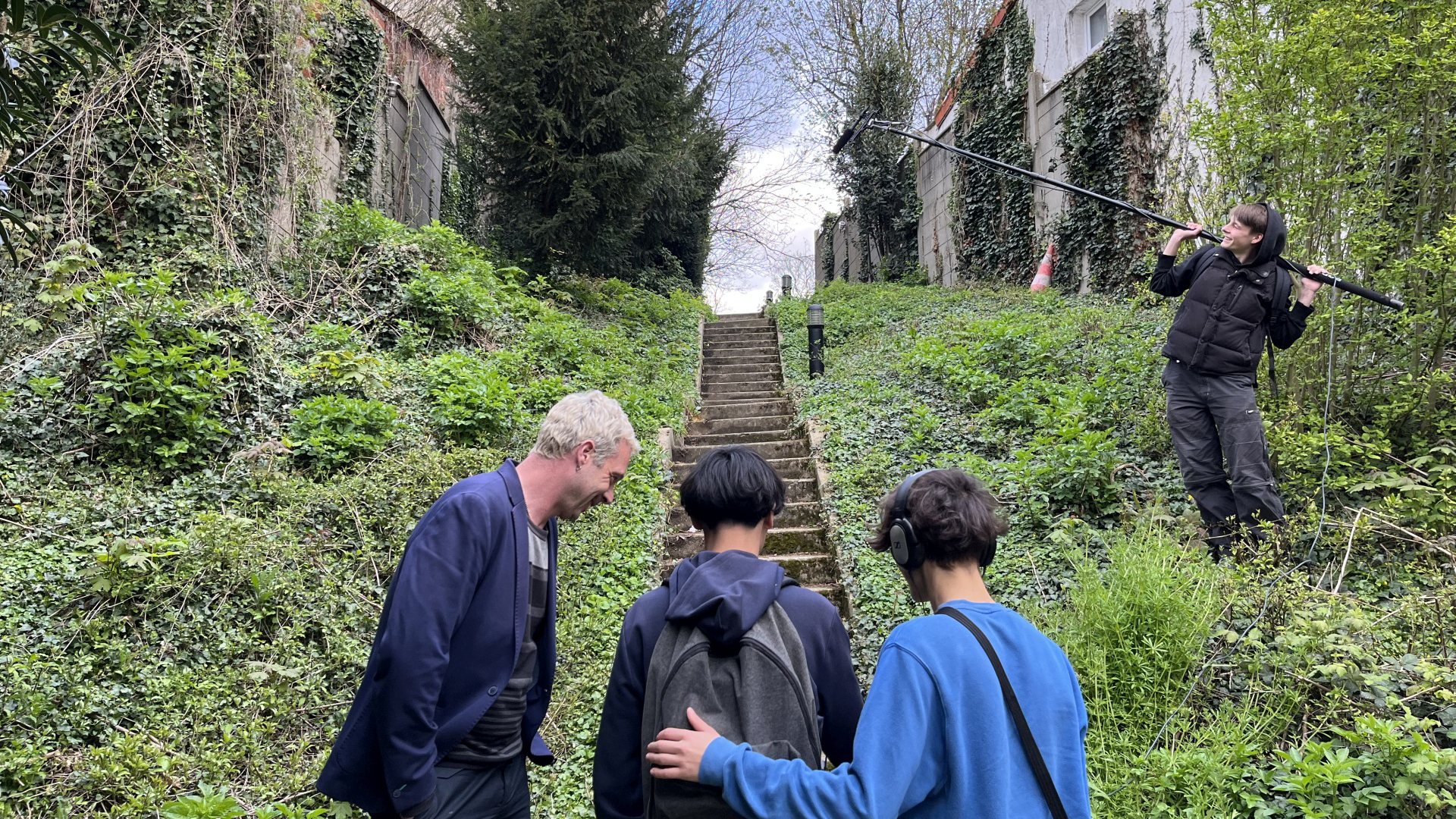
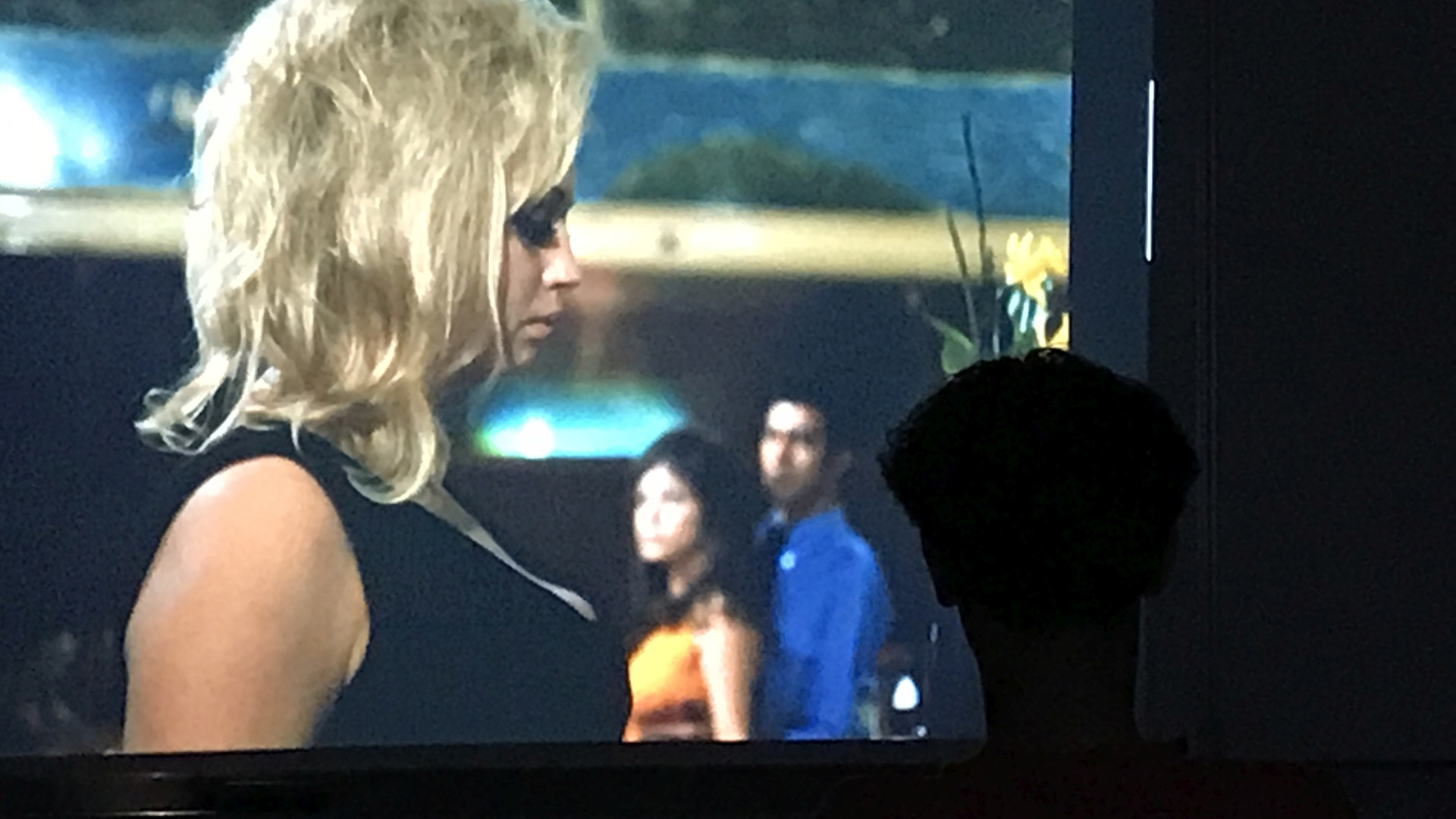
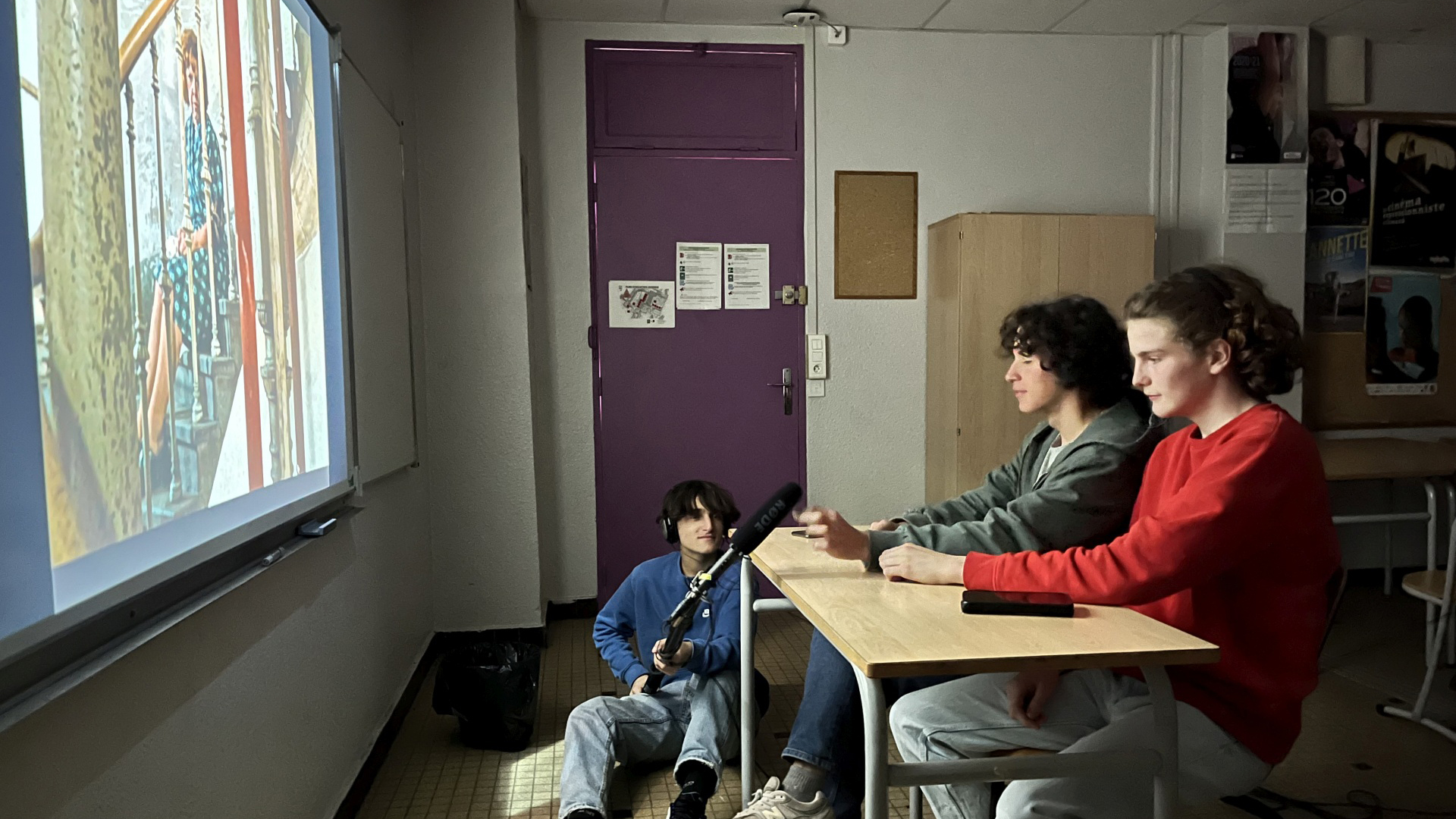
The Viennese project team conducted extensive research on Fassbinder’s television series 8 HOURS ARE NOT A DAY and developed a school project from their findings. It was realized in the first semester of 2022/23 with a class of the WMS/RG/ORG Antonkriegergasse.
For film worker Alejandro Bachmann, filmmaker Alex Gerbaulet and film facilitator Stefan Huber, 8 HOURS ARE NOT A DAY was chosen for several reasons. It was the first of several attempts by Fassbinder to work in the serial format for television, borrowing from the existing family serial format. Accompanied by widespread controversy at the time, the unfinished series is particularly interesting in the Viennese context, since the working-class culture central to it has played a major role in Vienna’s political and social reality, especially since the 1920s, and to some extent still does today. The series format, which is currently popular especially among young people, created an awareness within the project group of the historicity of the series format and the bringing together of the present and the past in the process of viewing.
In weekly meetings, the students watched the episodes, first freely engaging with the group’s viewing experience and then relating their own perspectives and thoughts to the historical reception. In the following part of the project, the students focused on other Fassbinder formats and his characteristic creative process from idea to film. Finally, the students created their own creative works. They developed lookbooks, storyboards, their own scenes, and ideas for staging them, in response to the question of how the prematurely canceled series could have been continued in today’s context.
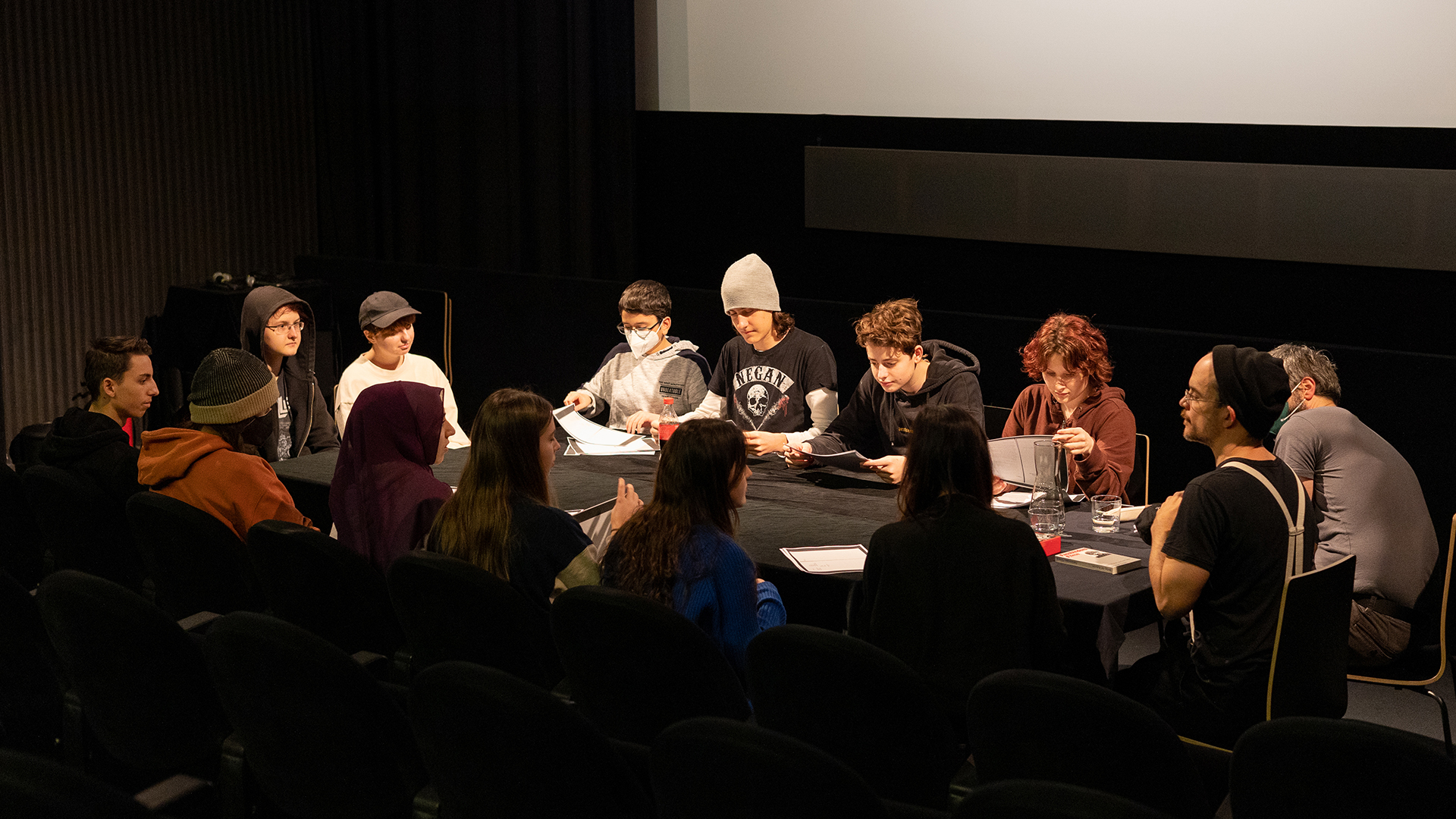
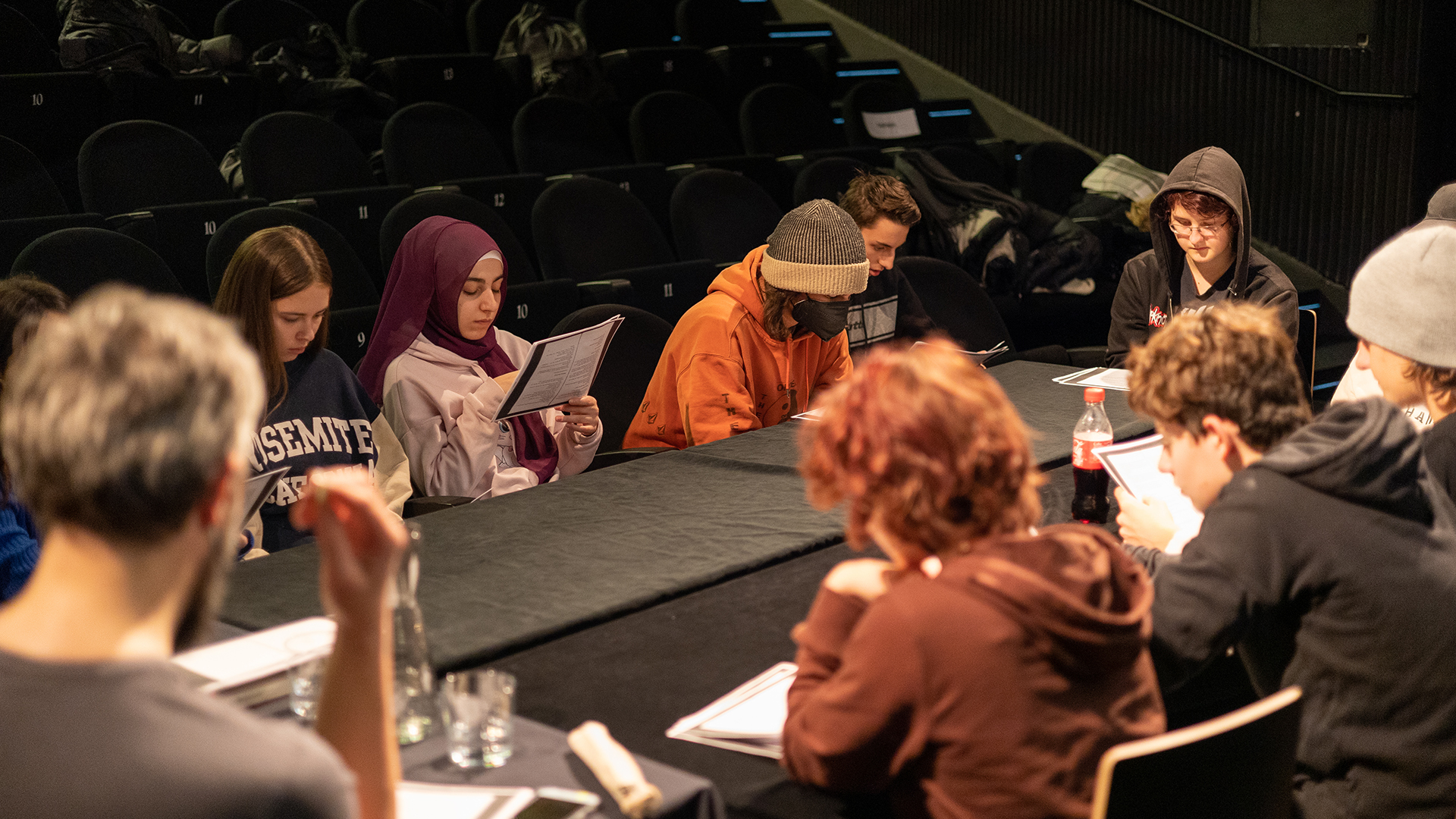
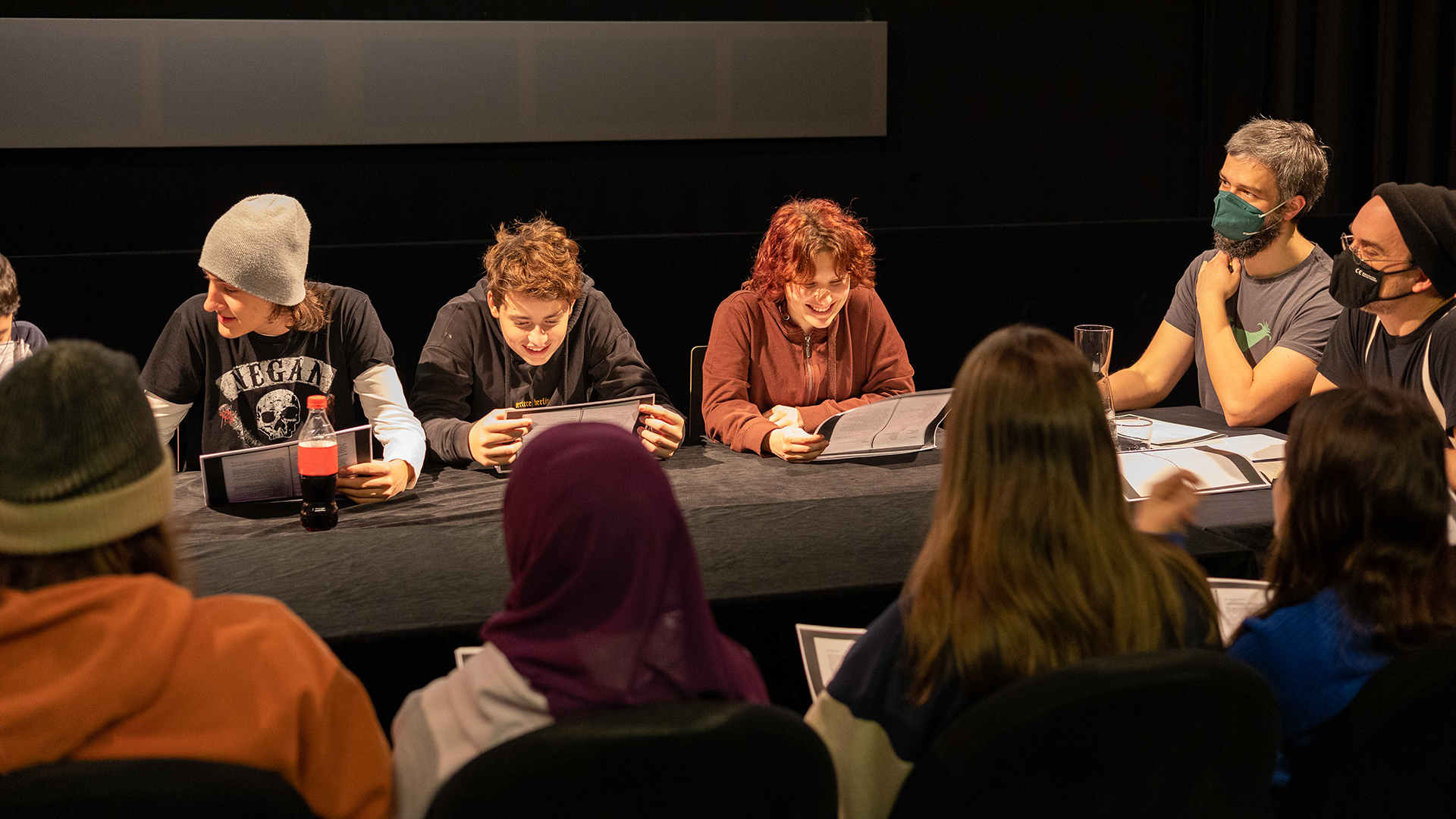
Alejandro Bachmann is a film worker with a focus on mediation and writing about film as well as compiling film programs. 2010-2019 Research Assistant, later Head of the Department “Mediation, Research and Publications” at the Austrian Film Museum. Mentor of the Berlinale Talents Short Film Station. Since April 2021 Visiting Professor for Film History and Media Theory at the Academy of Media Arts Cologne.
Alex Gerbaulet lives in Berlin and works as a filmmaker, producer and film educator. Her artistic works oscillate between documentary style and essay, activist impulses and fictionalized reflection. They explore, among other things, the representability of reality and memory. Her current films, some of which have won several awards, include SCHICHT (2015), DIE SCHLÄFERIN (2018), as well as TIEFENSCHÄRFE (2017) and SONNE UNTER TAGE (2022), both made together with Mareike Bernien. She has many years of teaching experience in Germany and abroad and is a regular curator for film festivals such as the Kassel Dokfest, the European Media Art Festival Osnabrück and the Duisburg Film Week. In 2020-21 she was a fellow of the Berlin support program Künstlerische Forschung/gkfd. Since 2014 she is part of the production platform pong film in Berlin and took over the management together with Caroline Kirberg in 2022.
Stefan Huber studied German in Vienna and Barcelona. From 2002 to 2006 he created the program “filmfilter” on Orange 94.0, the free radio station in Vienna. Since 2001 he has been reporting regularly from Austrian film festivals. Since 2012, mediation events at the Austrian Film Museum, since 2013 employed as film mediator, since 2019 head of department. Current focus: intercultural film education; film education for children aged 3-6. Various activities as jury member and moderator.
During the upcoming spring and fall semesters, students of film studies at the University of Zurich will have the opportunity to do a curatorial approach to Fassbinder’s work together with film educator Stefanie Schlüter.
Stefanie Schlüter’s aim is to encourage students to develop their own interests in Fassbinder’s cinematic oeuvre and to take a fresh and critical look at how it is related to the work of contemporary filmmakers. “The point is not to circle around the monolith that is Fassbinder, or to put him alone in the center, but I would find it very interesting to look for positions that complement or contradict him. The series should not only be an affirmation of Fassbinder’s work, but also an opportunity to push him against the grain. I imagine that Fassbinder can be confronted with the positions of female directors. Or that he can be complemented by other queer positions,” says Stefanie Schlüter, describing her approach to mediation.
In the fall semester of 2023, the students will have the task of presenting their spring film series to the public at the Zurich movie theater FILMPODIUM.
Stefanie Schlüter is a film mediator and researcher based in Zurich and Berlin. Her work focuses on the mediation of experimental and artists’ films as well as curating from the archive. She has a long-standing collaboration with Arsenal – Institute for Film and Video Art, for which she has developed and implemented mediation concepts. Since 2016 she has been organizing the film series “Großes Kino, Kleines Kino” together with the filmmakers of the group “Arsenal Filmatelier”. As part of the project “Living Archive -Archive Work as an Artistic and Curatorial Practice of the Present” she conducted a participatory mediation project in the Arsenal Archive in 2011-2013. In 2007-2009 she worked on the independent research project “Art of Mediation – From the Archives of Film Mediation” (www.kunst-der-vermittlung.de). She is currently a research assistant at the Seminar for Film Studies at the University of Zurich.
Project Support
During the two-year project period, Dr. Manuel Zahn will accompany Encounter RWF from a research-reflective perspective and moderate regular exchange formats between the mediation teams.
Dr. Manuel Zahn is Professor of Aesthetic Education at the University of Cologne. His fields of work are philosophy of education, film education, art education and aesthetic education in the dynamics of digital and global transformation, postcolonial theory and aesthetic education. Recent publications: Visual Associations. Image Constellations and Movements of Thought in Art, Philosophy, and Science (2018, co-editor), Education in the Age of the Screen. Possibilities and Transformations in Technology (2019, co-edited), Transmissions. On the Politics of Relations (2021, co-ed.), and Microformats. Interdisciplinary Perspectives on Current Phenomena in Digital Media Cultures (2021, co-ed.). Further information: kunst.uni-koeln.de/zahn/
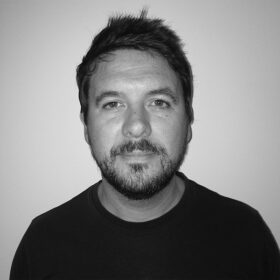
Fassbinder and queer perspectives
Jan Künemund works as a film author and curator in Berlin. In addition to documentary film, queer cinema is a focus of his activities, first practically (press and text work for Edition Salzgeber 2006-15, editor of the magazine “sissy”), then also theoretically (dissertation project and teaching at the Institute for Media, Theater and Popular Culture at the University of Hildesheim 2015-21). This connection led to activities as a film critic (Spiegel.de, Tagesspiegel, Freitag and others), curator (Berlinale Forum since 2019, Duisburger Filmwoche 2019-21) and script editor and author (“Lichtes Meer”, 2015). He recently co-edited the sissy anthology “Queer Cinema Now” (2022), a film series of the same name will take place in July/August at Berlin’s Kino Arsenal, and since 2022 he has been a member of the short film selection committee of the Kassel Documentary and Video Festival.
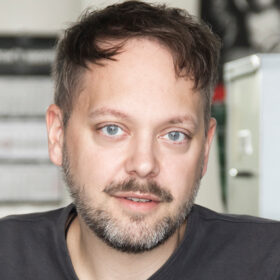
Looking at Fassbinder and the Collection from the Perspective of the Global South
Jyoti Mistry is Professor of Film at the University of Gothenburg and works on film as a form of research and film as a form of artistic practice. Her scholarship analyzes the function and use of archives as an example of rethinking colonial images through decolonized film practices. She is the principal investigator for a BRICS (Brazil, Russia, India, China, South Africa) research project on image practices. For the EYE-Film Museum, Mistry initiated the artistic research project with students* “Places to play. Practice, Research, Pedagogy,” which critically examined colonial-era footage from the Film Museum’s archives. Her artistic work has been shown at festivals in Toronto, Winterthur, Rotterdam and Durban, and in exhibitions at the Kunsthaus Zürich, the Museum der Moderne Salzburg and the Kunsthalle Wien. She was artist in residence at the Dutch Film Academy in Amsterdam and at the California College of the Arts in San Francisco, and was a jury member at the International Short Film Festival of the 68th Berlinale.
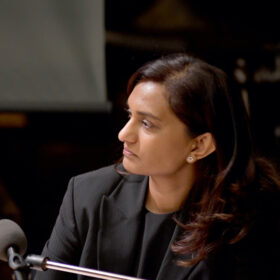
Hans-Peter Reichmann, curatorial director of the DFF Fassbinder Center and former head of collections at the DFF. He studied German, film studies and sociology at the Goethe University in Frankfurt am Main. He has been the initiator, project manager, and curator of numerous exhibitions, as well as the editor of related publications. He has conceived and realized exhibitions on post-war German film, film architecture, film costume, Marlene Dietrich, Curd Jürgens, Maria Schell, Romy Schneider, Sir Ken Adam, Stanley Kubrick, Klaus Kinski and several exhibitions on Rainer Werner Fassbinder, most recently “Rainer Werner Fassbinder’s Method. A Retrospective” in 2021/22 at the Bundeskunsthalle Bonn.
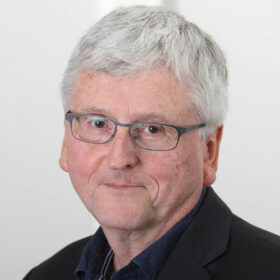
Isabelle Bastian studied film and journalism at the Johannes Gutenberg University in Mainz. She has been working at the DFF – Deutsches Filminstitut & Filmmuseum since 2011. She is responsible for the collections and has co-curated exhibitions on Rainer Werner Fassbinder, Volker Schlöndorff, Charlie Chaplin, Curd Jürgens and Barbara Baum. For the exhibition accompanying publications “Maximilian Schell” (2019) and “Method Rainer Werner Fassbinder. Eine Retrospektive” (2021), as well as publications on modernist and Hollywood cinema.
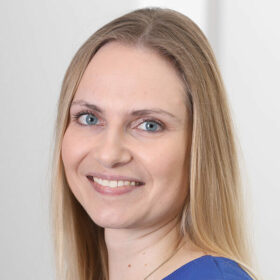
Encounter RWF on the DFF Podcast
Podcast 1: DFF Project “Encounter RWF” – Young People Encounter the Work of Rainer Werner Fassbinder
The project management team Christine Kopf (DFF) and Alejandro Bachmann (Academy of Media Arts Cologne) talk about the mediation projects in Berlin, Frankfurt, Paris, Vienna and Zurich and the challenges of dealing with Fassbinder’s controversial work. (in German)
In cooperation with the Wolf Kino, Berlin, and the Austrian Film Museum, Vienna.
The Fassbinder colelction was acquired in 2018 with the support of the Hessische Kulturstiftung, the Kulturstiftung der Länder, and the City of Frankfurt.
Supported by the Art Mentor Foundation Lucerne, the Kulturfonds Frankfurt RheinMain, and the Rainer Werner Fassbinder Foundation.

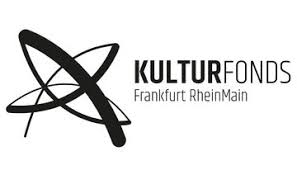

With the kind support of LaCinetek.
